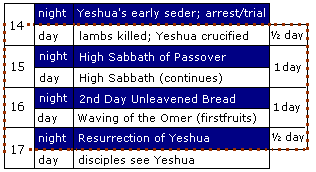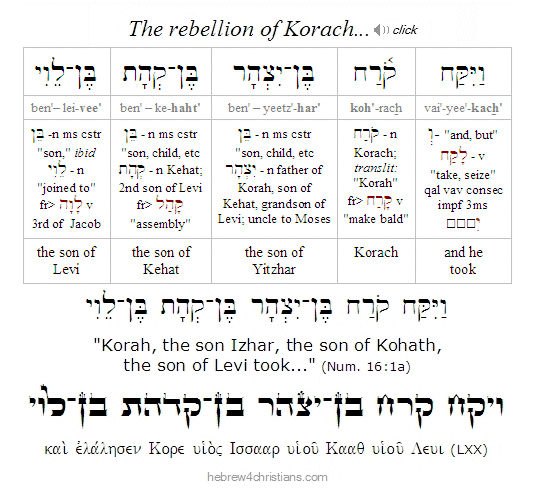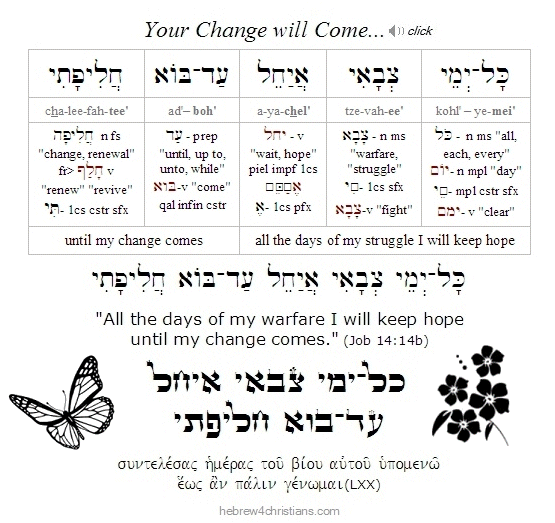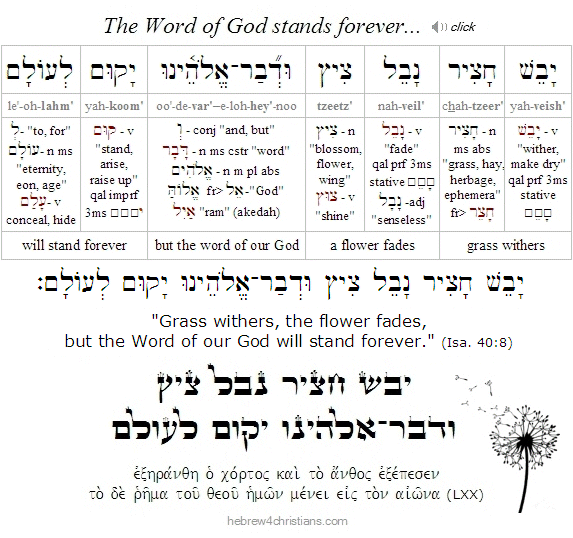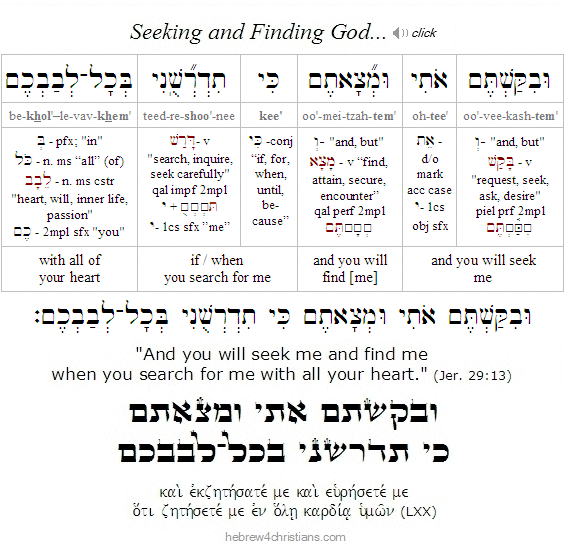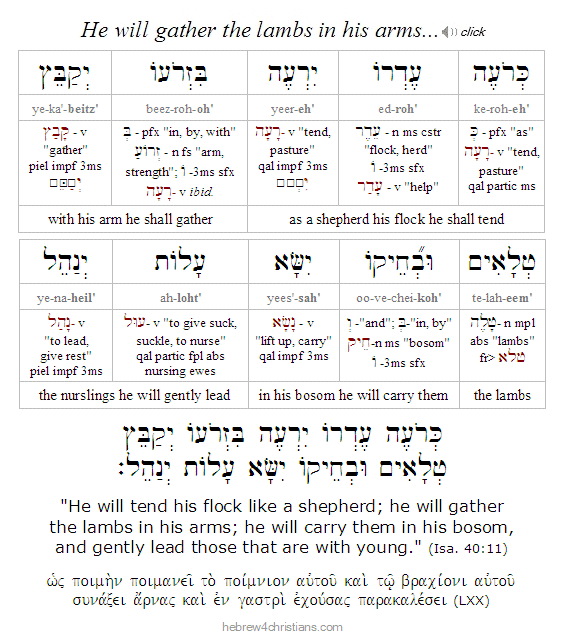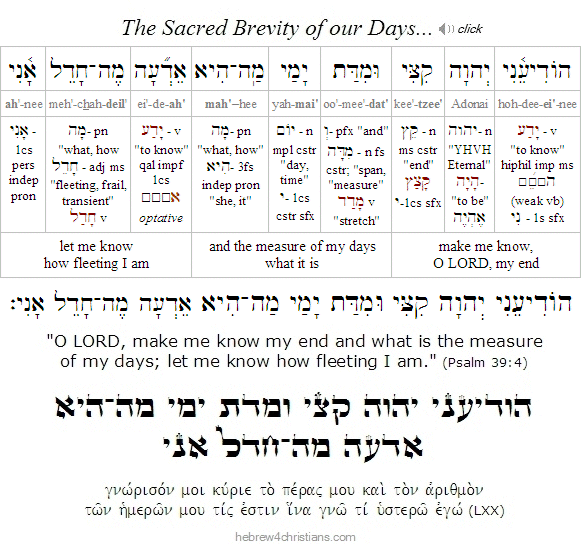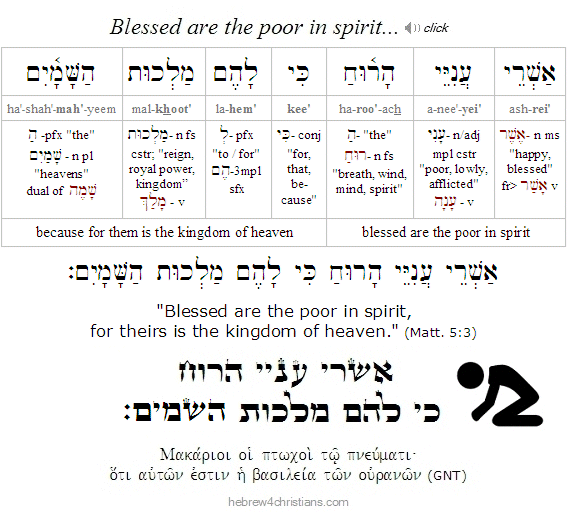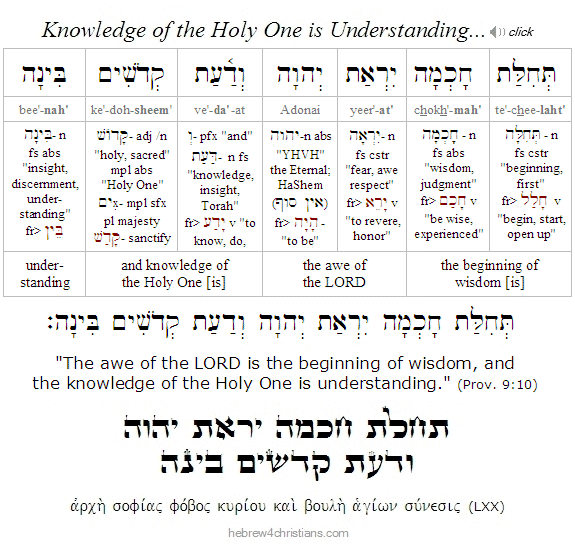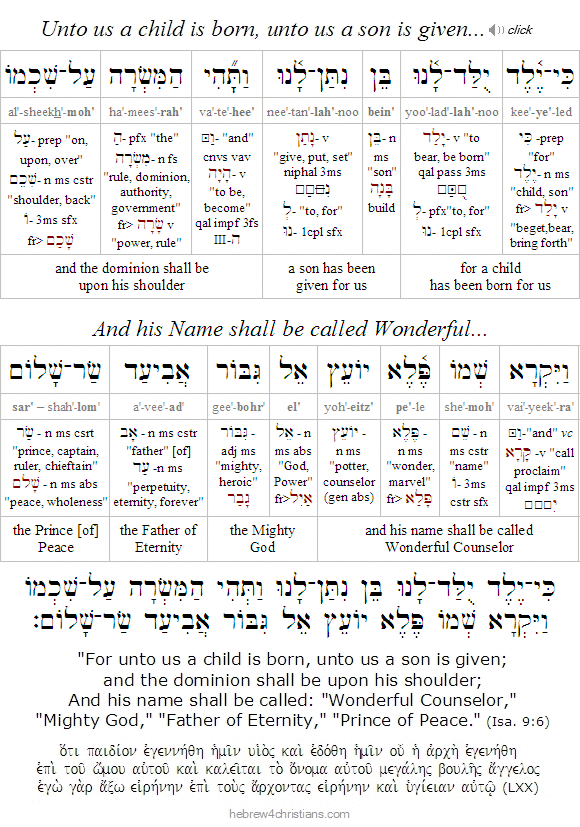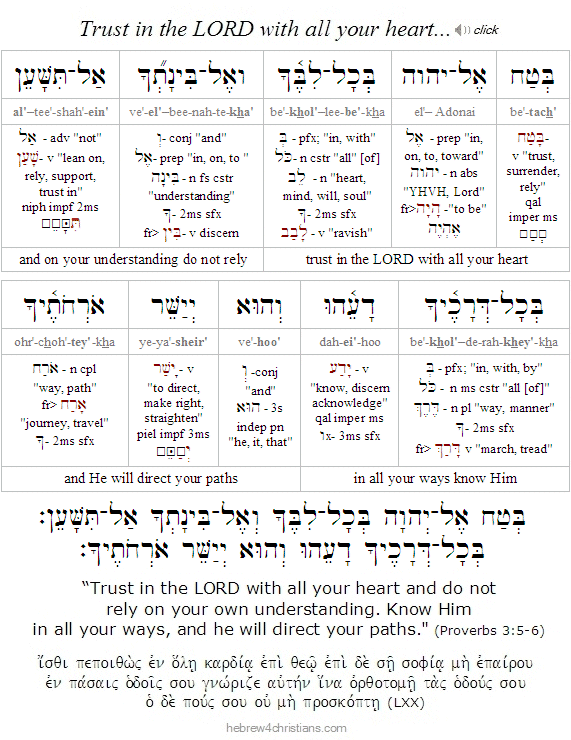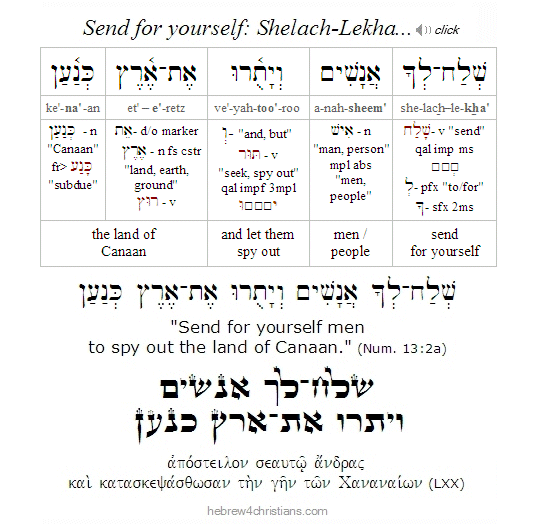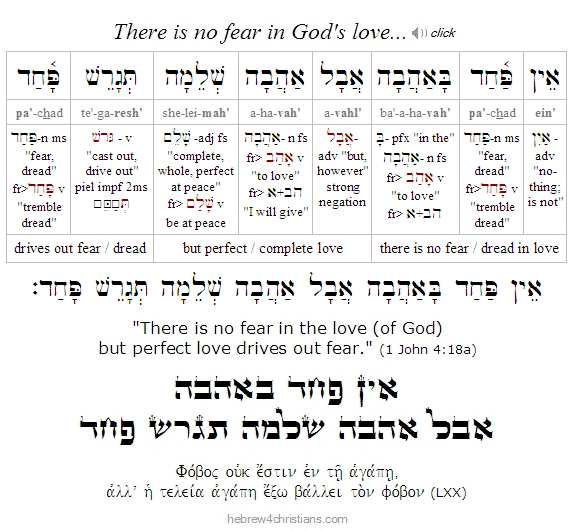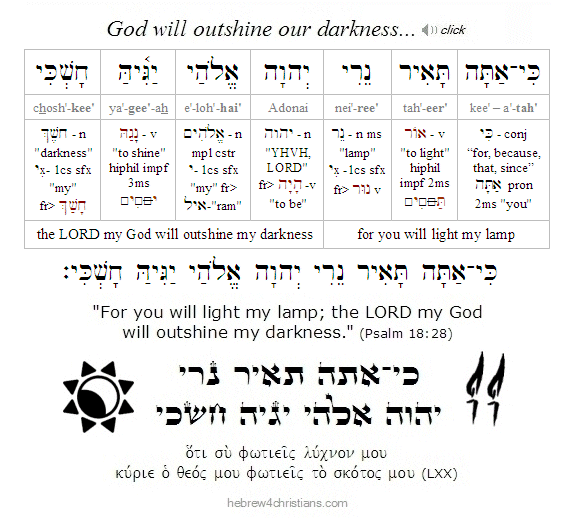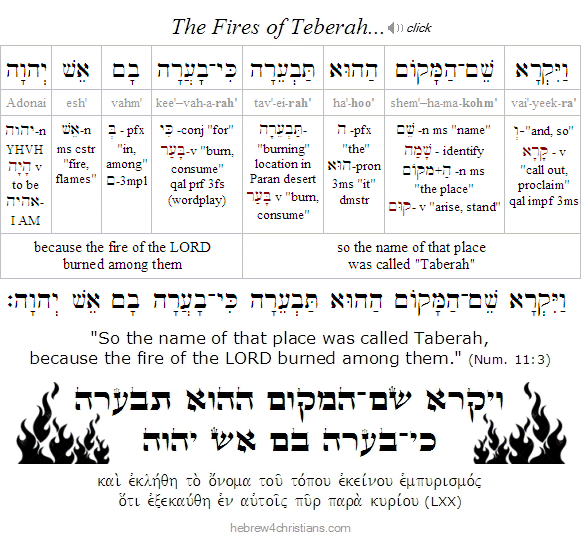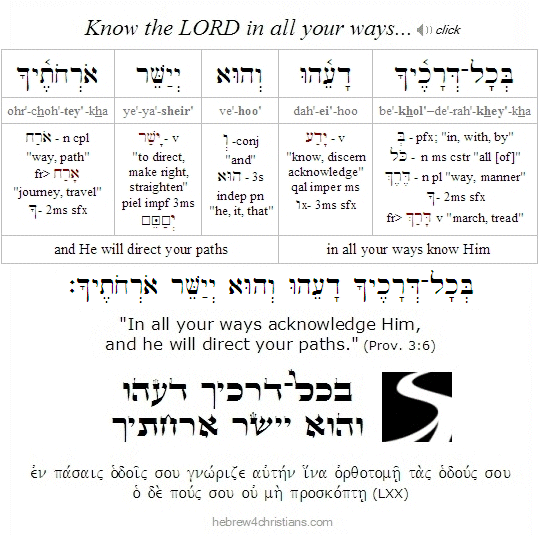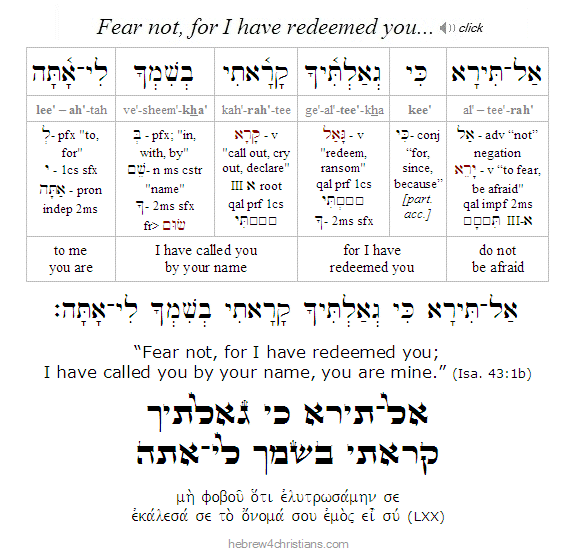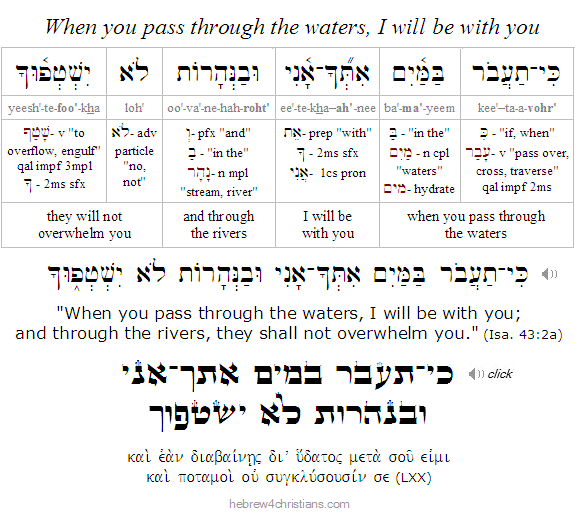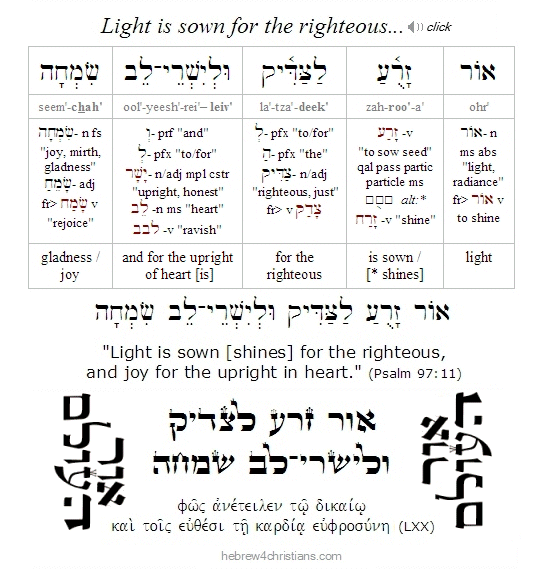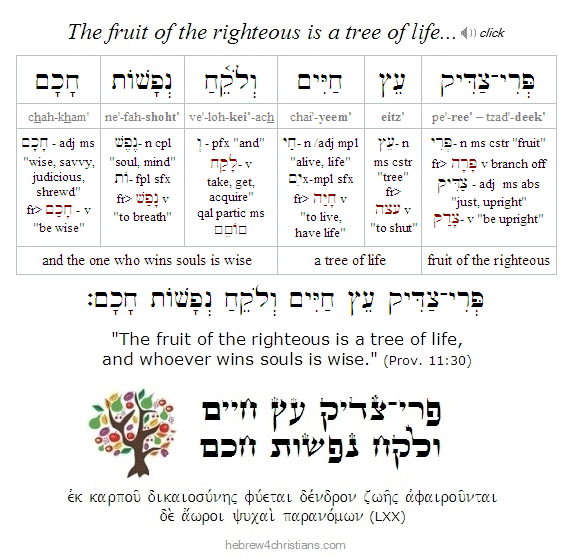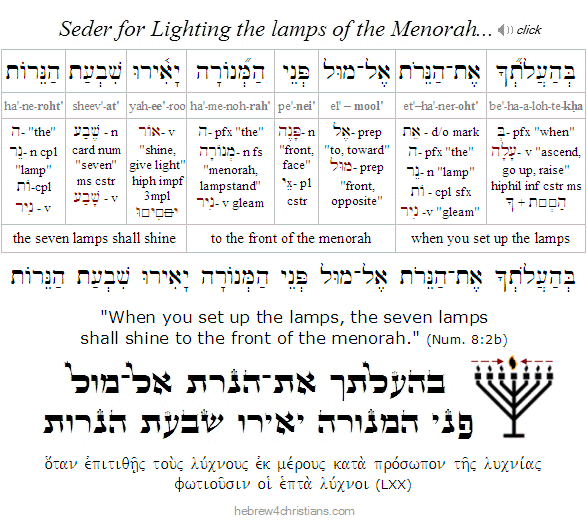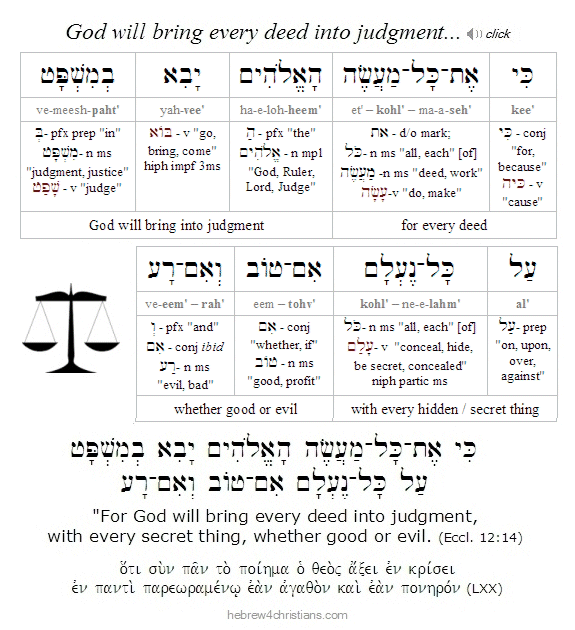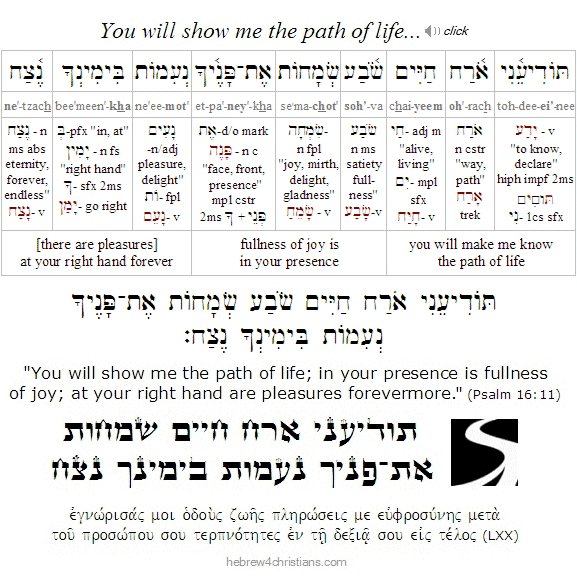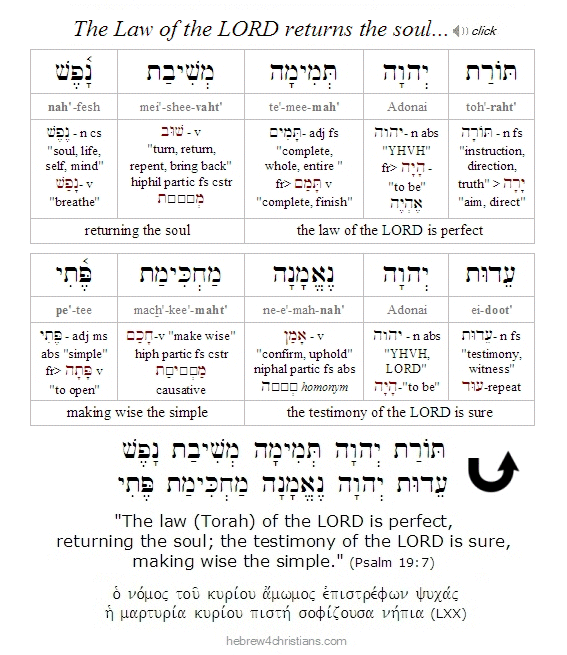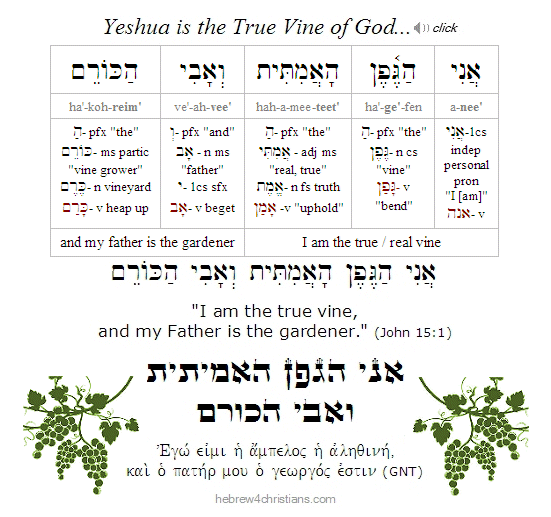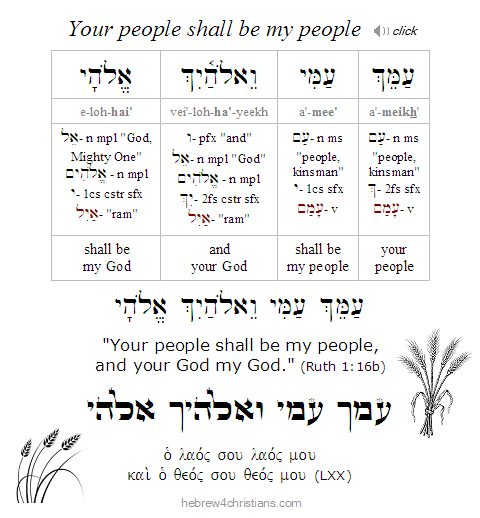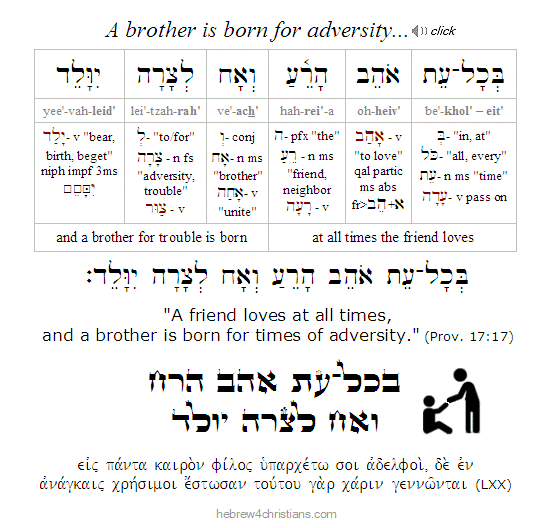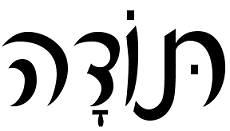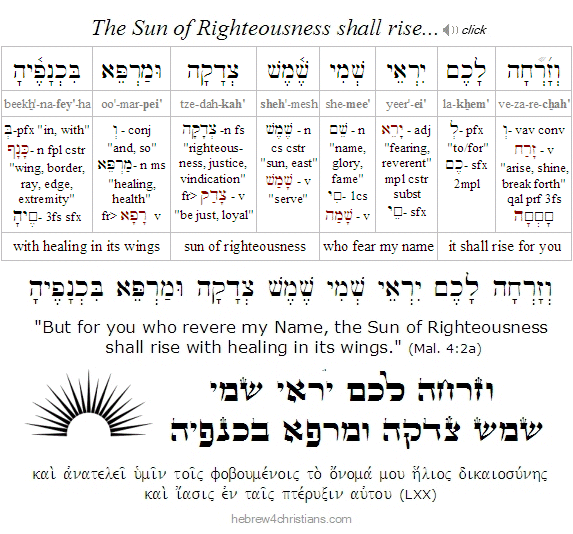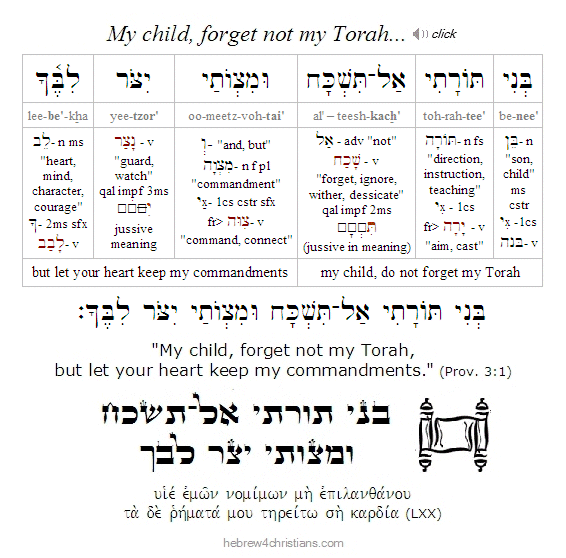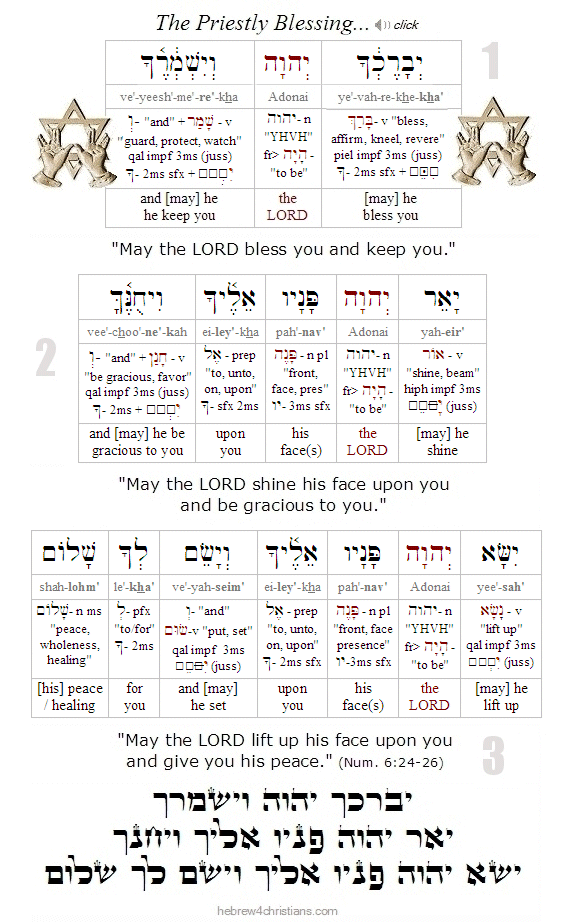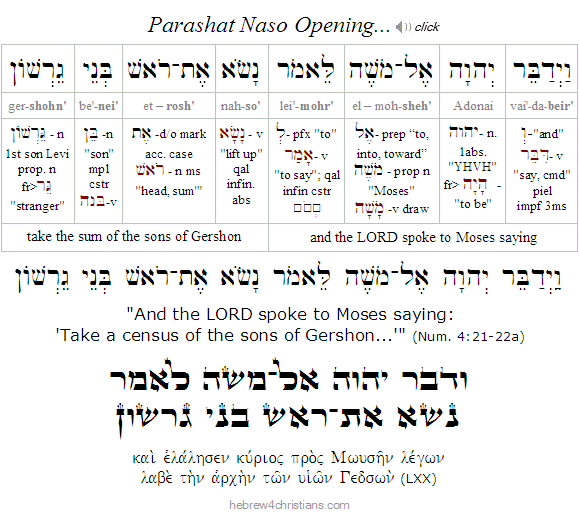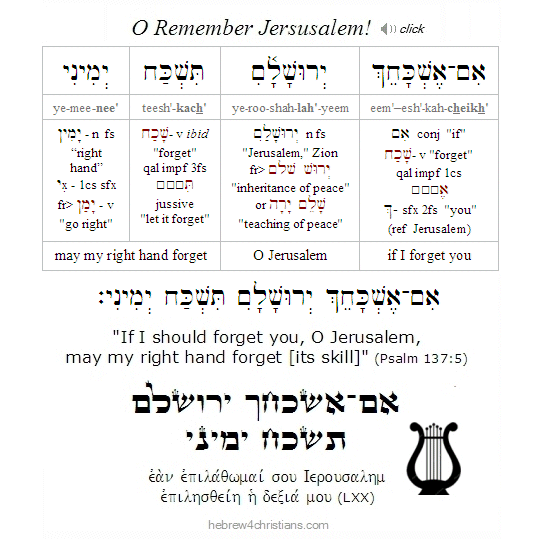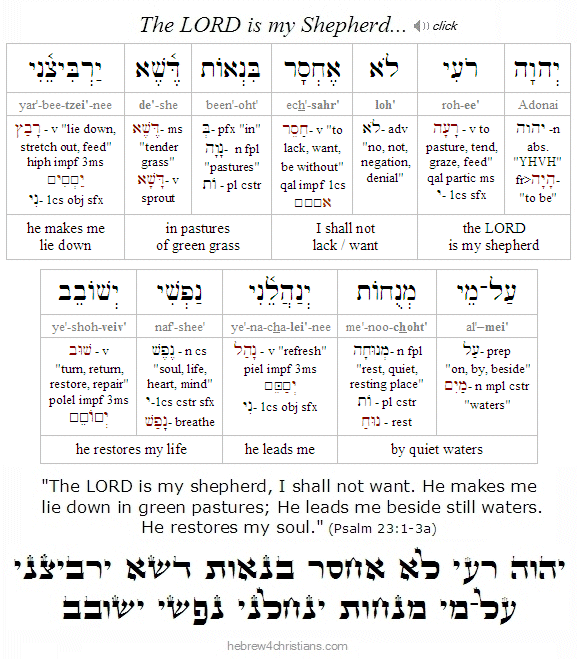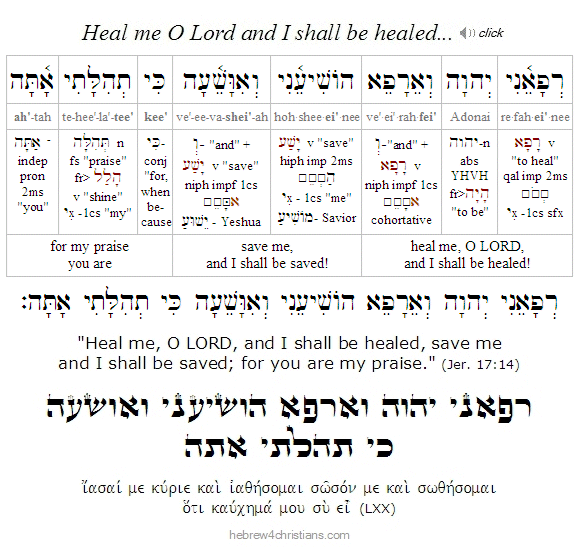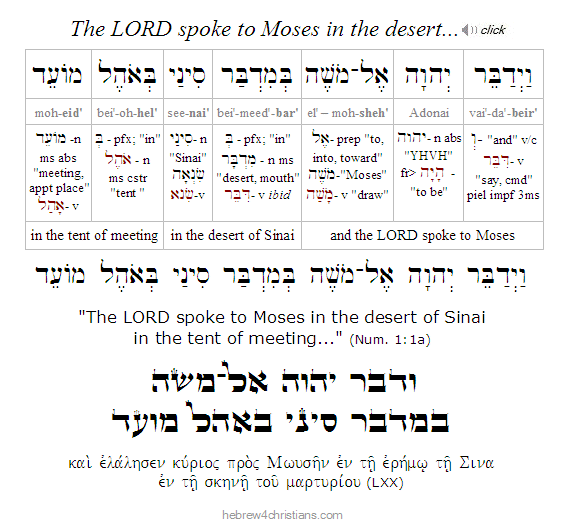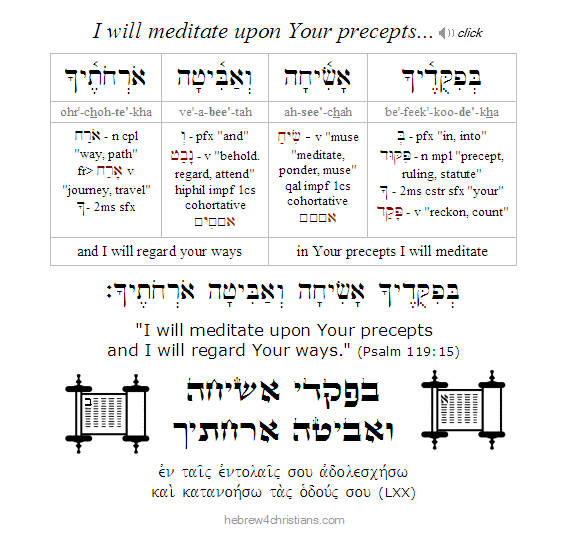|
Jewish Holiday Calendar
For June 2024 site updates, please scroll past this entry....
The Torah divides the calendar into two symmetrical halves: the Spring and the Fall, indicating the two advents of Messiah. The Biblical year officially begins during the month of the Passover from Egypt (called Rosh Chodashim, see Exod. 12:2), and the spring holidays of Passover, Unleavened Bread, and Firstfruits both recall our deliverance from Egypt and also our greater deliverance given by means of the death, burial, and resurrection of the Messiah, the great Passover Lamb of God. The holiday of Shavuot (i.e., "Pentecost") both commemorates the revelation of the Torah at Sinai as well as the revelation of the Ruach HaKodesh (Holy Spirit) at Zion, in fulfillment of the promise given by our Lord....
The intermediate months of summer end with the advent of the sixth month of the calendar, the month of Elul, which recalls the time Moses interceded on behalf of Israel after the sin of the Golden Calf. To commemorate this time of our history, we likewise focus on teshuvah (repentance) in anticipation of Rosh Hashanah and especially in anticipation of Yom Kippur, the great "Day of Atonement." In Jewish tradition the 30 days of Elul are combined with the first ten days of the seventh month (called the "Days of Awe") to set apart "Forty Days of Teshuvah" leading up to the Day of Forgiveness for Israel. Immediately following Yom Kippur, the mood changes as we begin preparing for a joyous week-long celebration called Sukkot (i.e., "Tabernacles") that concludes with the holiday of Simchat Torah.
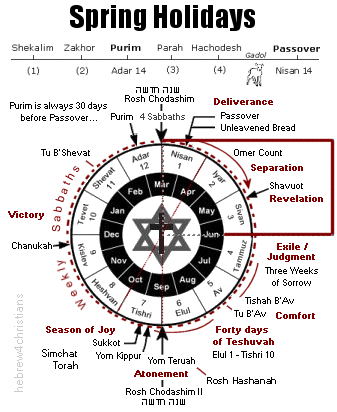 |
The Spring Holidays:
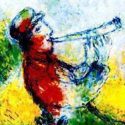
"This month (i.e., the month of Nisan in the spring) shall be for you the beginning of months (i.e., rosh chodashim: רֹאשׁ חֳדָשִׁים). It shall be the first month of the year for you" (Exodus 12:2). When God said Nisan 1 marked the "beginning of the year" (החודש הראשון של השנה), he was saying that all the other holidays were to be understood in relation to it. It is therefore called "Chodesh Ha'yeshuah" (חודש הישועה), the "Month of Salvation."
The Spring holidays (חגי האביב) then provide a portrait of the death, burial, and resurrection of the Messiah: Yeshua was crucified on erev Pesach (during the time of the sacrifice of the Passover lambs), buried during Chag Hamotzi (the festival of Unleavened Bread), and was resurrected from the dead on Yom Habikkurim (the Day of Firstfruits). Fifty days after Passover, on the climactic holiday of Shavuot (i.e., the feast of Pentecost), the Ruach HaKodesh (Holy Spirit) fell on the believers in fulfillment of the promise given by our Lord. Note that the giving of the Holy Spirit occurred precisely according to the calendar countdown given in the Torah (Lev. 23:15-16), and that it occurred after the resurrection of Yeshua -- just as our Messiah foretold (John 16:7; Acts 1:6-8, 2:1-4). This proves that the feasts of the LORD (מוֹעדי יהוה) were not abolished after the crucifixion. The meaning of the gospel is prefigured in the holidays given in Torah. See Luke 24:27, 24:44; John 5:46; Acts 26:22, etc.
![Spring Holiday Timeline (H4C]](../../../../About_HFC/Site_News/Archive-2024/roshchodeshim-line.gif) |
Kindly note that in accordance with both Torah and Jewish tradition, the following holiday dates begin at sundown (ויהי־ערב ויהי־בקר; Gen. 1:5):
- Month of Adar II (Sat. March 9th [eve]) - Mon. April 8th [day])
Dates for Passover Week 2024:
Free Seder Guide
- Month of Nisan (Mon. April 8th [eve] - Tues. May 7th [day])
- Month of Iyyar (Tues. May 7th [eve] - Thurs. June 6th [day])
- Month of Sivan (Thurs. June 6th [eve] - Sun. June 18th [day])
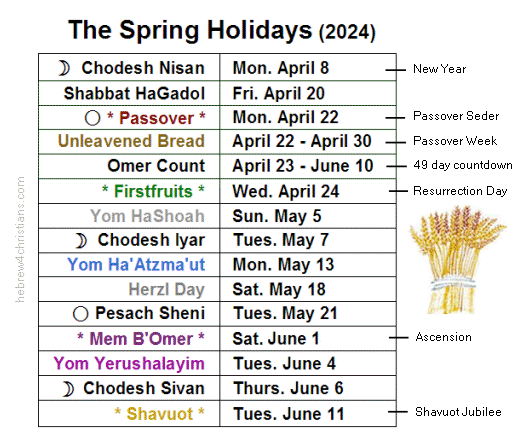 |
Note: For more information, see the Calendar Pages....
June 2024 Updates
Note: If any page content appears to be missing, please refresh the page...
All in the family:
The Rebellion of Korah (פרשת קורח)
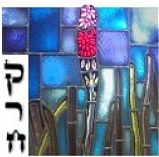
06.30.24 (Sivan 24, 5784) Shavuah Tov, chaverim! Last week's Torah portion (Shelach Lekha) told the tragic story about the "sin of the spies" (חטא המרגלים) and the divine decree that the generation rescued from Egypt was sentenced to die in the exile of the desert. In this week's portion (parashat Korach), the hard truth of their condition began to sink in, and the people bemoaned their fate and rebelled further by attempting to overthrow God's designated leadership and return to Egypt. This rebellion was instigated and organized by Moses' cousin Korach, who – along with a band of co-conspirators – was swiftly judged and put to death, thereby vindicating the Aaronic priesthood and Moses' leadership of Israel.
Korach was the cousin of Moses and a well-respected Kohathite who was honored to be one of the carriers of the Holy Ark (ארון הברית). He was a wealthy man of influence - a nassi (prince) of the people. Despite all this privilege, however, Korach rationalized that he should be the head of the Kohathite clan (instead of his cousin Elzaphan), since he was the firstborn of Kohath's second son, whereas Elzaphan was not even a firstborn son. Indeed, because he felt slighted by Moses' choice, Korach went even further and brazenly questioned whether the office of the High Priest should not have been given to him – rather than to Aaron.
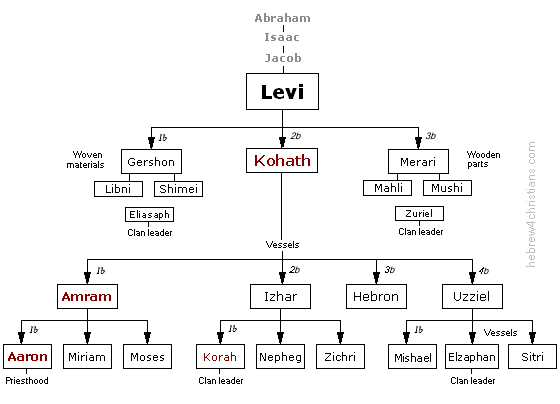 |
Korach's co-conspirators were two brothers named Dathan and Abiram from the tribe of Reuben, Israel's firstborn son. Together, they put together a force of 250 men to confront Moses and to challenge his exclusive claim to leadership: "You have gone too far! For all in the congregation are holy, every one of them, and the LORD is among them. Why then do you exalt yourselves above the assembly of the LORD?" (Num. 16:3).
In response to their challenge, Moses proposed that Korach and his followers bring firepans to offer incense at the Tabernacle to determine whether they were indeed chosen to serve as priests. The following morning, when Korach and his 250 followers assembled at the gate of the Tabernacle to offer incense, God threatened to destroy them all instantly. Moses begged God not to destroy all the people, but only the rebels. He then warned the congregation to stand clear of the dwellings of Korach, Dathan, and Abiram. The earth then opened up and swallowed them alive, and a fire consumed the 250 men who illegitimately offered the incense...
Korach's rebellion introduced outright mutiny and chaos within the leadership of the camp that brought swift and terrible rebuke from the LORD. Nevertheless, the very next day the entire congregation of Israel audaciously began to accuse Moses and Aaron, saying: "You have killed the people of the Lord." When the people looked toward the Tabernacle, however, the Glory of the LORD appeared, where God descended to tell Moses and Aaron that he was going to destroy the Israelites for their treason. Despite Moses and Aaron's fervent intercession, however, a deadly plague broke out among the people. Moses then instructed Aaron to take his firepan with incense and to bring it in the midst of the congregation to make atonement for them. Aaron did so, "and he stood between the dead and the living; and the plague was stayed." The Torah tells us that 14,700 Israelites died because of the plague, not including the deaths of those involved in the rebellion of Korach.
As a final test to vindicate Aaron as God's chosen priest, each of the twelve tribal heads of Israel, as well as Aaron himself, were instructed to bring their staffs to Moses. Moses then inscribed their names on each staff and brought them into the sanctuary before the ark of the testimony. "And the staff of the man whom I choose shall sprout. Thus I will make to cease from me the grumblings of the people of Israel, which they grumble against you." The following day Moses went into the Tabernacle and "behold, the staff of Aaron for the house of Levi had sprouted and put forth buds and produced blossoms, and it bore ripe almonds." He then brought out all the staffs and gave them back to each of the tribal leaders. God then told Moses to return Aaron's staff to the Tabernacle as a testimony for generations to come.
Truth and Seeing...
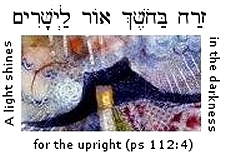
06.28.24 (Sivan 22, 5784) When we "spy" out the land, all we get is a glimpse, not an ongoing vision. How we interpret that glimpse, however, is a spiritual decision. Do we foresee the promised good or does fear distort our vision? Even in the midst of an apparent wasteland, the heart of faith (לב האמונה) finds assurance and consolation, as it is written, "Grass withers, the flower fades, but the Word of our God will stand forever" (Isa. 40:8).
But how are the metaphors that man is "like dried up grass" or a "withered flower" intended to comfort us? Do they not, on the contrary, lead us to regard life as vain and perhaps meaningless? Yes indeed. Our lives are empty and vain apart from God and His truth. If we find ourselves wincing over such images, it is perhaps time to reexamine the state of our faith: To the extent that we regard this world as our "home" we will find the transience of life to be tragic... For those who are seeking a heavenly habitation, the "City of God" and the fulfillment of the promise of Zion, the fleeting nature of this evil world is ultimately a form of consolation.
The optimist believes this is the best of all possible worlds, and the pessimist is afraid the optimist is right.... Is your cup half empty or half full? Note that both the optimist and pessimist look at the very same phenomena, but what it is revealed is judged differently. That's because seeing implies interpretation, filtering, differentiation, and ascribing meaning (or its absence) to what is seen. Of course habit can dull our vision and assumptions can often blind us, and it is not easy to see the "big picture" about how all the parts create the whole, but in general when we "see" something we "make sense" by identifying what it is in relation to other things in our environment.
The Spirit of the LORD says, "Do not turn aside from following the LORD, but serve the LORD with all your heart. And do not turn aside after empty things that cannot profit or deliver, for they are "tohu" - confusion and unreality" (1 Sam. 12:20-21).
The western mind confuses the idea of "fact" with truth. A fact is the disclosure of a correspondence between an idea and reality, but Truth (with a capital "T") encompasses how any given fact is related to the whole. Such Truth is therefore intimately connected with wisdom, and wisdom is first of all about the reverential awe of God (Psalm 110:10). It is not what we see with our eyes that is ultimately real, but what we see with our hearts.
The carnal mind is instinctively afraid of change, since it implies death and dissolution, and therefore it reasons from a continuous state of dread (whether conscious or not). Hence the "besetting sin" of the flesh is to "absolutize" the moment and to otherwise regard the finite as an end in itself. Woody Allen once quipped, "I am not afraid of death, I just don't want to be there when it happens," which is precisely the abhorrence the carnal mind expresses toward the ineluctability of change. Change represents a movement toward an otherwise unavoidable end, and therefore the carnal mind constantly seeks escape from the journey.
God is called our "Rock," a metaphor that implies that He is the immovable foundation and cornerstone of all reality. The LORD is our strong refuge in the stormy changes we all face in this world. His Presence both grounds us and sustains our way. Nonetheless we walk by faith, not by sight, and often the sojourner in this world faces testing and even tribulation. In his despair, Job once asked, "If a man dies, shall he live again? All the days of my warfare I will wait until my change comes" (Job 14:14). We want to be fully clothed with the garments of God's righteousness that are provided to us through faith. Our groaning for complete deliverance from the affect of our sins is further evidence of the inner vision we have been given by the Holy Spirit (Psalm 17:15).
Shabbat Shalom and thank you for remembering me in your prayers, chaverim....
Hebrew Lesson
Job 14:14 reading (click):
Visions of the Far Country...

06.28.24 (Sivan 22, 5784) "Grass withers, the flower fades, but the word of our God will stand forever" (Isa. 40:8). This is a great word of hope. Despite experiencing exile and living in oppression, the Lord speaks words of everlasting consolation: Nachamu, nachamu ammi: "Comfort, comfort my people..." (Isa. 40:1). These were God's words of encouragement to the Jewish exiles that were carried away into Babylonian captivity. Despite the appearance of ruin, God promised to establish Zion as the praise of the earth. There is a glorious future ahead, even if present circumstances seem overwhelming and your heart's cry is stifled.
The LORD God is the only enduring Reality in a constantly changing world, and He has designed it this way to cause our hearts to search for him. "All flesh is grass, and all its beauty is like the flower of the field" -- such is the condition of this ephemeral world with its flux and fortunes. The flesh fades because the breath of the LORD blows upon it (Isa. 40:7). God Himself has ordained human life to be a vapor...
Nonetheless we are told not to fear, because there is good news for Zion: the LORD is coming with might to reward those who are waiting for him. "He will tend his flock like a shepherd; he will gather his lambs and carry them close to his heart" (Isa. 40:11). As the apostle Peter said, this good news is the eternal life given through the imperishable "Seed" - the Word of God that rises forever in Yeshua (1 Pet. 1:23-25).
The nations of this world are reckoned as less than nothing; their glory is "tohu" (תהוּ) - confusion and unreality - and their princes are regarded as utter vanity (Isa. 40:23). "Scarcely are they planted and have taken root when He blows upon them and they wither to become dust carried off by the storming winds" (Isa. 40:24). The nations of the earth are dried grasses; the kings of the earth are withered flowers.
But the LORD God is incomparably great and will faithfully fulfill his promises to Israel: "The word of our God will stand forever." He created the heavens and calls each star by name. He is invincible in power and no one can overrule His will.
This world is not our home; we are "strangers" here. It is an affliction to wait for the LORD, a "homesickness" of heart... The apostle Paul says our loneliness and alienation prepare for us an "eternal weight of glory" beyond all comparison, because we are not looking at what can be seen but at what cannot be seen. "For what can be seen is temporary, but what cannot be seen is eternal" (2 Cor. 4:17-18). Just as the "two-souled" man is unstable in all his ways, so the process of being "educated for eternity" means learning to focus our heart's passion and hope on the glory of heaven. "For where your treasure is, there will your heart be also."
Those who wait for the LORD inwardly groan to be clothed with immortality and eternal life, and their consolation is great indeed. Yeshua is "preparing a place for you," an everlasting place of refuge whose builder and maker is God (Heb. 11:10). Faith sees beyond the shadows of this world to behold your true home with your Heavenly Father. Amen. Believing is seeing, not the other way around. "Keep yourselves in the love of God, waiting for the mercy of our Lord Yeshua the Messiah that leads to eternal life." (Jude 1:21)
Hebrew Lesson
Isaiah 40:8 reading (click):
"Spying Eyes" of the Flesh...

[ "In faith there is enough light for those who want to believe and enough shadows to blind those who don't." - Blaise Pascal ]
06.27.24 (Sivan 21, 5784) Which will you choose to believe - the "spying eyes" of the flesh, or the Word and promise of the LORD God Almighty? The "eyes of the flesh" focus on this world and its possibilities (חַיֵּי שָׁעָה) and are therefore unable to discern beyond mere surface appearances. They are easily seduced by superficialities and glitter of this world and its vanities (עוֹלָם הַשֶּׁקֶר). The eyes of faith, on the other hand, "look not to the things that are seen but to the things that are unseen. For the things that are seen are transient, but the things that are unseen are eternal" (2 Cor. 4:18). Faith sees the realm of the invisible (חַיֵּי עוֹלָם): For we "walk by faith, not by sight." We are "saved by hope," but hope that is seen is not hope (Rom. 8:24-25). Faith is the foundation (ὑπόστασις) of things hoped for, the conviction (ἔλεγχος) of things (πρᾶγμα) not seen" (Heb. 11:1).
It had only been 13 months since the Israelites had witnessed the awesome power of God deliver them from Egypt. Surely the people vividly remembered how God sent ten great plagues upon Egypt, forcing the wicked Pharaoh to finally relent and let them go; surely they recalled how the Sea of Reeds was miraculously split in two as they walked across on dry land. Were they not overjoyed when they sang about how God had decisively vanquished the power of Egypt as the waters returned over the pursuing armies? And when their food ran out, had not God sent them ha-motzi min ha-shamayim - "the bread from heaven"? When there was no water to be found, had not God provided them with "living water"? Did not the Pillar of Cloud and Fire lead them to Sinai, where they felt the tremor of the great revelation from heaven - the fire, earthquakes, and blasts from the heavenly shofar? Did they not hear the very Voice of the LORD speaking to them from the thick darkness? Did not the 70 elders of Israel eat the covenant ratification meal and behold the glory of God? Wasn't it just a few months later, after Moses explained to the people the laws of the Torah and assembled the Tabernacle in their midst, that the people saw the Shekhinah Glory of God descend from the summit of Sinai to dwell over the sanctuary? Did they not fall on their faces as the fire of the LORD consumed the sacrifices on the altar?
And yet, in a sense, these displays of divine power - these "signs and wonders" - were something of a distraction for the eye of faith, since faith does not confuse the means for the end. For example, the manna that fell was meant to keep people alive, but that life was to be lived in trusting relationship with the Living God.
Recall that the Israelites had camped near Mount Sinai for nearly a year before God commanded them to begin their journey through the desert back to the Promised Land. It was at Sinai that Moses had first set up the Mishkan (i.e., Tabernacle), dedicated the priesthood, and taught the people the commandments of the Torah. In the "second year, in the second month, on the 20th day of the month" (i.e., Iyyar 20), the cloud lifted from over the Tabernacle and Moses dispatched the Ark of the Covenant to follow after it into the desert (Num. 10:33-6). Moses then directed the people to set out "by stages" toward the desert of Paran (in the Negev). First the eastern camp led by Judah set out, which was followed by the Levites who moved the Tabernacle. Then the southern camp of Reuben set out, followed by the Kohathites who carried the Tabernacle's sacred furnishings (e.g., the menorah, the altar of incense, etc.). Then the western camp of Ephraim set out, followed by the northern camp of Dan which served as a "rear guard."
In our Torah portion, the Israelites had trekked across the desert of Paran for several days, with their camps ordered in military precision. The Ark of the Covenant was in their midst and the Shekhinah Glory filled the desert skies. Now the people were at Kadesh Barnea (קָדֵשׁ בַּרְנֵעַ), about 11 days out from Sinai and about three days to the Promised Land, at the very edge of the conquest.... Zion was within reach!
But then a dark misgiving arose within the heart of the people... fear ... the old whisper of the enemy was heard in the desert wind: "has God really said...?" (Gen. 3:1). The enemy's voice always solicits and plays on our fears.... Satan is a liar who seeks to take our heart away. He is a bully who first seeks to intimidate us and then attempts to damn us for accepting his lies... Nonetheless, despite his temptation in the wilderness, the people's lack of trust in God's provision is altogether remarkable, and very nearly incomprehensible. The people had seen so much evidence of God's care for them, and yet they seemed to be driven by the vexation of fear. We learn later that it was the people's desire - based on their fear - to send out the spies, and surely not the result of God's command (Deut. 1:21-33). Indeed, shelach lekha (שְׁלַח־לְךָ) means "send for your own sake," that is, send them based on your request - certainly not because I command this thing... Was there a secret wound at work here? Did the people somehow suspect that God's discipline was a sign of His disfavor? Was the old accusation that Moses had led the people into the desert to die still inwardly being harbored (Exod. 14:11-12, cp. Num. 14:3)? Perhaps the idea of being in relationship with a Holy God proved to be more than what was bargained for... Salvation and provision are fine, but the fiery judgments proved there was something far more was required... After all, it is one thing to dabble in religion, but it is quite another to encounter the Reality of the Divine and entirely Holy Presence, and indeed, to become infinitely accountable to Him.
The mistrust of the people reminds us that miracles are always insufficient to sustain our faith. "An evil and adulterous generation seeks for a sign." Seeing isn't believing, but rather the other way around.... Yeshua made this point in His parable of the rich man and Lazarus (Luke 16:19-31). Even if a person should encounter someone literally risen from the dead it wouldn't suffice to impart true faith (Luke 16:31). The great sin that so angered God to say, "I swore in My wrath, They shall not enter into My rest..." was not that of the Golden Calf, as dreadful as that was, but rather the sin of unbelief.... "So we see that they could not enter in because of unbelief. Let us, therefore, fear lest, a promise being left us of entering into His rest, any of you should seem to come short of it" (Heb. 3:7-4:2).
The report given by the spies was a function of their faith: "According to your faith, be it done unto you." "Out of the abundance of the heart, the mouth speaks." Faith sees what is possible and refuses to yield to the artificiality of mere appearance. When Moses told the twelve spies to "Go up into the Negev and go up into the hill country, and see what the land is, and whether the people who dwell in it are strong or weak, whether they are few or many, and whether the land that they dwell in is good or bad" (Num. 13:18-19), he certainly did not need the opinion of the spies regarding the land and its qualities. After all, God Himself had told him the land was very good, a "land flowing with milk and honey." In a sense, Moses - and God through him - was testing the spies, to see if they had faith to see beyond mere appearances. "Even if the land seems bad in your eyes, declare that it is good... Do not rely on your initial impressions, since in order to see the promise, you must look beyond what is immediately visible."
All the spies saw the same physical phenomena: They saw the land "that devours its inhabitants," they beheld the heavy fortifications, they shrank back before the "giants" that dwelled there, and so on. The "majority" view was that the land was unassailable and that danger awaited the people... However, Joshua and Caleb exercised genuine faith and refused to regard themselves as "grasshoppers" before the enemy. Despite seeing the same obstacles, they beheld the future promise of the LORD and understood their stature as God's beloved children... The test of faith turned on the identity of the spies themselves. Were they "grasshoppers" or were they ambassadors of the Living God?
Some of the sages have said that the LORD allowed this shelach lekha - this "test of faith" - in order to judge the perfidy of the Exodus generation. In the aftermath of their failure, the LORD said, "But truly, as I live, and as all the earth shall be filled with the glory of the LORD, none of the men who have seen my glory and my signs that I did in Egypt and in the wilderness, and yet have put me to the test these ten times and have not obeyed my voice, shall see the land that I swore to give to their fathers. And none of those who despised me shall see it" (Num. 14:21-23). The midrash rabbah likens their fate to the story of a royal prince who reached marriageable age. His father then arranged a suitable match and chose a young lady of royal pedigree who was intelligent, beautiful, and charming. The son, however, insisted on first meeting the prospective mate. The father, of course, was deeply hurt by his son's lack of trust in him, and therefore reasoned: "If I refuse to allow them to meet, my son will be convinced that his doubts were justified. I will therefore allow them to meet to vindicate my choice. However, since he didn't trust me, I will not allow him to marry her." When the Israelites of that generation questioned God's word, God allowed them to send spies, to see with their own eyes that the land was good. However, since the people doubted His word, they would not be allowed to inhabit it.
As the Book of Hebrews makes clear, the theme of this week's Torah portion concerns the essential nature of salvation itself, which comes exclusively through trusting in God's love and grace as given in Yeshua - χάριτί ἐστε σεσῳσμένοι διὰ πίστεως (Eph. 2:8). The essence of the Torah has always been: הַצַּדִּיק בֶּאֱמוּנָתוֹ יִחְיֶה / "the righteous shall live by his faith" (Hab. 2:4; Heb. 10:38). Believing in the manifestation of the miraculous is insufficient for faith, and indeed, in the end of the age there will arise one who through lying signs and wonders will induce "strong delusion" to deceive the people of this world (2 Thess. 2:9-12). Regarding the case of the Israelites, what has struck some commentators is not so much the signs and wonders that the LORD performed on their behalf, but rather their persistent inability or unwillingness to believe... After all, truly loving the LORD with all your heart, with all your soul, and with all your strength is a miracle of a greater kind than that of splitting the Sea of Reeds. The heart of faith does not seek the miraculous, but is transformed by God's miraculous power into a testimony of His faithful love.
Hebrew Lesson
Jeremiah 29:13 Hebrew reading (click):
Our Seeking Shepherd...
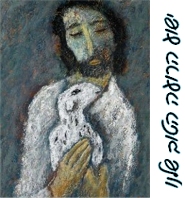
06.27.24 (Sivan 21, 5784) "Those who are well have no need of a physician, but those who are sick" (Matt. 9:12). Even though we are weak, sickly, broken, and sinful people, we must never lose hope and begin to fear that we are worthless in the eyes of heaven... Indeed, our infirmities are often a blessing in disguise, a gift that reveals our need...
If you are sinful and sick, you are invited to come before the Master for life and rescue from the power of sin. Take your place among the lepers, the tax collectors, the outcasts... you will never hear Him criticize you or shame you for sincerely coming to Him for healing of your sinful state... "For the Son of Man came to seek and to save the lost" (Luke 19:10).
Yeshua is the Good Shepherd (הָרעֶה הַטּוֹב) who leaves his "flock of 99" sheep to find the one sheep who is lost (Matt. 18:12-14). He is always like that – He is always seeking and saving the lost sinner; He is always offering life and healing to those who have been made sick with the plague of sin. Thank God we have a Savior who seeks us out in our desperate need!
Hebrew Lesson
Ezekiel 34:16a reading (click):
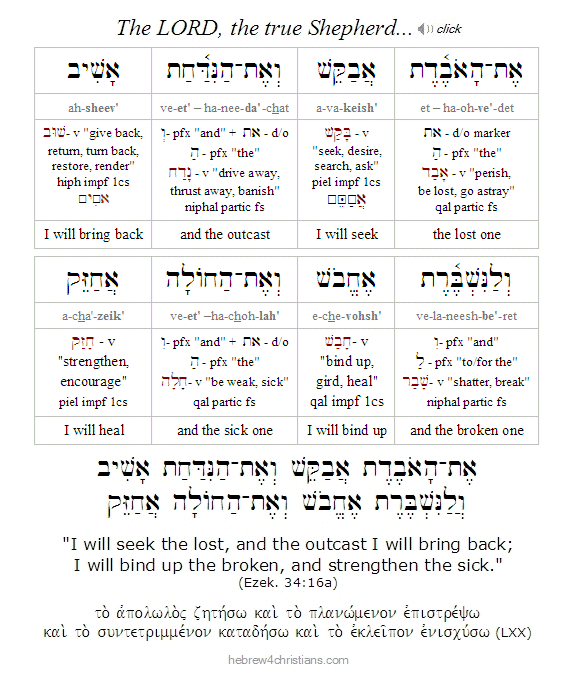 |
King David wrote, "You have given those who fear you a banner (נֵּס לְהִתְנוֹסֵס) for the sake of the truth" (Psalm 60:4), which Rashi interprets as, "You have given hardships and suffering to those who fear you to elevate them in the way." Indeed the word nes (נֵּס) can mean "banner" (as on the mast of a ship), a "sign" (or miracle), or a "test" (nisayon). God tests those who fear Him in order to help them become a miraculous sign to the world at large. Ultimately, the sign or miracle is the gift of Messiah's suffering on our behalf and His resurrection for our justification (Isa. 11:10). Even in the face of our enemies who have breached the land, we have the promise of victory in Adonai Nissi (יְהוָה נִסִּי), God my Miracle.
May you, dear broken and contrite one, hear the word of His hope calling out for your soul... He is your Shepherd, your Healer, and your Miracle. May you come beneath His banner of truth and love to find eternal refuge.... Amen.
Hebrew Lesson
Isa. 40:11 reading (click):
Torah of Death and Life....
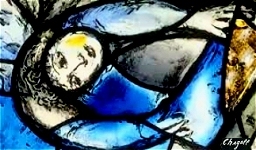
[ "Nothing teaches us about the preciousness of the Creator as much as when we learn the emptiness of everything else." -- Charles H. Spurgeon ]
06.27.24 (Sivan 21, 5784) Why does God want us to face the truth about death? Why does Moses ask God to teach us to "number of our days?" (Psalm 90:12). The reason is that by nature people deny the reality of death - they hide their eyes from it, ignore it, and pretend it's not there - so they can continue to live under the illusion that they are in control of their lives, that they are the center, that they are immortal little "gods." Death threatens the ego and humbles us to confess the truth about life, namely that we are not in control, that we cannot choose to be immortals, that we do not have power to exist in ourselves, and therefore we need life from a different source - spiritual life - wherein we receive a new identity and a new being found in relation to God.
The "natural man" regards death as an offense or as "absurd" because it splits us in two, creating a "divided house" that cannot stand. The ego demands be god-like, important, valued as sacred, etc., yet the prospect of death crushes the aspiration and yields alienation from reality. This creates a painful tension or dualism within the heart where the meaning and purpose of life is lost.... The message of the gospel begins precisely there, however, speaking to broken people who thirst for life but find themselves living on "death row" - people who are humbled and who understand they cannot heal themselves from the "sickness unto death," as Kierkegaard used the term. The remedy is not to deny death or to live as if death is not a genuine horror, but to understand it as our natural estate, brought about by sin that exalts the ego over the God who made us.
"Die before you die; there is no chance after." (C.S. Lewis)
The power of the gospel is to partake in a new source of life and to be healed from the sickness of death by God's miracle in Messiah (2 Cor. 5:17). "Jesus saves" is not a cliché for the faith but confesses the sober truth of reality. It is by our union or identification with Him, by the agency of the Holy Spirit, that we are imparted new existence, true spiritual being, that is not subject to the natural law of sin and death (Col. 3:9-11). Being "in Messiah" means you are "justified," that is, welcomed, affirmed, accepted and declared righteous by God, and that you are set free from the condition of "being unto death." You partake and share in the life (relationship) of God based on his redeeming love: you are "adopted" by God, made a member of his "household," and attain the inheritance of which is eternal life. Consequently you cry out "Abba, Father" to God who watches over you and leads you through the days of your sojourn here on earth (Rom. 3:32). Despite walking through the shadowy byways and tribulations of this world, you refuse to let death define you or be the last word: you trust that your Father is with you, working all things for your ultimate good (Rom. 8:28). You know who you are, where you are going, and what your end is because of Yeshua our Lord.
Facing death is essential because the message of the gospel must be grounded and framed in the language of our wretched desperation as lost souls in this world (Rom. 7:24). Death is the central problem of existence, and death is therefore the "propaedeutic" that leads us to the salvation found in Yeshua the Messiah... When we confront the truth of our condition, there is real hope for healing. As C.S. Lewis once said, "Die before you die; there is no chance after."
Hebrew Lesson
Psalm 39:4 reading (click for audio):
Blessed Inner Poverty...
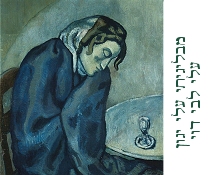
06.26.24 (Sivan 20, 5784) The word ashrei (אַשְׁרֵי) in Hebrew can mean "the happy ones," from the adjective osher (אוֹשֶׁר), "happy," and the root word ashar (אָשַׁר) meaning to "go straight" or to walk uprightly (i.e., yashar: יָשָׁר). Ashrei can also mean "enriched," or favored. Enriched is the man (אַשְׁרֵי־הָאִישׁ) who ... delights in the Torah..." (Psalm 1:1-2). The sages note that ashar is formed from aleph (א), representing the One true God, and sar (שַׂר), meaning ruler, which suggests that when the LORD is the Ruler of your life, you will be enriched and find genuine happiness. Indeed, the word ashrei is embedded in both the first and last words of the Torah scroll itself (i.e., bereshit (בְּרֵאשִׁית) and Yisrael (יִשְׂרָאֵל)), which hints that we are made happy when we submit to God's will (i.e., his Torah) for our lives...
The Torah of the LORD is most clearly manifested in Yeshua, the Living Torah and Messiah of God, the Wisdom of God: "And he opened his mouth and taught them, saying: 'Blessed (ashrei) are the poor in spirit, for theirs is the kingdom of heaven'" (Matt. 5:2-3). Paradoxically we are profoundly enriched by understanding our great inner poverty and our ongoing need for divine intervention... Only when we come to the end of ourselves, when we realize our powerlessness and radical insufficiency, can we come to know Yeshua as moshia (מוֹשִׁיעַ), as our Savior. And this is an ongoing state of dependency: we walk "with a limp" as did Israel. Therefore Paul said, ὅταν γὰρ ἀσθενῶ, τότε δυνατός εἰμι: "for when I am weak, then I am strong." You are made rich indeed when you encounter your spiritual bankruptcy, brokenness, and must entirely depend on God for your daily miracle...
Hebrew Lesson
Matthew 5:3 reading (click);
Spirituality often enough involves a sense of irremediable brokenness, a feeling that you are not whole, that you are a mess, and that your need for God's healing is constant and relentless... Contrary to the ideals of proud humanism, spirituality is a state of "blessed neediness," of being "poor in spirit," that aches with inner desperation for God's power of healing. Those who humbly cry out to the LORD understand their great need for deliverance, "Woe is me, for I am ruined..." (Isa. 6:5). As Yeshua said, "Everyone who exalts himself will be humbled, but the one who humbles himself will be exalted" (Luke 18:14).
Our Lord Yeshua testified: "The Son of Man came to seek and to save the lost" (Luke 19:10), and therefore He is found in the midst of the leper colonies of the hurting, the forgotten, and the rejected. As the "Man of Sorrows" (i.e., ish makhovot: אִישׁ מַכְאבוֹת) he understands the language of our pain (Isa. 53:3).
Seeing Life Rightly...
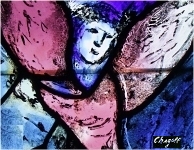
06.26.24 (Sivan 20, 5784) The Hebrew word for "seeing" (ra'ah) is related to the word for "fear" (yirah), suggesting that when we really see life as it is, we will be filled with wonder and awe over the glory of it all. Every bush will be aflame with the Presence of God and the ground we walk upon shall suddenly be perceived as holy (Exod. 3:2-5). Nothing will seem small, trivial, or insignificant.
It is in this sense that we are to serve the LORD with "fear and trembling" (φόβοv καὶ τρόμοv), that is, with an inner awareness of the sanctity and sacredness of life itself (Phil. 2:12-13). Da lifnei mi atah omed. Sin puts us to sleep, numbs our minds and hearts, and blinds us to the radiance of divine revelation. When we see life as it is, with the "eyes of the heart" (Eph. 1:18), we will be filled with wonder and awe over the glory of it all. "Fearing" (יִרְאָה) and "seeing" (רָאָה) will be unified within our hearts... and we will be wise (Prov. 9:10).
Joshua and Yeshua...
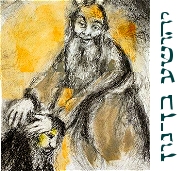
06.25.24 (Sivan 19, 5784) In our Torah reading for this week, parashat Shelach-lekha, we read that before he sent out the leaders of the tribes to spy out the land of Canaan, Moses renamed his trusted servant Hoshea (הוֹשֵׁעַ) to Yehoshua (יְהוֹשֻׁעַ), appending the letter Yod (י) to make his name begin with a divine prefixive (יָהּ־). The Talmud (Sotah 34b) states that Moses did this because he foresaw the treachery and faithlessness of the spies and he therefore appended the Yod to remind Hoshea that YHVH (יהוה) must come first. This renaming of Hoshea, however, was certainly prophetic, since Joshua was chosen to be the successor of Moses who would finally lead the people into the promised land. Notice that the name Yehoshua (i.e., Joshua) and Yeshua (i.e., Jesus) come from the same root (i.e., yasha: ישׁע) meaning "salvation" or deliverance (in the Greek LXX, Joshua is spelled Ιησους, the same spelling for Jesus in the New Testament). Indeed, in the Book of Nehemiah, Yehoshua is explicitly called Yeshua (יֵשׁוּעַ), the name often transliterated as "Jesus" (Neh. 8:17).
There are a number of similarities between Joshua and Jesus given in the Torah. For example, Joshua was a descendant of Joseph from Ephraim (lit., "double fruit"), and Yeshua came as Messiah ben Yosef, the "son of Joseph" who would come from Bethlehem of Ephrata (אֶפְרָתָה), a term that also means "fruitfulness." Joshua was Moses' faithful companion at Sinai (Exod. 24:13) and overseer of the "Tent of Meeting" (אהל מועד), taking every opportunity to be near God's presence (Exod. 33:11). He was a capable commander of the armies of Israel who regularly routed the enemy in battle (Exod. 17:9, etc.). Joshua was truly humble and of impeccable moral character, a true servant of Israel filled with Holy Spirit of God (Num. 27:18). Therefore both Joshua and Yeshua loved God's house (Exod. 33:11; Luke 2:49), both were faithful leaders of Israel (Deut. 1:37-38; Matt. 2:6); and both were directly ordained by God. Moreover, Joshua was tested and found steadfast in his faith (Num. 32:12); he was willing to be "despised and rejected of men" rather than appease the mob, just as was Yeshua. Both Joshua and Yeshua appointed 12 men (Josh. 4:4; Mark 3:16-19); both led the people of God to the Promised Land and engaged in warfare for the Kingdom of Heaven; both performed various miracles; both allotted the inheritance of the LORD to God's people (Deut. 1:38, 3:28), both circumcised the people (Joshua at Gilgal; Yeshua in the Spirit); both married Gentile brides (Joshua is said to have married Rahab, Yeshua married the faithful of the nations), both signified salvation by means of the "scarlet cord," and so on. Moses was the "lawgiver" of Israel who was unable to give rest (salvation) to Israel; that honor was given to Joshua, who brought the people into the promised land after Moses had died on Mount Nebo (Rom. 7:1-4).
Joshua's full name was "Joshua the son of Nun" (יְהוֹשֻׁעַ בִּן־נוּן). The Talmud notes that the word Nun (נוּן) means "fish," a symbol of activity and life. The first mention of the word is found in Exodus 33:11 in reference to Yehoshua. One application here is to note that Yehoshua, the one who succeeded Moses and was able to enter the Promised Land, was the "Son of Life" - a clear picture of Yeshua our Messiah, blessed be He...
A midrash says that when Yehoshua was born, no one took note, but when he died, all of Israel took note. Nonetheless, the Israelites did not mourn for him properly. One was busy with his vineyard, the other with his field, yet another with his coal. "The Holy One, Blessed be He, therefore sought to make the whole world quake" (Midrash Shmuel 23:7). This is also an apt description of Yeshua as Mashiach ben Yosef, the Suffering Servant, whose birth went unnoticed, but His death and resurrection indeed shook the world!
Hebrew Lesson
Isaiah 9:6 reading (click):
Small in our Eyes...

06.24.24 (Sivan 18, 5784) Our Torah portion this week (Shelach Lekha) is a "heavy one" since it focuses on the Sin of the Spies and the subsequent failure of the people to believe that God would care for them. The people's lack of bittachon in God is the most serious sin recorded in all the Torah, even more serious than the sin of the Golden Calf. This is confirmed by the testimony of the New Testament, which presents the fate of the Exodus generation as the dire warning of apostasy for those who claim to follow the Messiah (Heb. 3:7-4:2).
In order to trust God you must believe that you are valuable to Him and that He genuinely desires a relationship with you. God redeemed you so you could know and love Him. In this connection it is important to notice that the spies said, "we were in our eyes like grasshoppers" (Num. 13:33). They felt small because they had forgotten the reason for their redemption - they had forgotten their identity as God's sons. Their lack of self-respect made them feel unworthy of the inheritance. The sin of the spies was not just that they doubted they could overcome the "giants in the land," but rather that they were worthy people in God's eyes... Sadly the spies view of themselves was more real to them than God's view of them, and that is why they added, "and so we were (like grasshoppers) in their eyes." From a spiritual point of view, this was profoundly tragic...
One lesson we can learn from the unbelief of the spies is that we must be careful to esteem ourselves properly. We are created b'tzelem Elohim (in the image of God), and that is the starting point for everything else revealed in the Torah. This foundational idea may be expressed as "respect precedes Torah." Self-esteem and self-worth are very important characteristics because they enable the soul to receive the Word of God. This isn't a selfish, narcissistic type of love, of course. If you have no self-worth, then it is likely you will believe the promises of Scripture are for other people, but not for you. You will regard yourself as an "outsider" or "alien" who is without promise of inheritance. So we have to begin there, with the fact that God created you in His image and therefore you are of infinite value. You matter to God - and therefore you must respect yourself.
It is no mark of holiness to shame or belittle yourself - notwithstanding your sinful nature - since you have a duty to honor yourself as one of God's created children. Dishonoring yourself violates the central ethical commandment of the Torah: "You shall love your neighbor as yourself" (Lev. 19:18). How can you respect others if you don't respect yourself? You will regard yourself as "insect like" and will tend to view others as "gigantic" threats; you will act defensively and walk in fear of other people.... This is the path of a person living in a prison of fear, and it is a type of living hell. Trusting in God's personal love for you presupposes that you are worthy to be loved and that there is a divine inheritance for you. This gives you the courage required to go and take possession of the land as its rightful heir. Trusting in God means regarding God's view of you as more real than your own. It means allowing yourself to be elevated to honor so that you can be in a genuine love relationship with your Heavenly Father. "From now on, therefore, we regard no one (including ourselves) according to the flesh..." (2 Cor. 5:16).
We "walk by faith, not by sight," which means we must take hold of the promise of God, even in a world that "devours its inhabitants" and that is filled of seemingly invincible giants... Faith believes the possible, even in moments of testing and struggle. As Yeshua said, "All things are possible for the one who believes" (Mark 9:23).
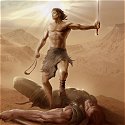
"Lord, I believe: help thou my unbelief!" (Mark 9:24). "God is able to make all grace overflow to you, so that having all sufficiency in all things at all times, you may overflow in every good work" (2 Cor. 9:8). May it please God our Heavenly Father to help us esteem ourselves properly so that we can receive, abide in, and walk in the reality and presence of His overflowing love. And may the LORD keep us all from the terrible sin of unbelief by always remembering that we infinitely matter to Him. Amen.
Hebrew Lesson
Proverbs 3:5-6 Hebrew reading (click):
Related Audio Podcasts:
Overcoming Anxiety...
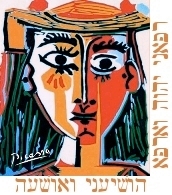
06.24.24 (Sivan 18, 5784) Why do we often feel anxious? Why are we filled with unease and worry about what might happen to us? Is it not because everything seems out of our control? The world around us seems threatening and unstable; our interpersonal relationships are fragile and vulnerable; our bodies are sick and faltering; we grow despondent, lonely, and grieved. Time relentlessly passes and dissolution seems omnipresent; we feel distressed, swallowed up, overwhelmed, and powerless: the smoke and ashes from our depths....
Now while it is true that everything is out of our control, it is not true we are utterly alone, the victims of unhappy chance and sorrowful fortune, for we find life in relationship with a loving God who has repeatedly told us that he is with us always, through all the byways and valleys, and that he will never leave nor forsake us. The Lord has promised to shepherd us through the present darkness; he is the ground of our being, the place of our refuge.
We do not deny reality or pretend that we are not in struggle between hope and despair. But while it is true that we are in a world that is frightening and uncertain, we are given strength by God to walk in shalom here, to bear witness of his radiant light. We are "in" but not "of" the world -- a realm that God has subjected to vanity in order to redeem it to a heavenly and eternal hope (Rom. 8:20). You are not alone, friend; you are part of God's blessing. The Lord is with you and he provides you sure refuge and abiding comfort in the midst of the storm. God is always between you and your wounds...
Just as humanity was plunged into darkness through unbelief, so we are brought to the light through faith in God's deliverance. Therefore hold fast to hope, and keep the fire of your heart burning, friend... Rabbi Nachman once told a person who was struggling with his faith: "It is written that all creation was brought into being because of people like you. God saw there would be people who would cling to our holy faith, suffering greatly because confusion and doubt would plague them. God perceived that such would overcome these doubts and troubles of heart and remain strong in their belief. It was because of this that God brought forth all creation." Amen. Repudiate anxiety and never yield to despair, since that leads to further darkness and fear. "Do not be anxious (i.e., inwardly divided, two-hearted) over anything, but in every thing by prayer bring your needs before God with gratitude, and the peace of God that surpasses all understanding (שלום אלוהים העולה על ההבנה) will guard your hearts and minds in Yeshua the Messiah (Phil. 4:6-7).
Press on and keep fighting the "good fight" of faith (1 Tim. 6:12). When the aapostle Peter lost courage at the sight of the swelling waves, Yeshua reached out his hand and took hold of him, saying, "O you of little faith, why did you doubt (lit., think twice)?" Remember that you infinitely matter to heaven; your life has great value; you are significant and you are truly loved by our Heavenly Father. "The LORD your God goes with you to fight on your behalf against your enemies to give you victory" (Deut. 20:4).
We are not alone; God will help us get through... "I am sure of this, that he who began a good work in you will bring it to completion (ἐπιτελέω) at the Day of Yeshua the Messiah" (Phil 1:6). The LORD is able to guard you (φυλάξαι) from stumbling and to present you blameless before the presence of His glory with great joy (Jude 1:24). "The LORD upholds all who are falling and raises up all who are bowed down" (Psalm 145:14). "He will sustain you to the end, guiltless in the Day of our Yeshua the Messiah" (1 Cor. 1:8). He who calls you is forever faithful; He will surely do it (1 Thess. 5:24). Yea, "the Lord is faithful (נֶאֱמָן הוּא): He will establish you and guard you against the evil one" (2 Thess. 3:3). The Spirit of the Lord says, "Fear not, for I AM with you always." Amen and amen.
Hebrew Lesson
Isaiah 41:13 reading (click):
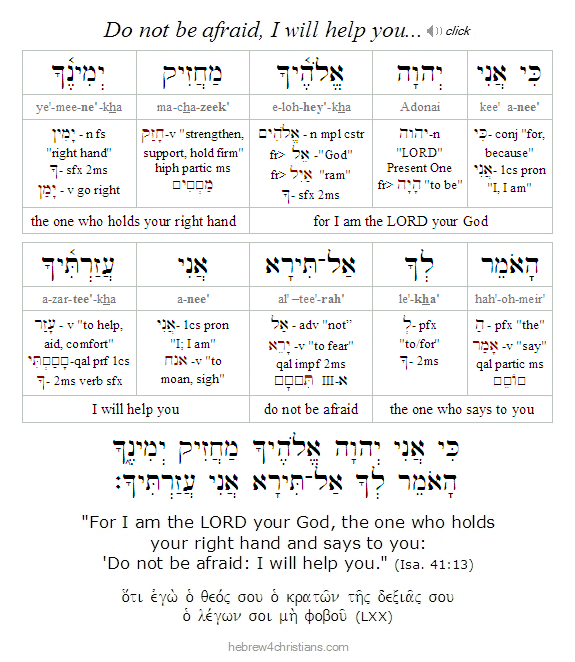 |
Parashat Shelech-Lekha...
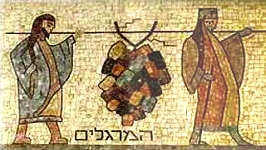
06.23.24 (Sivan 17, 5784) Shavuah Tov, friends. Our Torah reading for this week, Shelach Lekha (שלח־לך), recounts how Moses sent twelve spies from the desert region of Kadesh (קָדֵשׁ) into the land of Canaan to search it out and give a report of its condition. The spies returned 40 days later extolling the land, saying that was indeed fruitful and zevat chalav u'devash (זבת חלב ודבשׁ), "flowing with milk and honey." However, ten of the spies also gave a discouraging report, expressing their fear that the people could not conquer the land. Only Joshua (יהושע) and Caleb (כלב) kept faith in God's promise....
Upon hearing the report of the ten spies, however, the people rebelled and cried out to return to Egypt. Angered by their lack of faith, God sought to destroy the people, but Moses interceded on their behalf. The LORD then decreed to lengthen the Israelites' wandering in the desert to 40 years -- one year for each day the spies were in the land -- until all of the faithless over the age of 20 would die in the desert, except for Joshua and Caleb, the two spies who kept faith with the LORD. After hearing the judgment of God, a group of remorseful Israelites decided to "repent" by taking matters into their own hands. Without either the "Ark of the Covenant of the LORD" or Moses' leadership, they presumptuously decided to storm a mountain on the border of land but were decisively routed by the Amalekites and Canaanites.
If last week's Torah might be called "sefer kvetch" (the book of complaint), this week's Torah reveals the fateful outcome... The people's lapse of faith in God's power serves as a profound and very sober warning, and indeed is a primary warning regarding the dreadful sin of unbelief in the New Testament (see Heb. 3:7-4:11). Indeed, Jewish tradition states that the decree that "none of the men who had seen my glorious Presence and my signs I performed in Egypt and in the desert will see the land that I swore to give to their fathers" (Num. 14:22-23) was given on the Ninth of Av (i.e., Tishah B'Av), which was prophetic of the destruction of the Temple and the worldwide exile of the people from the Promised Land. The sin of unbelief may rightly be regarded as the "unpardonable sin" of the Torah (as well as the New Testament).
The tragedy of the sin at Kadesh ultimately has a happy resolution, however, since the LORD is never thwarted by man's sin and weaknesses. After the 38 years of exile were complete, Moses' faithful successor Joshua sent a second spying expedition to the promised land, though this time God led the spies to a prostitute named Rahab (רחב), a direct ancestor of Yeshua the Messiah, who later identified her faith in the LORD's victory by displaying the scarlet cord (i.e., chut ha'sheni: חוט השׁני) during the fall of Jericho (Joshua 2). Rahab was the (grand)mother of Boaz, who later married Ruth, the great grandmother of King David. May God likewise give us courage to walk in the power of His promises, even if our present circumstances seem daunting. May the LORD clothe each of us with the "spirit of David" to stand before all the giants of the land who defy the LORD and His power.
Choosing to Believe the Good
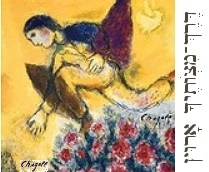
06.21.24 (Sivan 15, 5784) "And now abide faith, hope, love: these three" (1 Cor. 13:13). The opposite of faith is fear; of hope, despair; and of love, indifference. Fear is the "default mode" of the soul that dwells in darkness. This is because the "fallen" soul regards the empirical world and its flux as ultimately real -- and therefore "sees in order to believe." The life of faith, on the other hand, looks beyond the realm of transient appearance to behold an abiding glory -- and therefore "believes in order to see." How we choose to see is ultimately a spiritual decision for which we are each responsible....
In the geo-political world there are more seemingly good reasons to be afraid today than in any time since the rise of Nazi Germany in the 1930s. Every day the media indoctrinates people about the threats of various plagues (e.g., H5N1, H1N1, SARS, Covid), of economic disasters, of terrorist plots, and so on. In short, living within a "culture of fear" (with its ongoing propaganda campaigns from both the right and left wing perspectives) is to traffic in images and sound bites, inducing a sense of dread and anxiety (as someone once said, "FEAR" is "False Education Appearing Real"). Just as a lie-detector can physiologically sense when people are telling lies, so our souls can sense when we are believing them... There is no neutral ground here, no "transcendent" place of the soul where we can rise above the realm of truth claims: We will either be set free by the truth or else we will live in fear. As Yeshua said, the "Truth shall set you free" (האמת תשחרר אותך).
Of course it isn't easy to be courageous, and the temptation to yield to fear often seems compelling. The test of our faith is of more value to the LORD than our material or emotional comfort, however, and therefore we will all experience tribulation of various kinds. This is the way we obtain heart (i.e., courage). Awhile ago I wrote a Hebrew meditation ("Fear Thou Not") that reminded us that the most frequently occurring commandment in Scripture is simply al tirah (אַל־תִּירָא), "don't be afraid." If living without fear were easy, it would be of little spiritual worth, but since it requires all of our heart, soul, mind, and strength, it is therefore considered precious. It requires, in short, an infinite (and divinely given) passion. And it is part of God's plan for us to be "in but not of" the world system, to be alienated, to be misunderstood, to be persecuted... We are called to "take up the cross" and to die daily. Following Yeshua means denying ourselves along the way.
Ultimately fear distills down to the fear of death, or rather, of "the one who has the power of death, namely the devil" (Heb. 2:14-15). If we come to peace with our own finitude, our own mortality, and our eventual blessed estate in the Messiah, death has no more power over us. Perhaps this is part of the reason why Christian faith is so hated in communist countries or in other places of absolutist secular ideologies (including "deconstructed" America). If you are free from the greatest threat that man can menace over you, if you are free of the fear of man, then you are free to be a voice crying in the wilderness, a bold witness of the of truth....
Fear is the antithesis of faith, though living without fear is certainly not easy. After all, how do we naturally choose to be unafraid of what we in fact fear? Is this power within our conscious control? Only by a miracle are we set free from fear... Indeed, true faith working within the heart is one of the greatest miracles of God. May it please God to impart to each us real courage that comes from Heaven itself. Amen.
Hebrew Lesson:
John 4:18a reading (click):
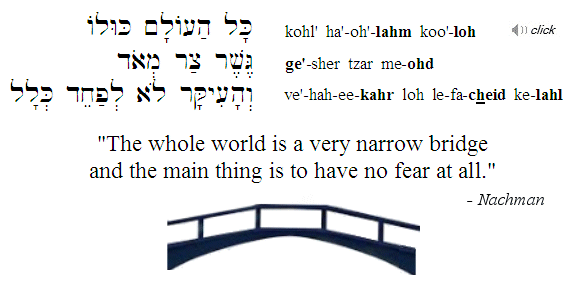
The Source of Light...
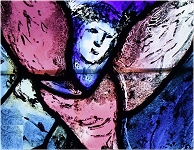
06.21.24 (Sivan 15, 5784) It is written in our Scriptures: "God is light and in him is no darkness at all" (1 John 1:5). Our Savior is "the Light of the world," the overarching Reality that gives light to every soul who is born (John 1:9). As the Source of all light, the Light before physical light, his power is irrepressible, invincible, and overcomes every shade of darkness (Gen. 1:3). Yeshua is the Logos (Λόγος), the underlying "logic" of all of creation. Unlike the transient radiance of the heavenly bodies, the Divine Light remains constant and supreme over all of creation, without any diminution or variation: God is the "Father of Lights" (James 1:17). And just as we know that the sun still shines even on the most overcast of days, so we understand that the Divine Presence is always there -- always giving, always shining, always loving us... We can trust in the power of our God to help us, since His radiance and truth pervade the darkness to enlighten our way (Psalm 112:4). As Yeshua said of his mission, "I have come into the world as light, so that whoever believes in me may not remain in darkness" (John 12:46). O precious LORD our God, let your light shine upon us...
God's blessing flows, but we must open the eye of faith for the light of God's love to shine within us brightly. As our Savior said, "Whoever has my commandments and keeps them, such is the one who loves me. And the one who loves me will be loved by my Father, and I will love him and will manifest myself to him" (John 14:21). Note that the Greek word for "manifest" means to "shine inside" (i.e., ἐμφανίζω, from ἐν, "in" and φαίνω, "shine"), indicating that the revelation would be the inward light of the Divine Presence. Indeed, the Hebrew word for "praise" (i.e., tehillah: תְּהִלָּה) comes from a verb that means "to shine" (i.e., halal: הָלַל), from which the word "halo" is derived. Similarly, the word "aura" comes from the Hebrew word "ohr" (אוֹר), meaning "light." Let your inner light shine before others so that they may see your good works and give honor to your Father who is in heaven" (Matt. 5:16).
Hebrew Lesson
Psalm 31:16 reading (click for audio):
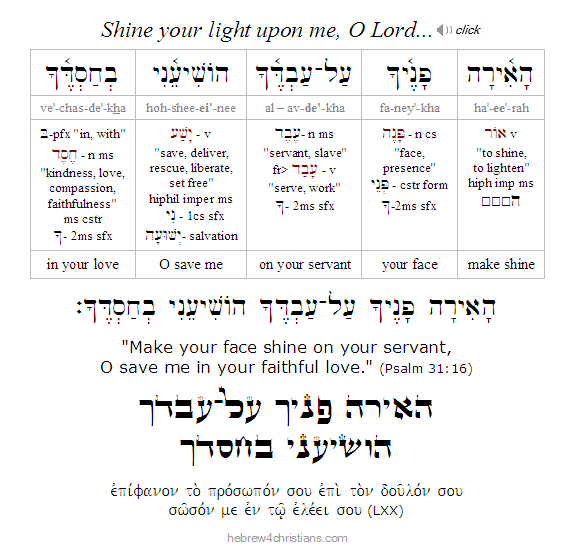 |
The Divine Light...
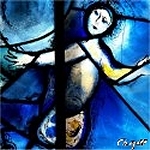
[ The following is related to this week's Torah reading, parashat Beha'alotekha... ]
06.21.24 (Sivan 15, 5784) "If I say, surely darkness covers me ... the night shines as the day; nothing hides from your radiance" (Psalm 139:11-12). We have to trust that God is in our darkness, in the silence, in the unknown... You come out of the shadows when you admit that you act just like other people, that you are human, in need of reconciliation yourself... Above all you need God. You need help. You need a miracle to help you to truly love. You may find excuses for many things, but you cannot escape the "wretched man that I am" reality that is grounded in your fears. God sees in the darkness and is present there, too. When you feel alone, like an unbridgeable gulf lay between you and all that is good; when you feel like you want to scream but are afraid that even then no one would hear, may the LORD shine His light upon you... Amen, may His light shine upon you.
גַּם־חשֶׁךְ לא־יַחְשִׁיךְ מִמֶּךָ
וְלַיְלָה כַּיּוֹם יָאִיר
כַּחֲשֵׁיכָה כָּאוֹרָה
gam-choh'·shekh · loh-yach·shikh · mee·me'·kah
ve·lai'·lah · kai·yom · ya·eer
ka·cha·she·khah · kah·oh'·rah

"The darkness is not made dark to you;
but the night shines as the day:
as the darkness so is the light...
(Psalm 139:12)

"For it is you who light my lamp; the LORD my God outshines my darkness" (Psalm 18:28). There is "depression," and there is the dark night of the soul, and these are different matters, though they may overlap... "Hope deferred makes the heart sick." The dark night of the soul is an experience of trusting God in the darkness yet has a spiritual direction and end. We walk through this darkness with God and learn from him even there...
Hebrew Lesson
Psalm 18:28 reading with comments (click):
Inescapable Questions...
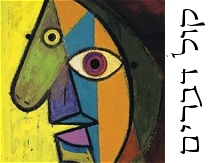
[ "Christianity is a statement which, if false, is of no importance, and, if true, of infinite importance. The one thing it cannot be is moderately important." - Lewis (God in the Dock) ]
06.20.24 (Sivan 14, 5784) Every person is subconsciously haunted by the need to discover the meaning for its existence (raison d'être). This is especially apparent in today's world of anomie and postmodern nihilism. Masses of people, brainwashed by godless cultural programming, are devoid of existential meaning and therefore collapse into despair. Consequently such people become "men without chests," to use the phrase of C.S. Lewis, that is, people without courage or moral conviction who live like impulsive animals, with neither direction nor restraint... But people are also haunted by their fears and wonder if there is ultimate hope. Is life, the universe, and everything "safe?" Is there some deep reason that I was born? If so, what is the purpose of my existence? How should I live my life? Can I know anything with certainty? Is truth something "real" or is it the product of the imagination?
Sometimes these questions are brought to mind when people feel lost, forlorn, and begin to seriously wonder whether their life has any real significance, though at other times we may witness the glories of the cosmos, or experience the grandeur of nature, or feel the heartstrings of love and these things may impress us that such design and glory is not the result of random and purposeless forces. Moreover we also sense the intuitive witness of the moral law (or moral reality) whenever we encounter injustice. When we discover the lies, violence, and deception of world leaders, for example, our heart instinctively groans and cries out for justice. When we are victims of a crime we viscerally know that what was done was unfair, wrong, and unjust. The indignation we feel over unjust violence and oppression testifies to moral reality...The "problem of evil" logically implies the "problem of the good."
These are perennial questions, of course, and many possible answers have been offered by philosophers and thinkers over the ages. And while it may be difficult to discern the truth regarding these concerns, one thing is self-evident, namely that truth is possible, for to deny this is to become an "epistemological nihilist," that is, a skeptic who irrationally insists that he "knows" there is no knowledge, or that it is "true" that there is no truth... This "reductio ad absurdum" rebounds the honest thinker into rethinking his or her assumptions, since absolute skepticism is not an answer to the "big questions" but merely an expression of despair.
The biggest of the "big questions" is whether God, or the Supreme Being, exists, since the answer to this question changes everything. The logically possible answers are "no," "yes," and "I don't know" (i.e., maybe). Regarding the denial that such a God exists, C.S. Lewis wrote: "Atheism turns out to be too simple. If the whole universe has no meaning, we should never have found out that it has no meaning." In other words, to (meaningfully) say that there is no meaning in the universe requires a sense of meaning in the first place. This is similar to the skeptical claim that "there is no such thing as "objective" (i.e., factual, ontological) truth. If that were true, then there would be no intelligible correspondence between our words (or ideas) and an external reality. Indeed, there could not be even an approximation that language could describe, since descriptions are the product of a hopelessly idiosyncratic mind, and therefore any idea of "truth" is merely the expression of relativity (or the will to power, as leftist radicals are wont to say today)... However, if very the statement that "there is no truth" is true then it must be false, since if it is true that there is no truth then the statement that there is no objective truth is no exception, and therefore is also false. This entails that meaning is a "logically necessary" condition of truth (and of falsity). Absolute skepticism is therefore self-stultifying and irrational. Hardboiled atheism, on the other hand, is a breathtakingly arrogant perspective, since the atheist must assume he or she has "god-like" powers to "know" that in every possible world, that is, in every conceivable circumstance, there is no God, no Creator, no "being than which no greater may be conceived." And this is a form of egotistical madness to be sure, a form of "apotheosis," for the atheist makes the preposterous claim that he knows every possible being or state of being in the entire universe, and that none of these beings or states of being reveal that there is a God...
The last logical option is that yes, God indeed exists and this God has revealed himself both in nature, that is, by the effects of creation, by means of the witness of human history and divine revelation, by means of the testimony of the human conscience, the intuitive sense of right and wrong, and by means of the personal encounters of countless people whose lives have been transformed by God's power and truth revealed in the life, death, and resurrection Yeshua the Jewish Messiah who is the Savior of the world. These truths cohere regarding the "grand narrative" of all existence. As C.S. Lewis once said, "I believe in Christianity as I believe that the multiplication table is true: not only because it works, but because it is true."
Of course what I have written here merely scratches the surface of a constellation of other questions and concerns, but I am trying to remind us that we are all living within an overarching framework or "worldview" that affects every aspect of our lives, and therefore it is vital to revisit our basic assumptions and to understand what we believe and why it is so important. We cannot be indifferent to these haunting questions of the soul; they are inescapable concerns that call for careful thinking. Shalom chaverim.
Hebrew Lesson
Proverbs 9:10 reading (click):
The Central Light...
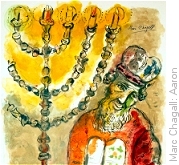
[ "I believe in Christianity as I believe that the sun has risen: not only because I see it, but because by it I see everything else." - C.S. Lewis (God in the Dock) ]
06.20.24 (Sivan 14, 5784) Our Torah portion this week (i.e., Beha'alotekha) begins with the LORD instructing Aaron to kindle the seven lamps of the Menorah (מְנוֹרָה) so that the light from each would be "turned" toward its central shaft (Exod. 25:37; Num. 8:4). The entire Menorah was formed mik'shah (מִקְשָׁה), that is, beaten from a single piece of pure gold (זָהָב טָהוֹר), and its base, shaft, branches, cups, fruits, and flowers were all "one" with its substance (Exod. 25:31). The central shaft upheld the light of the Shamash (servant or helper lamp) which also served as the trunk for the other branches.
The radiance of the Menorah symbolized the Divine light (the word "shamash" can also be read as shemesh, "sun"), which is the radiance of Yeshua, the Tree of Light and the great Servant of the LORD (John 8:12; 1 John 1:5; Prov. 3:18). Yeshua is the light that gives light to every person created in the image of God (John 1:9). Our spiritual life stems from our connection with Him, since he provides us with support, sustenance, and illumination from the oil of the Holy Spirit (John 15:1-5).
Amen. Yeshua is the Light of the LORD (אוֹר יי). As it is written, "God is our light and our yeshuah (יְהוָה אוֹרִי וְיִשְׁעִי), our salvation" (Psalm 27:1; 1 John 1:5). He alone is the Light of the world (אוֹר הָעוֹלָם), the Shamash (שַׁמָּשׁ) who descends to ignite the "light of life" (אוֹר הַחַיִּים) within all who will believe. Our Savior is the Radiance (זוֹהַר) of the glory of God (Heb. 1:3), the Fire of God's holy countenance. The person who has the Son has life, but the one who refuses this life is spiritually dead. May we all walk in the Light of His countenance; "O house of Jacob, come, let us walk in the light of the LORD" (Isa. 2:5).
The essential question is whether you are willing to believe in the light of God's love. Will you choose to receive his promise? Yeshua said that He is the light of the world, and that those who follow him will not walk in darkness, but will have the light of life (John 8:12). So, do you have ohr ha-chayim (אוֹר הַחַיִּים), "the light of Life," shining within your heart? The light radiantly beckons: "Wake up, open your eyes, and believe! Darkness and despair will not prevail; your mourning will find comfort, your grief its solace. Your heart's deepest longing shines brightly, even now, if you will but believe...
Let us press on in our confession, chaverim; let us take courage and affirm the promise of our faith: "The LORD is my light and my salvation (i.e., my Yeshua); whom shall I fear? The LORD is the refuge of my life; of whom shall I be afraid?" Amen.
Hebrew Lesson
Psalm 27:1 reading (click):
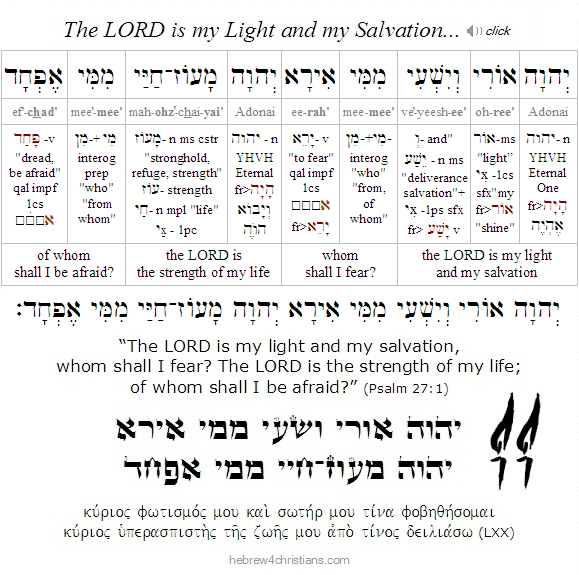 |
Note: For more on this topic, see "The Menorah and the Tree of Life."
Finding Right Desire...

[ "All get what they want; they do not always like it..." - C.S. Lewis ]
06.19.24 (Sivan 13, 5784) Our Torah portion this week (i.e., Beha'alotekha) recounts the rebellion of the people during the desert sojourn... Instead of joyfully anticipating the promise of their inheritance, the people grew dissatisfied and bored. The Sefat Emet noted that just after we read how the people complained bitterly to the LORD, they had a "strong craving" (הִתְאַוּוּ תַּאֲוָה), which in Hebrew literally means they "craved a craving."
Moses could tolerate the people's desire for food and water, but when they began to actively cultivate their cravings, lusting after the imaginary "free fish" they enjoyed in Egypt, he began to realize that the problem was deeper, a matter of the heart (Deut. 9:22)... Moses understood that what the people really wanted was impossible, since it involved denying who they were as God's redeemed people.
The issue was not about wanting to eat "meat," after all, but rather hungering after the forbidden, desiring to desire, etc. Creating desires, fomenting a sense of deprivation, and choosing to see yourself as a victim, is a lethal sickness of spirit, a disease of the soul. It is a "burning" (i.e., taberah: תַּבְעֵרָה) that destroys inner peace. It is the spirit behind all sorts of addictions. May God help us understand and seek what truly matters; may he deliver us from self-destruction; and may he help us to be satisfied with the manna he provides! Amen.
Hebrew Lesson
Numbers 11:3 reading (click):
Faith and Woundedness...
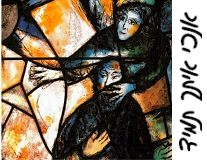
[ "The deep meaning of the cross of Christ is that there is no suffering on earth that is not borne by God." - Dietrich Bonhoeffer ]
06.18.24 (Sivan 12, 5784) Affliction can sometimes feel like torture, being abandoned by God, misunderstood by others, and disgusted with ourselves. The language of pain is intensely personal and often inexpressible. Ongoing affliction tempts us to blame ourselves, to lose sight of God, and to feel hopeless. It is a real struggle.
The French philosopher Simone Weil suffered personal affliction her whole life but connected it to the deeper message of the gospel. She learned that the walk of faith was not so much a search for a supernatural remedy from suffering but a supernatural use for it. She grew to accept and to endure her afflictions, and by steadfastness of heart to overcome the power of suffering, even though it haunted her daily life. She regarded suffering as the high calling to love and trust God despite her pain; she learned that "when I am weak, then am I strong."
The challenge of ongoing affliction is to simultaneously affirm God's presence and love in the midst of the "dark cloud of unknowing." Faith is the struggle to trust that God indeed works all things - including our ongoing afflictions - together for our good. Faith discovers God's grace is always sufficient for us, even in our weaknesses.
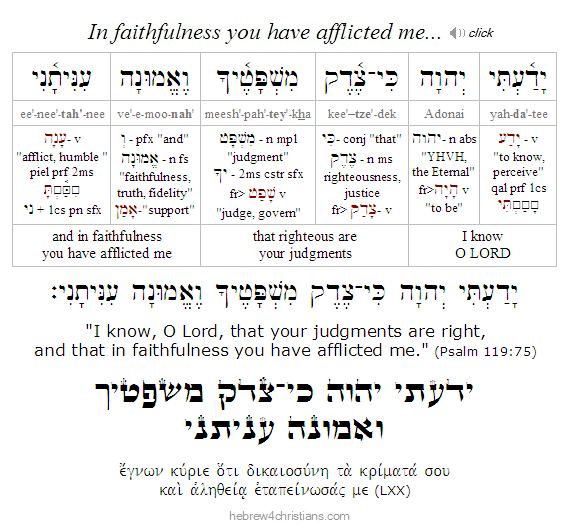 |
It is written in our Scriptures: "Faithful are the wounds of a friend; but the kisses of an enemy are deceitful" (Prov 27:6). Our LORD is a friend and lover (oheiv) who, though He may allow us to be wounded, nevertheless "sticks closer than a brother" - yesh oheiv daveik mei'ach: יֵשׁ אֹהֵב דָּבֵק מֵאָח (Prov 18:24). His afflictions are always purposive and ultimately healing.
The aim of affliction is to ground us in the truth, namely, that we are not God, and that we must surrender ourselves to God's care, even in the wastelands and desperate moments of our lives. When we cling to this world, this life, and seek to make it of value apart from Him, we are living in a state of delusion and blindness. When we are humbled by God's loving affliction, we are set free from the futility of seeking to control the world, and are thereby made free indeed.
For those whom God has chosen, the fires of affliction are purifying fires, refining fires, intended to separate the precious from the dross. We glorify God in the fire when we can say, "Here I am, LORD, do with me as it seems good in thy sight, for I know I shall not have one stroke but thou will give me grace to bear under it." Amen.
Faith in the Unseen Good...
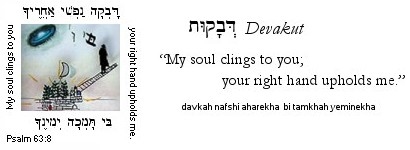
[ "The essence of optimism is that it takes no account of the present, but it is a source of inspiration, of vitality and hope where others have resigned; it enables a man to hold his head high, to claim the future for himself and not to abandon it to his enemy." - Dietrich Bohhoeffer. ]
06.18.24 (Sivan 12, 5784) From our Torah this week (i.e., Beha'alotekha) we read: "At the command of the LORD they camped, and at the command of the LORD they set out" (Num. 9:23). This teaches us that God's Name is to be heeded every step of the way.
Whenever we journey someplace, near or far, say, "With God's help (i.e., be'ezrat ha'shem: בעזרת השם) I am going to this place, and I will stay for so long, if it pleases God (i.e., im yirtzei ha'shem: אם ירצה השם)." As James reminds us, "You do not know what tomorrow will bring. For what is your life? You are a mere mist that appears for a little time and then vanishes (James 4:14-15). "Man is like a breath; his days are like a passing shadow" (Psalm 144:4).
We share exile with the LORD in this age, as strangers and sojourners with Him; indeed, our lives are "hidden with Him," waiting to be revealed (Col. 3:1-4; Psalm 17:15). "The present form (τὸ σχῆμα) of this world is passing away" (1 Cor. 7:31), and the heart of faith looks for a city whose designer and builder is God Himself (Heb. 11:10). "So we do not lose heart, though our outer self is wasting away... For the things that are seen are turning to dust, but the things that are unseen shall endure forever" (2 Cor. 4:16-18).
Hebrew Lesson:
Proverbs 3:6 reading (click):
"In all your ways know Him," that is, in all that you put your hand to do respect the Lord and ask for divine guidance (1 Cor. 10:31). As King David stated, Shiviti: "I have set the Lord always before me, because He is at my right hand, I shall not be moved" (Psalm 16:8). "Do do be wise in your own eyes, fear the LORD and turn away from evil" (Prov. 3:7).
Through Perilous Times...
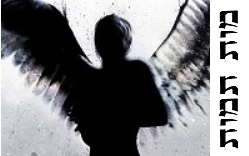
06.18.24 (Sivan 12, 5784) The Scriptures foretell that the time before the prophesied End of Days would be "perilous" (χαλεπός) and full of moral depravity: "Understand this, that in the last days perilous times (καιροὶ χαλεποί) shall come" (2 Tim. 3:1). In the entire New Testament, the only other place we find this word translated "perilous" (i.e., χαλεπός) is in Matthew 8:28, where it describes savage demonic activity. Indeed, the word likely comes from a Greek verb (χαλάω) that means "to let down from a higher place to a lower," thereby creating a sort of spiritual "chasm" or rift, which again suggests that Satan's activity will be unleashed upon the earth. In the "End of Days," then, a wave of fierce demonic activity will appear upon the earth that will menace and terrorize people. If you can stomach reading the daily news, you will see that this peril is a regular feature of our world today...
Are we then to be in dread of these things? No. "There is no fear in God's love" (φόβος οὐκ ἔστιν ἐν τῇ ἀγάπῃ). God gives truth and grace to help us navigate our difficult situation; he understands the character of the times in which we live... Notice that the Greek word translated "times" in the phrase "perilous times" (καιροὶ χαλεποί) is also translated "appointed times" (מוֹעֲדִים) throughout the Scriptures. In other words, God has appointed this time to be one of judgment upon the world system, and we are here forewarned so that we can speak the truth and offer healing to others who seek deliverance... The Lord will never leave us nor forsake us; He will shelter us in Goshen (גּשֶׁן, lit. "drawing near") before the hour of his wrath; He will walk with us through the waters, and through the fires (Isa. 43:1-2). Our Lord knows how to calm the storms around us...
Hebrew Lesson:
Isaiah 43:1b reading (click):
"False words are not only evil in themselves, but they infect the soul with evil" (Plato). Let us be careful to whom we listen and accept as our moral and spiritual authority. The latest "news" and gossip of this evil world is inherently deceptive, a carefully crafted "dialectic" of social engineering devised by Satan that is intended to divide people into warring factions in order to enslave them to their fears. We are not to follow the madness of the crowd or be victims of such devices (1 Pet. 5:8-9). Indeed the "news" of this false world (עולם השקר) is a lie, collectively considered, since it (i.e., the "script writers" of the major news outlets) illicitly assume that there is no God, there is no salvation in Messiah, no judgment to come, etc., and that people are helpless and must rely on their own devices (or on the "government").
The irony in all of this is that there is indeed a "dialectic" of the Spirit in motion, a dialectic that will make the various conflicts of this world look like a "tempest in a teapot" by comparison. The great day of the LORD approaches, and the elements will all be burned with fervent heat, as it is written: "But the Day of the LORD (יוֹם־יְהוָה) will come like a thief, and then the heavens will pass away with a horrific roar, and the heavenly bodies will be burned up and dissolved, and the earth and every deed done on it will be laid bare" (2 Pet. 3:10). As was also foretold in our prophets: "Lift up your eyes to the heavens, and look at the earth beneath; for the heavens vanish like smoke, the earth will wear out like a garment, and they who dwell in it will die in like manner; but my salvation will be forever, and my righteousness will never be dismayed" (Isa. 51:6). Instead of giving credence to the fearmongering, rumors, and blatant propaganda of this godless and insane world, we must follow the LORD God Almighty and to submit to His leadership despite the madness that surrounds us. Amen, and may God give us greater grace and wisdom for these desperate days...
Hebrew Lesson:
Isaiah 43:2a reading (click):
I hold on in trust, even in the miasma of darkness, despite myself and my broken heart, pine my lost affections, the keening of wasted days that haunt my hope; the revelation of daily dissolution and dreams that fade to black...
A warm afterglow of light beneath closed and tired eyes, I breathe deeply, slowly, and allow the blur of days past to collect themselves in the repose of a present sigh: a moment holding still, the faint whisper of the promise beyond time, space - known yet unknown - a gentle aura, lambent yet brilliant, endearing to the soul, melts away the darkness and heartache: "Come unto me..."
Heaven's Last Laugh...

[ "A continual looking forward to the eternal world is not a form of escapism or wishful thinking, but one of the things a Christian is meant to do." - C.S. Lewis ]
06.17.24 (Sivan 11, 5784) "Blessed are you who weep now, for you shall laugh" (Luke 6:21). Despite the heartache of our present life and the grief we now bear, sorrow will not be given the last word, but rather laughter and joy... And even now, in the midst of our afflictions, we can laugh at the prospect of the coming great Day when all things shall be completely healed, the untrue will be made true, the crooked made straight, and our hearts deepest dream for love will be fulfilled...
Nonetheless we still weep because we see the world as painful, tragic, and filled with so much sadness; we cry out for deliverance; we mourn over our lives and for the lives of others we love... If you have a heart that still can feel, you know the crushing weight of sin, you share the agony of others who struggle with their sufferings; and you may feel nearly suffocated by the darkness, pain, and inconsolable despair. Indeed only those who are heartless can laugh at the troubles of this world, unmoved and untouched by the sorrows of others, perhaps because they are insulated in their moneyed indifference or else because they scorn life as "hard" and unforgiving, yet in either case we hear Yeshua add, "Woe to you who laugh now" (either in levity or in bitterness), "for you shall mourn and weep" (Luke 6:25). So you see how it is: God's people will always be "out of step" with this world and its godlessness and idolatry. Genuine faith is a form of protest against any interpretation of reality that denies or minimizes the truth of the Divine Presence and therefore it suffers as the world exchanges truth for the lie.
Indeed God's people are "strangers" in this world; they are estranged and live as "resident aliens" -- here, yet not here.... Those who 'settle' here, who lay claim to life in this world, therefore make God their stranger. Thus King David said to the LORD: "We are strangers with You (כִּי־גֵרִים אֲנַחְנוּ לְפָנֶיךָ) and sojourners like our fathers; our days on earth are like a shadow (כַּצֵּל יָמֵינוּ) without abiding (1 Chron. 29:15). Faith in Yeshua affirms that underlying the surface appearance of life is a deeper reality that is ultimately real and abiding. It "sees what is invisible" (2 Cor. 4:18) and understands (i.e., accepts) that the "present form of this world is passing away" (1 Cor. 7:31). The mode of faith therefore calls us to live as toshavim - sojourners - who are at an infinite "distance" from the world of appearances and who seek the Eternal. We are "just passing through" this world, as we look forward to our promised home in heaven (Heb. 11:9-10). Then the days of our mourning shall be turned to dancing and God himself shall wipe away all tears from our eyes (Rev. 7:17; Isa. 55:11).
Hebrew Lesson
Psalm 97:11 reading (click):
Hidden Life of the Seed...
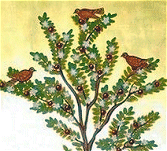
[ "Just as the sinner's despair of any hope from himself is the first prerequisite of a sound conversion, so the loss of all confidence in himself is the first essential in the believer's growth in grace..." - Arthur W. Pink ]
06.17.24 (Sivan 11, 5784) A seed is small, fragile, and seemingly insignificant, yet in the hands of a wise gardener it is understood to be miraculous, able to be perfected and made fruitful. You may feel unworthy, helpless, and forlorn, but you are regarded as blameless and upright because of the miracle of God's life imparted within you, that is, the "holy seed" implanted at your regeneration (see 1 Pet. 1:23). You have a new nature that draws life from heaven as God's own child. And just as a master gardener carefully tends to his planted seeds, so God will tend the divine life sown within your heart. The seed is "hidden" in the soil, unseen by others, yet tended by the gardener who knows its potential to be perfected.
The seed "contains" the essence of the life it replicates. Inside the seed there is an embryo (the baby plant), and when the seed begins to grow, one part of the embryo becomes the (visible) plant while the other part becomes the (hidden) root of the plant. However, the outer shell of the seed must first be broken, and then what appears is the "radicle," or the embryonic root which will develop into a plant. The life cycle of a seed is one of burial and resurrection, of growth and fruitfulness (John 12:24), and the divine life implanted within our hearts will bear fruit: "For by his sacrifice, Yeshua has perfected (i.e., made complete, whole, full of life) all those who are being sanctified" (Heb. 10:14).
Yeshua said, "Be perfect even as your Heavenly Father is perfect" (Matt. 5:48), which of course is an impossibility from a human point of view, but is a corollary of the divine nature implanted within you... The seed within you is perfected to be God's beloved child. You might miss it in the midst of your everyday struggles with fear and the "miasma" of this depraved world, but God is working in you both to will and to do his good pleasure (Phil. 2:12). Like all matters of the Spirit, God's perfection in you comes by faith, not by sight... Only the new heart (lev chadash) created by power of God's Spirit can possibly yield the fruit of the Spirit.
Therefore take heart and do not yield to despair over the mess of your lives. Remember that fruit does not immediately crop up but requires time and its own season... The process of spiritual growth is ultimately mysterious and divine: "The Kingdom of God is like someone who spreads seed on the ground. He goes to sleep and gets up, night and day, and the seed sprouts and grows, though he does not know how. By itself (αὐτομάτη, "automatically") the soil produces a crop, first the stalk, then the head, then the full grain in the head. And when the grain is ripe, he comes in with his sickle because the harvest has come" (Mark 4:26-29).
Trust in God's power to do the miracle. "Now may the God of peace who brought up our Lord Yeshua from the dead, that great Shepherd of the sheep, through the blood of the everlasting covenant, make you perfect in every good work to do His will, working in you that which is well pleasing in His sight, through Yeshua the Messiah, to whom be glory forever and ever. Amen" (Heb. 13:20-21). Amen. " He who calls you is faithful; he will surely do it" (1 Thess. 5:24).
Hebrew Lesson
Proverbs 11:30 Hebrew reading (click):
Parashat Beha'alotekha - בהעלתך
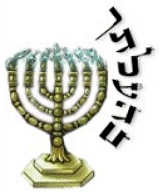
[ "I believe that God will give us all the strength we need to help us to resist in all time of distress. But he never gives it in advance, lest we should rely on ourselves and not on him alone." — Dietrich Bonhoeffer ]
06.16.24 (Sivan 10, 5784) Shavuah Tov, chaverim. Our Torah portion for this week, called "Beha'alotekha" (i.e., Num. 8:1-12:16), begins with God giving instructions about how Aaron was to attend to the lamps of the Menorah within the Holy Place of the Tabernacle (Num. 8:1-4). Each day Aaron was to clean each of the seven lamps and to refill them with the very purest olive oil. The wicks were then to be bent so that the six outer lamps shined toward the seventh (and central) shaft. The lamps were to be lit daily, "from evening until morning," in a specific sequence - starting from the central lamp (the shamash) and then moving right to left (Exod. 27:21). According to the Talmud (Shabbat 22b), while all the lamps received the same amount of olive oil, the central lamp miraculously never ran out of oil, even though it was kindled first in the sequence. This miracle is also reported to have occurred during the Temple period, though it abruptly ended about 40 years before the destruction of the Second Temple (c. 30 AD), after the death of Yeshua the Messiah, the true Servant and Branch of the LORD. As it is attested in the Talmud: "Our Rabbis taught: During the last forty years before the destruction of the Temple the lot ['For the Lord'] did not come up in the right hand; nor did the crimson-colored strap become white; nor did the centermost light shine" (Yoma 39a).
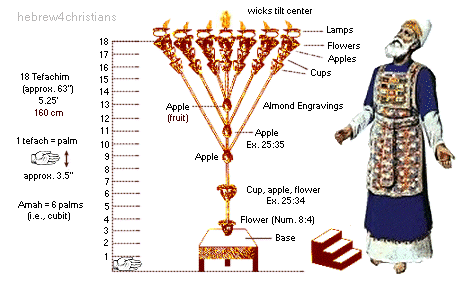 |
The portion then describes how the Levites were to be set apart for service at the Mishkan or "Tabernacle" (Num. 8:5-12). In a ritual ceremony that signified a sort of "rebirth," the Levites were first sprinkled with mei chachatat (מי חטאת), literally, "the waters of sin" (Num. 8:7), that is, holy water mixed with the ashes of the red heifer sacrifice that was used to purify from contamination with death (Num. 19:13). Next they shaved off all their hair and were completely immersed in a mikveh (i.e., a bath containing flowing or "living" water). Notice that the steps of being sprinkled with purifying water, shaving off of all the hair, and being completely immersed in a mikveh were similar to the ritual for the cleansing of the metzora, or "leper" (Lev. 14:2-32), suggesting that a qualified priest was a "healed leper" of sorts. The medieval commentator Rashi notes that each member of the community was then required to place their hands on the Levites' heads, just as the hands were placed on the head of a sacrificial animal as it was slaughtered before the altar (Num. 8:10; Lev. 1:4, 3:2). The "waving" of the Levites by the High Priest likewise simulated the ritual of "tenufah" (תנופה), that is, the waving of the guilt sacrifice (asham) that was offered by a leper after his or her cleansing (Lev. 14:12). Finally, the Levites themselves laid their hands on the sin and whole burnt offerings for atonement before the LORD (Num. 8:12).
The portion then continues with a restatement of law of Passover (Num. 9:1-14), followed by a description of the Cloud of the LORD (i.e., anan Adonai: עֲנַן יְהוָה) that covered the Tabernacle by day and appeared as a pillar of fire (עַמּוּד אֵשׁ) by night. When the Cloud lifted the people would break camp and go to their next location en route to the promised land; when the Cloud settled the people would stop and encamp again (Lev. 9:15-23).
Two silver trumpets (i.e., chatzortzrot kesef: חֲצוֹצְרֹת כֶּסֶף) were to be made for various purposes, including signaling the people to break camp, assembling the elders of Israel, to mark the arrival of new moons and appointed times, as alarms for battle, and so on.
The Cloud of the LORD lifted and the people of Israel then decamped from Sinai on the 20th day of the second second month of the second year after the Exodus from Egypt (Num. 10:11-35). The Ark of the Covenant went out first to scout a location followed by a specific camp order and formation.
Soon after many began to complain of the hardship of the journey, and the Fire of the LORD (אֵשׁ יְהוָה) broke forth and consumed people on the outer parts of the camp. The name of the place was subsequently commemorated as "Taberah" (תַּבְעֵרָה)- "the burning."
Despite the judgment of the LORD, some time later the eirev rav (mixed multitude) craved for Egyptian food and the people of Israel joined them by recalling the "free fish" they ate in Egypt. The people also complained of the monotony of the manna that fell like dew from heaven to feed the people during their journey (Num. 11:1-15). Moses then lamented to the Lord about how hard it was to lead the people, and God then instructed him to appoint 70 elders of Israel to help him lead the people (Num. 11:16-17). As for the people's complaint over the divine menu, the LORD sent an enormous swarm of quail that brought a plague upon the people. Because so many died from the plague, the place was called Kibroth-hattaavah (קִבְרוֹת הַתַּאֲוָה), or the "Graves of Craving" (Num. 11:18-33).
The portion ends with the attempted mutiny of Miram and Aaron regarding Moses' role as the exclusively chosen leader of the people of Israel. They secretly consulted and asked: "Has the Lord indeed spoken only through Moses? Has he not spoken through us also?" The LORD heard their secret conversation and intervened by calling them to appear with Moses before the Tent of Meeting. There the LORD vindicated as the sole leader of Israel because only he speaks "mouth-to-mouth" with God. Miriam was then stricken with tzaarat ("leprosy") and exiled from the camp. Moses prayed for his sister be be healed (אֵל נָא רְפָא נָא לָהּ) but the LORD delayed healing her seven days to correct her and to be an object lesson to Israel.
Parashah Themes...
Some themes for this week's reading include the symbolism of the Menorah and the Divine Light; the ongoing need for purification from sin; the role being a priest to one another; the call for holiness in the divine service; the Shekhinah Glory and Presence of God; the direction and leading of God; the tests we face as we journey through desert places; the problem of our complaining hearts; the requirement to live by "daily bread"; the importance of respecting elders; tzaarat and exile from the camp, among others.
Loving the Stranger...

[ The following is related to this week's Torah reading, parashat Naso... ]
06.14.24 (Sivan 8, 5784) In our Torah portion for this week (Naso) we read that after taking a census of the clans of the Levites who would help the priests perform their duties at the Mishkan (Tabernacle), Moses instructed the Israelites to remove anyone who was ritually unclean from the camp. He then instructed that anyone who had wronged another to confess their sin, make restitution for the full amount (plus one-fifth), and offer an guilt offering for atonement. Notice, however, that this law of restitution applied not only to one's fellow Jew, but also to "strangers" (i.e., gerim: גֵּרִים) as is indicated by the immediately following verse: "But if the man has no next of kin to whom restitution may be made for the wrong, the restitution shall go to the LORD..." (Num. 5:8). The sages ask, "Is there anyone in Israel who has no next of kin - no brother, no nephew, no distant relation going back to Jacob? This can only refer, therefore, to a stranger, since he has no heirs" (Sifrei). If for some reason the stranger cannot be compensated for his loss, restitution must be made to the LORD, which implies that stealing from the stranger is to steal from God Himself.
Recall that the "mixed multitude" (i.e., erev rav: עֶרֶב רַב) were those Gentiles who tagged along with Israelites during the Exodus from Egypt. Like the Jewish people, they had left everything behind them in the hope of finding a new life of freedom. When the Israelites were camped at Sinai and the tribes were brought into formation, however, there seemed to be no provision made for these people. Indeed, these "strangers" were social outcasts from the camp of Israel who were ineligible to serve in the army or to partake in the services of the Tabernacle. There is no mention of their location among the camps of Israel, nor is there any census recorded of their numbers. We can only surmise that they lived a hardscrabble existence as they wandered with the camp of Israel in the desert...
The midrash sees a direct connection between the expulsion of the unclean among the camp of Israel and the law of restitution as applied to the stranger: "For them that honor Me, I will honor, and them that despise Me shall be lightly esteemed" (1 Sam. 2:30). Who were those who honored God? The proselytes... Who were those who despised God? Those who worshipped the Golden Calf. How did God repay them? He smote them with leprosy and venereal disease and expelled them from the camp. How did God honor the proselytes in return? He inserted the section warning us to look after them immediately following the section dealing with expelling the lepers from the camp. From this we learn that God repels the sinners of Israel while befriending the proselytes who seek Him. They are protected by the same law as the Israelite, and whoever takes from them by violence is dealt with just as if he had taken from an Israelite" (Bamidbar Rabbah 8:3).
So even at the very beginning of Israel's national history we see God's care for the "stranger" who dwelled among his people. Regarding the law of Passover, the LORD stated, "There shall be one law (תּוֹרָה אַחַת) for the native and for the stranger who sojourns among you" (Exod. 12:49). "You shall treat the stranger who sojourns with you as the native among you, and you shall love him as yourself" (Lev. 19:34). The sages ask, why does God love the stranger? Because they have no hereditary or family title. If someone truly wants to become a righteous person, God honors them as if they were the very priests of Israel. Proselytes are what they are simply out of love for God, just as Ruth was made a mother of the Messiah by means of her love for God alone. As it is written, "The LORD loves the righteous; He protects the stranger" (Psalm 146:8).
Concerning the obligation to love the stranger and treat him with righteousness, Rabbi Jeremiah said: "How can you know that the Gentile that practices the law is equal to the high priest? Because it is said, "which, if a man do, he shall live through them" (Lev. 18:5). And it says, "This is the Torah of man" (2 Sam. 7:19). It does not say, "the law of the priests, Levites, Israelites," but "This is the law of man (תּוֹרַת הָאָדָם), O Lord God." And it does not say, "Open the gates and let the priests and Levites and Israel enter," but it says: "Open the gates that the righteous may enter" (Isa. 26:2). And it says, "This is the gate of the Lord, the righteous shall enter it." It does not say, "The priests and the Levites and Israel shall enter it" (Psalm 118:20). And it does not say, "Rejoice you, priests, Levites, and Israelites," but it says,"Rejoice you righteous" (Psalm 33:1). And it does not say, "Do good, O Lord, to the priests and the Levites and the Israelites," but it says "Do good, O Lord, to the good" (Psalm 125:4). So even a Gentile, if he practices the Torah, is equal to the high priest (Sifra 86b; Baba Kamma 38a).
Regarding the law of the stranger, there are two applications. First, we should remember that "outsiders" are beloved by God and often present a challenge to our supposed identity as God's favored children. The "caste system" within ancient Judaism was intended to humbly serve the greater community, just as Yeshua likewise taught us to love one another, and "if anyone would be first, he must be last of all and servant of all" (Mark 9:35). After all, the primary role of a "priest" was to enable others to draw near to the Divine Presence, not to exclude them from it, and those who serve God in the truth will always seek to heal the sense of "estrangement" from God. Secondly, those who were not raised with the benefit of Jewish heritage but who have genuinely laid hold of Yeshua as their Mashiach and Savior "have a place at the table" in God's Kingdom. "Remember that you were at that time separated from the Messiah, alienated from the commonwealth of Israel and strangers (gerim) to the covenants of the promise, having no hope and without God in the world. But now in Yeshua the Messiah you who once were far off have been brought near by the blood of Messiah. For he himself is our shalom, who has made us both one and has broken down in his flesh the dividing wall (mechitzah) of hostility, by destroying in his own body the enmity required by the Torah with its commandments and ordinances. He did this in order to create in union with himself from the two groups a single new humanity and thus make shalom, in order to reconcile to God both in a single body that was executed upon the cross by killing that enmity. For through the Messiah we both have access in one Spirit to the Father. So then you are no longer strangers and aliens, but you are fellow citizens with the saints and members of the household of God" (Eph. 2:12-20).
A "stranger" is anyone from whom we would withhold genuine respect and love. As Martin Buber once wrote, it is only through the "thou" a person becomes "I." In other words, we are incomplete people if we live in fear of others and deny their essential dignity and worth before our Heavenly Father. We can't regard someone else as a stranger without becoming a stranger ourselves... The message of our hope is "God so loved the world," but that world includes the habitation of many who are strangers to the grace and kindness of God. God has commissioned us to be emissaries of his grace and love to the world of the stranger... May we heed the call welcome all who are thirsty to come and drink from the waters of life.
Hebrew Lesson
Lev. 19:34a reading (click):
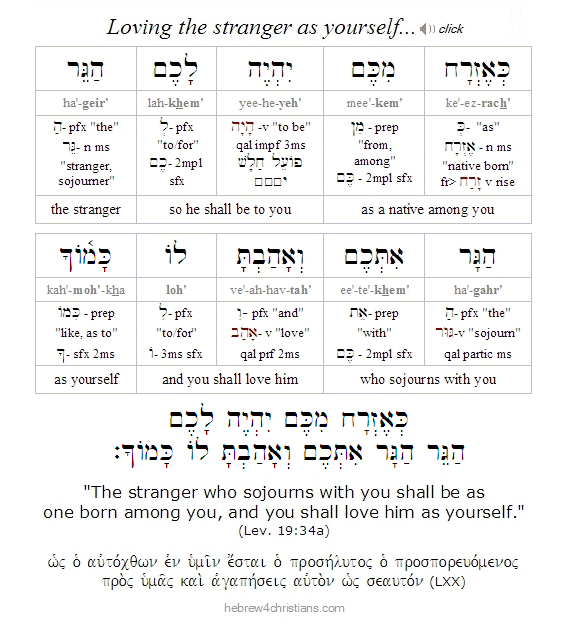 |
Sin and Insanity...
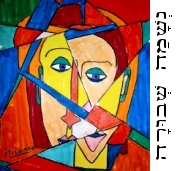
06.14.24 (Sivan 8, 5784) From our Torah reading this week (i.e., parashat Naso) we read, "If any... goes astray and breaks faith..." (Num. 5:12). The sages comment that the Hebrew for "goes astray" (i.e., tisteh: תִשְׂטֶה) is written so it may also be read as "goes insane" (i.e., tishteh: תִשְׁטֶה), and concludes that sin is a form of insanity, that is, a denial of what is real, and therefore a state of delusion.
We are required, as a matter of our faith in the truth of Holy Scripture attested by the Holy Spirit, to believe that God is knowable (Rom. 1:19-20), that we are always in His presence (Prov. 15:3; Psalm 94:9; 139), that He is all-knowing or omniscient (Psalm 147:5), and that nothing can be hidden from Him (Isa. 40:28; Jer. 23:24; Heb. 4:13), but when we sin, we "break from" this reality and deny the divine Presence by a perverse act of self-exaltation.
Whenever we imagine that we are unseen by God or whenever we "forget" that we live, move, and have our being in His presence, we are denying reality. Our sin causes us lose sight of what's real: we forget who God is; we forget who we are; and we exile ourselves from the Source of life... Surely sin is a form of insanity, and therefore we have a moral and spiritual obligation to think clearly and to value truth.
As Rabbi Judah would say, "Contemplate three things, and you will not come to the hands of transgression: Know what is above from you: a seeing eye, a listening ear, and all your deeds being inscribed in a book" (Pirke Avot 2:1). Therefore "fear God and keep his commandments, because this is the whole duty of man. For God will bring every deed into judgment, with every secret thing, whether good or evil" (Eccl. 12:13-14).
Hebrew Lesson:
Ecclesiastes 12:14 reading (click):
Finding the Path of Life..

06.14.24 (Sivan 8, 5784) What is more important than finding the "path of life?" Consciously or not, every day billions of people all over the world are seeking that which will satisfy their heart's deepest longings for unending life, unbounded joy, and abiding pleasure. As C.S. Lewis pointed out, this ultimate longing is a "message" from another world.
Many people are seduced from heeding this message. Some believe that life consists of a series of sensual pleasures – eating, drinking, romance, sexual relations, etc., while others attempt to "lose themselves" in various kinds of entertainment. However, such fleeting moments of pleasure invariably cause an inward fragmentation of the soul, thereby weakening the will and inducing a state of forgetfulness regarding the deepest needs of life.
Others are deluded into attempting to find life by means of creating a "legacy" for themselves. To earn respect, to experience fame, or to be heroically remembered is considered the path of life. However, as Shakespeare poignantly reminds us, human history is at best a "tale told by an idiot, full of sound and fury, signifying nothing."
Still others hope to find life through various placating religious rituals and practices. In Orthodox Judaism, for example, the Orach Chayim is a handbook that meticulously provides a set of rules and regulations (halakhah) regarding sleeping, waking, wearing clothes, reciting blessings, observing Sabbath and the holidays, and so on. The path of life, according to the religionist, is the performance of various ritual acts in order to attain God's approval and blessing.
In Psalm 16:11 we read: "You will show me the path of life; in your presence is fullness of joy; at your right hand are pleasures forevermore." The verb translated "you will show me" is a hiphil (causative) form of yada' (to know) and could better be translated "you will cause me to know," indicating that God is active in the knowing process. Here King David, despite the anxiety he felt regarding death, voiced his trust that God's love would personally intervene to deliver him from the prospect of physical corruption in the grave (v10).
From the New Testament, we know that this verse ultimately refers not to David (who eventually died), but to Yeshua the Messiah, the greater Son of David (Mark 12:35-6, Psalm 110:1). Peter cited this verse in his Pentecost sermon (Acts 2:25-28), as did Paul at Antioch (Acts 13:35-37). Despite the grisly prospect of the crucifixion, Yeshua trusted that God, by raising him from the dead, would not allow him to suffer corruption (Matt. 16:21).
Interestingly, the Hebrew word netzach ("forevermore") denotes both "victory" and "eternity," and reveals that Yeshua's resurrection provides the everlasting victory over the sting of death itself. Yeshua is forever enthroned at the very side of the Majesty on High as the "Key Holder" to life and death (Rev. 1:18).
The ultimate longing we have in our hearts is really a message from God – to come to Him to have our deepest needs met. The true orach chayim is only found in a personal, trusting relationship with the resurrected Savior - Yeshua the Messiah (John 14:6). When we receive the message of His gracious love, our heart's deepest longings will be truly satisfied. We will experience fullness of joy in God's loving presence, and we will enjoy abiding pleasures in our communion with God. Amen.
Hebrew Lesson:
Psalm 16:11 reading (click):
Changed by His Spirit...
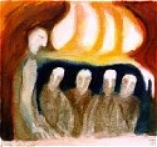
06.13.24 (Sivan 7, 5784) The great Apostle Paul (רבי פאולוס השליח) taught that we are not to be "conformed" (συσχηματίζω) to the pattern or customs of this fallen world but rather be "transformed" (μεταμορφόω) by renewing our minds, so that by testing we may discern what is the will of God (see Rom. 12:2).
Note that the word translated "conformed" in this verse means to accept the world's scheme (σχῆμα) of understanding things, that is, to passively go along with the world's matrix of lies, wishful thinking, propaganda, etc. The word translated as "transformed," on the other hand, means to be metamorphosed or radically changed into a different kind of nature with a different source of being itself. Such transformation comes from having our minds "renewed" -- the word used in this verse (i.e., ἀνακαινόω) means being "made new on the inside," and therefore renewal is the gift of teshuvah (turning to God).
Understand, then, that the foundation of all transformation of inner character and outward conduct comes from the miracle of having a renewed mind. I use the word "miracle" quite intentionally, since by itself "right thinking" is powerless to help the sinner truly change his ways, and therefore new life and healing power from heaven is essential....
Hebrew Lesson:
Psalm 19:7 reading (click):
Moses and the Messiah...
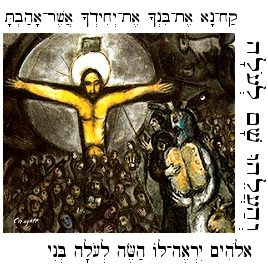
06.13.24 (Sivan 7, 5784) Shalom my dear friends... Our Torah portion this week (i.e., parashat Naso) ends with these words: "And when Moses went into the Tent of Meeting (i.e., Mishkan) to commune with the LORD, he heard the Voice (הַקּוֹל) speaking to him from above the mercy seat (i.e., kapporet: כַּפּרֶת) that was upon the Ark of the Testimony, from between the two cherubim; and there He spoke to him" (Num. 7:89).
Now Moses was truly an extraordinary and wonderful person -- Israel's first great prophet, priest, and king. His life can be divided into three great distinct periods of 40 years each. First, he was raised as an Egyptian and lived as a prince of Egypt (the Egyptian period); second, he fled to the land of Midian where he became a shepherd and encountered God in the desert (the Midianite period); and third, after the great deliverance from Egypt, Moses led the people back to Sinai where he 1) became the mediator (priest) of the covenant between God and Israel, 2) legislated the various laws of the Torah, and 3) received the prophetic vision of the Tabernacle, the future exile, and the ultimate glory of Zion.
Notice, however, that Moses was extraordinary in the sense that he transcended the entire system of religion that was later established as "Judaism." First, as the great legislator, Moses stood outside of the law, serving as its voice of authority. Second, as the high priest of Israel, Moses instituted various sacrificial rites before the laws of sacrifice were enacted. For example, he instituted the Passover sacrifice in Egypt (Exod. 12:1-11), and when the people later reached Sinai, he offered blood sacrifices to ratify the terms of the covenant (Exod. 24:8). Moreover, he ascended the mountain and received the prophetic vision of the Sanctuary before the priesthood had been instituted in Israel (Exod. 25:8-9). And even after the laws of the priests were enacted and the Tabernacle was erected, Moses was allowed to go before the very Holy of Holies to hear the Voice of the LORD, even though technically speaking this was forbidden, since Moses was not a kohen (i.e., descendant of Aaron).
I mention this because some Jewish people stumble over the fact that Yeshua, who was from the tribe of Judah, served as Israel's High Priest of the New Covenant. Of course this issue is addressed in the Book of Hebrews, where the role of the Malki-Tzedek priesthood is ascribed to King Yeshua (Heb. 5:6-11; 7:1-19), but it is important to realize that Moses himself foresaw the coming of the Messiah as Israel's great prophet, priest and King (Deut. 18:15-19; John 5:36). Indeed, just as Moses himself was "outside" the law by serving as Israel's priest but nevertheless was commissioned by God Himself, so also with Yeshua, who instituted the sacrifice of His blood as the Lamb of God and who went directly before God's Throne to intercede on our behalf.
Like the patriarch Joseph before him, Moses was a "picture" of Yeshua in various significant ways. Though he was a Jew from the tribe of Levi, he appeared as a "prince of Egypt" to his own people and was educated in all the wisdom of the Egyptians (Acts 7:22). And though he was God's chosen deliverer, Moses was initially rejected by the Israelites and then turned to the Gentiles, taking a "foreign" bride. After being severely tested in the desert, he was empowered by God's Spirit to become Israel's deliverer for their hour of great tribulation. Indeed, both Moses and Yeshua were "sent from a mountain of God" to free Israel; both revealed the meaning of God's Name; both spoke with God "face to face." Moses was sent from (physical) Mount Sinai in Midian; Yeshua was sent from a spiritual "Mount Zion" in Heaven (Heb. 12:22). The New Testament relates that Moses and Elijah later met with Yeshua to discuss His "departure," literally, "His Exodus" (τὴν ἔξοδον αὐτοῦ) that he would accomplish at Jerusalem to redeem the entire world (Luke 9:30-31).
Hebrew Lesson
Deut. 18:15 reading (click):
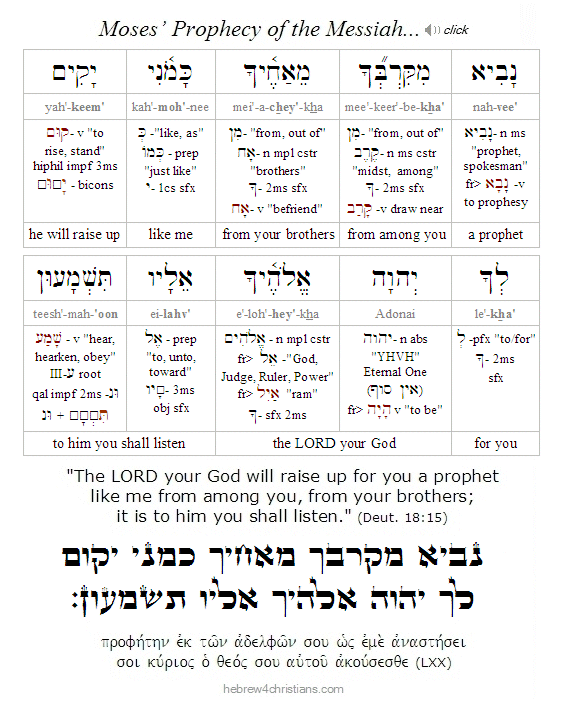 |
Moses foretold the coming of Yeshua who would resemble him in many distinctive and remarkable ways. For more on this subject, see "Moses' Prophecy of the Messiah."
The Ultimate Reality...
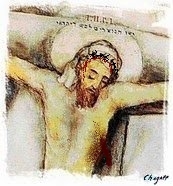
[ "Sin is in itself separation from the good, but despair over sin is separation a second time" - Soren Kierkegaard ]
06.12.24 (Sivan 6, 5784) The revelation of God in Yeshua means that Ultimate Reality -- that is, the transcendental source of all that exists -- is intensely personal, intimately knowable, and full of love. "Metaphysics" (i.e., that which is "really real") is therefore not about an impersonal force known in objective relationship (i.e., a "what") but a personal agency and creative mind known in subjective relationship (i.e., a "who"). The Scriptures teach that what is ultimately real (אהיה אשׁר אהיה) is the Ultimate Person of the LORD (אני יהוה). In Him we "live and move and have our being" (Acts 17:28).
The LORD who is the Most High, the possessor of heaven and earth, is not just the Creator and Sustainer of all possible worlds, but the Lover and Redeemer of our very souls -- the One who empties himself to become "with us" and who overcomes the sickness of death for us... The climactic expression of the character of Ultimate Reality is revealed at Golgotha, the "place of the skull," where God's sacrificial life in Yeshua destroyed death by the greater power of divine love (Psalm 85:10). The heart of our Lord as he suffered and died for our sins reveals the great compassion of God; it is "ha'makom" (הַמָּקוֹם) the place of his atonement for us; his hidden dark cloud, and his resurrection glory reveals our deliverance for death. God loves us despite knowing all of our sins and yet redeems us from its curse...
We "connect" with the truth of who God is by the instrumentality of faith, and the essential question is whether we are in a "trusting relationship" with God or not, for if we do not truly know God as our loving Savior, we remain lost, in darkness, and alienated from the life of God. Faith is self-authenticating as we experience grace in the exercise of our trust in God.
Practically speaking, our relationship with God "shows up" in our lives by means of the various choices we make, though particularly in our moral choices. That's because righteousness is "ontological," or grounded in what is real. Since God is righteous, doing acts of righteousness enables us to partake in God's life and passion (1 John 2:29). On the other hand the practice of sin deadens us and turns us away from God's Presence...
Love is essentially relational, and therefore the Scriptures reveal God as being in relationship both with others within creation, but also within himself - the One God is unity in plurality of relationship: Father, Son, and Holy Spirit (John 17:24). The "I AM" of God (Being) is also known in the "Thou Art" of God (Doing). God is not only the Eternal Lover but also the Eternal Beloved, and the bond of that love is the Spirit of God "hovering above the depths." "Draw near to me, hear this: from the beginning I have not spoken in secret, from the time anything came to be there I AM, and now the Lord GOD has sent me, and his Spirit" (Isa. 48:16). Note in this verse the transpersonal unity of the Godhead....
Now while the Torah certainly affirms that "God is one" (יהוה אחד), note that the word "one" (i.e., echad: אֶחָד) means something more than merely numerical identity (i.e., yechidut: יְחִידוּת) but instead unity in plurality, a "transcendental oneness" that points to the unfathomable mystery of the Name YHVH (יהוה) and the ineffable Godhead (אֵין סוֹף). Moreover, echad primarily means "first" in order or preeminence, for example when the Torah describes the "first day" of creation not as "yom ha'rishon" (יום ראשון), but as "yom echad" (יוֹם אחד; Gen. 1:5). That is why the Shema is not an affirmation of the "mystical pantheistic unity of all things" but rather that the LORD our God is preeminent and alone worthy of our worship and trust. "Hear, O Israel, the LORD our God is one LORD (i.e., unity of the godhead) the LORD alone (i.e., God is first, primary, central, and our greatest good). "God is love" means that he is the Lover, the Beloved, and the Communion of true love
The doctrine of the tripartite-yet-one divine nature (השילוש הקדוש) is not known apart from the revelation of Yeshua, and it is an essential part of His message of redemption to us (see John 17:3). In other words, if you believe that Yeshua embodies and reveals the "Who" of Ultimate Reality, then you will accept his teaching that God is expressed in relationship - the Son in relation to the Father and to the Holy Spirit, and that these three are "echad," or one... "The Father has borne witness of me; whoever has seen me has seen the Father" (John 5:37; 14:9); "I and the Father are one"; "before Abraham was, I am..." "who is the liar but he who denies that Yeshua is the Messiah? This is the antichrist, he who denies the Father and the Son" (1 John 2:22). Believers in the Lord are commissioned to go and make students or learners (תלמידים) of all the nations, baptizing them (i.e., identifying them) in the name of the Father, and the Son and the Holy Spirit" (Matt. 28:19).
Hebrew Lesson:
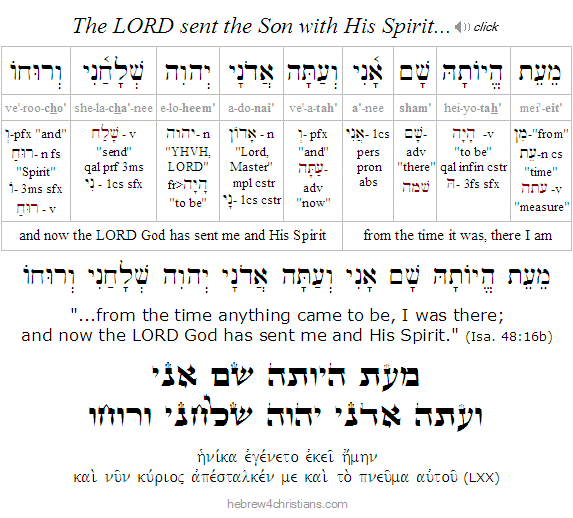 |
God's Face In Yeshua...
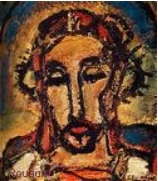
06.12.24 (Sivan 6, 5784) There are various clues given throughout Scripture about God's divine nature (Rom. 1:20). The Torah itself begins with intimations of the "One-in-the-Many" character of God. For instance, when we read, "In the beginning, God (אֱלהִים) created the heavens and the earth," we might ask who exactly is speaking? In other words, who is the narrator of the Torah? The next verse states that the Spirit of God (רוח אלהים) was hovering over the face of the waters, followed by the first "direct quote" of God Himself: i.e., יְהִי אוֹר: "Let there be light" (Gen. 1:2-3). The creative activity of Elohim (God) and the presence of Ruach Elohim (the Spirit of God) are therefore narrated by an omniscient Voice or Davar Elohim (the Word of God). Obviously the Spirit of God is God Himself, just as the Word of God is likewise God Himself, and consequently the very first verses of the Torah reveal something of the nature of the Godhead: God is One in the sense of echdut, "unity," "oneness," and so on, though not "one" in some monistic sense of a solipsistic mind (νοῦς). Indeed, a monistic idea of God (i.e., God as "absolute" oneness) is one of a being who is inherently self-absorbed and unable to accommodate being outside of itself. Such a god may serve as a "deus ex machina" or contrived "unmoved mover" or "first cause" of the universe regarded as a "cosmic machine," but it is not relational within itself. Indeed, there can be no sense of "person" apart from relationship, and therefore God's Personhood is as eternal as his Being.
Yeshua is the Source of all life in the universe: כָּל־הַמַּעֲשִׂים נִהְיוּ עַל־יָדוֹ / "All things were made by Him (John 1:3). The "Word made flesh" is the "image of the invisible God" and the "radiance of the glory of God and the exact imprint (χαρακτήρ, 'character') of his nature" (Col. 1:15). All of creation is being constantly upheld by the word of His power (Heb. 1:3): "All things were created by Him (i.e., Yeshua), and for Him" and in Him all things consist (συνεστηκεν, lit. "stick together") (Col. 1:16-17). As our Creator and Master of the Universe, Yeshua is both our King and our Judge, and therefore our lives center upon him... Ultimate Reality is found in the presence of Yeshua our LORD, and eternal life is found in Him alone: "For God, who said, "Let light shine out of darkness," has shone in our hearts to give the light of the knowledge of the glory of God in the face of Yeshua the Messiah" (2 Cor. 4:6). "And we all, with unveiled face, beholding the glory of the Lord, are being transformed into the same image from one degree of glory to another. For this comes from the Lord who is the Spirit" (2 Cor. 3:18).
"The grace of the Lord Yeshua the Messiah (האדון ישׁוע), and the love of God (אהבת האלהים), and the communion of the Holy Spirit (רוח הקדשׁ), be with you all" (2 Cor. 13:14).
Hebrew Lesson:
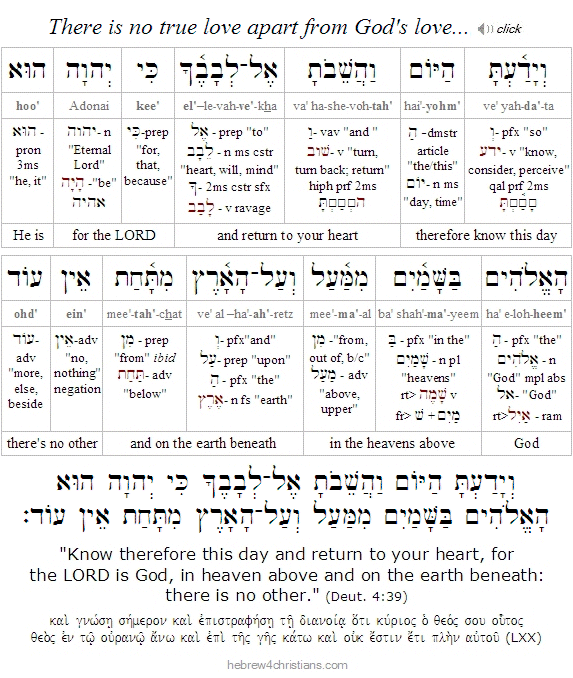 |
Yeshua the True Vine...

[ Today we are observing the climactic holiday of Shavuot ("Weeks," or "Pentecost")... ]
06.12.24 (Sivan 6, 5784) Yeshua said, "I am the true vine, and my Father is the Gardener. Every branch in me that does not bear fruit he takes away, and every branch that does bear fruit He purges (καθαιρει), that it may bear more fruit" (John 15:1-2). In other words if you bear fruit you will experience the "purging process," and that means suffering affliction...
This might seem to you backward: Why does the fruitful branch need to be cut back? Indeed, the promise of suffering is not meant for an evil person, but for the righteous soul who trusts in God. Purging is painful but it is also purifying, yielding new growth within our hearts. Yeshua taught, "Blessed are the pure in heart, for they shall see God" (Matt. 5:8). The Greek word translated "pure" is katharos (καθαρoς), sometimes used describe the cleansing of a wound (catharsis), or to describe the unalloyed quality of a substance revealed through refining fire.
We "rejoice" in testing because that is the way of real growth, sustained hope, and the revelation of God's deep love (Rom. 5:3-4). In our afflictions we are given heavenly consolation that helps us to persevere (2 Cor. 1:3-5). Remember that we are being weaned from this present age to be made ready for heavenly glory, for things unimaginably wonderful, soon to be revealed to you. Stay tuned, friends: the best is yet to come!
Yeshua warned us, however, that "if anyone does not live in Me, he is cast off as a branch, and withers..." (John 15:6). We find life only as we remain connected to the Source and Conduit of life, who is the Messiah, the Savior and LORD. True life grows out a heart connection with Yeshua, and without that connection our lives become vain and yield no eternal significance (John 15:5). Be forewarned: it is the Torah of Messiah that if you do not live in the Vine you will wither away, since life is found in no other Source (John 14:6; Luke 3:9). But be encouraged, trusting friend: we cannot create new life by our own efforts or effect regeneration by means of our own "good works." No, the work of salvation is God's alone, and we partake of that work as we abandon our self-efforts and forsake our religious conceits (see Isa. 32:17; Mark 4:26-29).
There remains, therefore, a Sabbath for the people of God, "for whoever has entered God's rest has also rested from his works as God did from his" (Heb. 4:9-10). This "deep Sabbath" is a matter of trusting that the work of salvation has been accomplished on your behalf. Therefore "strive to enter into that rest," for the LORD always effects what is best for you. The path of peace is to surrender to God's care for your life and let the evils and dramas of this world flow past you. This is "the work of faith." Look to heavenly reality and not to the vanity and deceits of this world (Col. 3:1-4); live in Yeshua's Presence, drawing strength and vitality from your relationship with Him. The fruit of the Spirit is produced as we surrender and yield ourselves to the love and presence of God.
Hebrew Lesson
John 15:1 reading (click):
Ruth and the Redeemer...
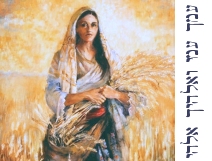
[ "Every teacher of Torah who becomes a disciple in the Kingdom of Heaven is like a homeowner who brings from his storeroom new gems of truth as well as old." - Yeshua; Matt. 13:42 ]
06.11.24 (Sivan 5, 5784) The Shavuot holiday begins this evening at sundown. Chag Shavuot Sameach! During the season of Shavuot we read the Book of Ruth (מגילת רות), which tells the story about redeeming love and the advent of King David. Recall that King David was a direct descendant of Ruth, who as a Moabitess was an outsider and "stranger" to the promises of God (Ruth 4:17; Eph. 2:12). Despite being part of an despised and rejected group of people (see Deut. 23:3), Ruth overcame the law's demand by believing in the love and acceptance of a redeemer of Israel (Ruth 3:9). Ruth's great grandson was named David (דָוִד), meaning "beloved," which has the same numerical value as the word "hand" (יָד). It is no wonder that the LORD chose David to represent God's extended hand of love for the stranger, for the convert, for the outsider, the leper, and the lost, since his descendant Yeshua the Messiah came to love and redeem the entire world by means of His outstretched hands.
Now while the narrative of the Book of Ruth is straightforward, to fully understand its spiritual implications we need to be familiar with several laws from the Torah, including the laws of redemption (Lev. 25:32-55), the laws of Shemittah and Jubilee years (Lev. 25:4, 10, 23), the laws of family inheritance (Num. 27:8-11), the laws of yibbum or "levirate marriage" (Deut. 25:5-10), and various farming laws regarding leaving food for the poor and the stranger (Lev. 19:9-10; 23:22; Deut. 24:19). In addition, we need to understand the laws of warfare for taking possession of the land, and God's repeatedly stated commandment that Israel must be holy and not assimilate with surrounding cultures (Exod. 34:12; Deut. 7:1-6; 14:2, etc.). This restriction applied not only to the seven Canaanite nations (Deut. 7:1; 20:17-18), but also to the descendants of Lot (i.e., Amnonites and the Moabites), since they showed enmity to Israel when they first came to the land (Deut. 23:4-6). Indirectly, then, the story of Ruth provides a strong message to Christians: to follow the story of redemption, you must understand the Torah and its commandments! Amen...
Hebrew Lesson
Ruth 1:16a reading (click):
A word of thanks for you...
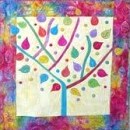
06.11.24 (Sivan 5, 5784) I want to express my thanks and appreciation to all my supporters. I love you guys and am deeply touched by your gracious hearts. I have not been able to send out many thank you notes for the last few months because of additional demands on my schedule. Please forgive me and understand that I am truly grateful for your kindness and for your help sustaining the Hebrew for Christians ministry.
Shalom v'ahavah itakh chaverim sheli: Peace and love be with you my friends. - John
The Armor of His Light...
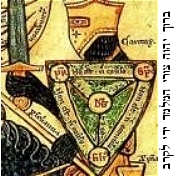
06.11.24 (Sivan 5, 5784) The goal of the devil, the "prince of the power of the air," has always been to enslave people in dark places of fear, anger, bitterness, and pain. His primary weapon is deception, that is, various lies by which he captivates people and makes them tools for his evil purposes. We are able to resist the power of the lie by submitting to the truth about Reality (James 4:7). God's Name YHVH (יהוה) means "Presence" and "Love," and there is no power in heaven or earth that can overrule His hand. Therefore even if the prophesied "End of Days" were to begin this very hour, our responsibility is to focus on the Divine Presence and to walk in His truth and love. As King David said, "I have set the LORD always before me; because He is at my right hand, I shall not be shaken" (Psalm 16:8).
שׁויתי יהוה לנגדי תמיד
כי מימיני בל־אמוט
shee·vee'·tee · Adonai · le·neg·dee · tah·meed
kee · mee·mee·nee · bahl - e·mot

"I have set the LORD always before me;
because he is at my right hand, I shall not be shaken"
(Psalm 16:8)

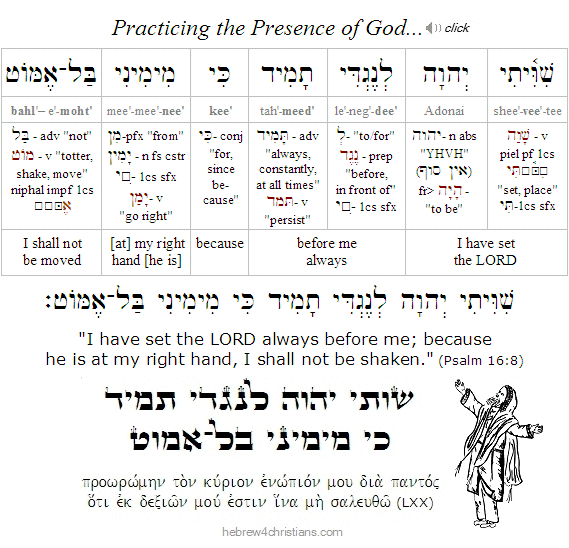 |
Encourage yourself by remembering that there is a future of healing and deliverance coming to us, though we must abide in the shadow of its substance for a bit longer: "For behold, the Day is coming (הַיּוֹם בָּא), burning like an oven, when all the arrogant and all evildoers will be stubble. The Day that is coming shall set them ablaze, says the LORD of hosts, so that it will leave them neither root nor branch. But for you who fear my Name, the Sun of Righteousness (שֶׁמֶשׁ צְדָקָה) shall rise with healing in its wings. You shall go out skipping like calves released from the stall. And you shall tread down the wicked, for they will be ashes under the soles of your feet, on the day when I act, says the LORD of hosts" (Mal. 4:1-3).
This awesome passage from the Book of Malachi primarily applies to the Second Coming of Yeshua and the great "Day of the LORD" (יוֹם יהוה). The "Sun of Righteousness," shemesh tzaddik (שֶׁמֶשׁ צְדָקָה), refers to Messiah son of David, the risen life-giving Healer of God. Of Him it is said, "The LORD God is a sun and a shield" (Psalm 84:11) and "the LORD shall be to thee an everlasting Light (אוֹר עוֹלָם), and thy God thy glory; thy sun shall no more go down, for the Lord shall be thine everlasting light" (Isa. 60:19-20). The Divine Light will shine on those who receive God's righteousness, that is, on those who put their trust in the One who said, 'I am the Light of the world' (John 8:12). Amen, the righteous will forever testify: "For with you is the fountain of life; in your light do we see light" (Psalm 36:9).
Hebrew Lesson
Malachi 4:2a reading (click for audio):
This is the promise of his grace: 'I will restore to you the years that the swarming locust has eaten.' God can give back all those years of sorrow, and you will be the better for them. God will grind sunlight out of your black nights. In the oven of affliction, grace will prepare the bread of delight. Someday you will thank God for all your sadness." - Charles Spurgeon
Despite the present hour, it is not all darkness... seek the Light and you will find it (Isa. 50:10).
Heeding the Father's Voice...
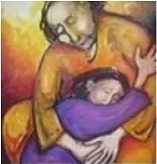
[ The giving of the Torah is connected with the holiday of Shavuot ("Pentecost"). This is derived from the chronology of the Exodus itself: the Passover (on Nisan 15) to the arrival at Mount Sinai (on Sivan 1) took 45 days (Exod. 19:1). Four days later God spoke "I AM" to Israel (Exod. 20:2). ]
06.11.24 (Sivan 5, 5784) Recall that God promised his people that they would experience heart change by the power of His Spirit: "Behold, the days come, says the LORD, that I will make a new covenant (ברית חדשׁה) with the house of Israel, and with the house of Judah, not according to the covenant that I made with their fathers in the day that I took them by the hand to lead them out of the land of Egypt, My covenant which they broke, though I was a husband to them, says the LORD. But this is the covenant that I will make with the house of Israel after those days, says the LORD: I will put My law (i.e., Torah) in their minds, and write it on their hearts; and I will be their God, and they shall be My people" (Jer. 31:31-33). Recall also that it was on the appointed time of Shavuot (i.e., "Pentecost"), 50 days after the resurrection of our Lord, when the disciples of Yeshua received the promise of the Holy Spirit and the Torah of God was written upon their hearts (see Acts 1:7-8; 2:1-4).
Just as the advent of Messiah signified the time of God's redemption of his people, so the advent of the Holy Spirit (רוּחַ הַקּדֶש) signified the time of their regeneration as God's children. Among other things, the role of the Spirit is to convict people of sin, to reveal the truth of salvation in Yeshua, and to empower believers of Yeshua to bear fruit that glorifies God.
Surely our great need is to have heart, to find strength, resolution, and steadfast determination to walk boldly during these heartless and depraved days (2 Tim. 3:1-5). We are not without God's help, of course. Yeshua told us that the Ruach HaKodesh (רוּחַ הַקּדֶשׁ) would be "called alongside" (παράκλητος) to comfort us on the journey. The English verb "comfort" literally means "to give strength" (from com- ["with"] and fortis ["strong"]), an idea similarly expressed by the verb "encourage," that is, to "put heart [i.e., 'core'] within the soul." In Hebrew, the word courage is expressed by the phrase ometz lev (אמֶץ לֵב), meaning "strong of heart," denoting an inner quality of the will rather than of the intellect. Ometz lev means having an inner resolve, a passion, and a direction. The sages say "the mind is the eye, whereas the heart is the feet." May God be our Light and Salvation as we walk through the surrounding darkness... Amen.
Let us hear words from our Father: "Dear child of mine, do not forget my Torah (תורתי), but let your heart keep my commandments (מצותי). Doing so will add to you length of days (ארך ימים), long life, and peace (שׁלום). Do not abandon the heart of Your Father by losing sight of mercy and truth (חסד ואמת); No! Tie them around your neck; inscribe them upon the table of your heart (לוח לבך), that is, make them part of your inner being and will. Doing so will reveal my grace (חן) and good understanding (שכל־טוב) before the eyes of God and others. Trust in your heavenly Father with all your heart (בטח אל־יהוה בכל־לבך) and don't seek to be in control, trying to figure everything out on your own (ואל־בינתך אל־תשען). Listen for your Father's voice in everything you do; in all your ways know His heart (בכל־דרכיך דעהו), and then your ways will be directed in the truth. Don't assume that you know it all; abandon your self-conceit: Revere your heavenly Father (ירא את־יהוה) and flee from what you know is self-destructive and evil! Doing so will impart healing (רפאות) to you: your body will glow with health, your very bones will vibrate with life! Honor your Heavenly Father with everything you own; give him your first and the best of what you have (מראשׁית כל־תבואתך); then your barns will burst with plenty, and your wine vats will be overflowing" (Prov. 3:1-10).
Hebrew Lesson:
Proverbs 3:1 reading (click):
Eschatology and Shavuot...
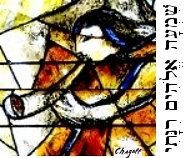
[ The festival of Shavuot (חג השבועות) begins Tuesday, June 11th at sundown.... ]
06.10.24 (Sivan 4, 5784) Some people see the ultimate fulfillment of the holiday of Shavuot (i.e., "Weeks" or "Pentecost") to be found in the mysterious catching away (ἁρπάζω, harpazo) of believers before the time of the "Great Tribulation" and the Great Day of the LORD (1 Thess. 4:17; John 14:3; 1 Cor. 15:51-52). They reason that since Shavuot marked the day of dramatic revelation, with signs of fire and the sounds of a heavenly shofar blast, an appointed time that marks the jubilee fulfillment of Passover, it can therefore be seen as the rapturous end of redemption for those who believe, symbolic of a wedding day, when God betrothed Israel as His own people, separate from all others. Both Jew and Gentile will be "waved" before the LORD (as symbolized by shtei ha-lechem, the two loaves), representing the "one new man" of kallat Mashiach, the "bride of Messiah," or the assembly of those called out from every tribe and tongue to be a part of God's heavenly kingdom.
 |
Though "no one knows the day or hour" of the return of Yeshua our Messiah (see Matt. 24:36; Acts 1:7), there are clues given in Scripture about the conditions of the world before His return, and Yeshua himself gave us parables admonishing us to actively be looking (Matt. 24:2-14; 25:1-13). The Apostle Paul said that followers of the Lord can know the "season" of Messiah's return, and warned that He will come "as a thief in the night" - not in the revelation of great power and glory at the end of the age (1 Thess. 5:2-6). Moreover, Paul forewarned of the rise of worldwide godlessness (2 Tim. 3:1-7) and even of the flagrant apostasy of the "institutionalized" church (1 Tim. 4:1-3), which is of course evident today... Other Scriptures foretell of the coming One World Government, the rise of the Messiah of evil (Antichrist) whose "god" will be the "security state" (Dan. 11:38), the persecution of the national Israel (a nation miraculously restored to the promised land), the rebuilding of the Temple, the coming Great Tribulation, and so on. "When these things begin to take place, straighten up and lift up your heads, because your redemption is drawing near" (Luke 21:28).
Regarding the "world system," however, we have quite a different vision... The LORD God Almighty has vowed to break the pride of the "kings of the earth" with a rod of iron and dash them in pieces like a potter's vessel, and the shattering will be so ruthless that among its fragments not a shard will be found with which to take fire from the hearth, or to dip up water out of the cistern (Psalm 2:9; Isa. 30:14). For from His mouth comes a sharp sword with which to strike down the nations, and He will rule them with a rod of iron. He will tread the winepress of the fury of the wrath of God the Almighty (Rev. 19:15). Nebuchadnezzar's great dream will soon be fulfilled: "As you looked, a Stone was cut out by no human hand, and it struck the image on its feet of iron and clay, breaking them in pieces. Then the iron, the clay, the bronze, the silver, and the gold, all together were broken in pieces, and became like the chaff of the summer threshing floors; and the wind carried them away, so that not a trace of them could be found. But the stone that struck the image became a great mountain and filled the whole earth" (Dan. 2:34-35). "And the God of heaven will set up a kingdom that shall never be destroyed ... and it shall stand forever" (Dan. 2:44). One day the edifice of man's godless pride will come crashing down, and there will be no trace left of its rubble... Amen; even so, come quickly, Lord!
Note: Our tradition does not require us to accept everything at face value, though it does expect us to study, to wrestle, and to seek truth. Each of us must "go to Peniel" to wrestle with the Angel; each of us must be renamed from Ya'akov ("a supplanter") to Israel ("a prince with God"). When the Spirit of Truth asks, "What is your name," may the LORD God grant you the courage to refuse to "let go" until you receive the divine blessing of love and acceptance.
Hebrew Lesson
Psalm 47:5 Hebrew reading:
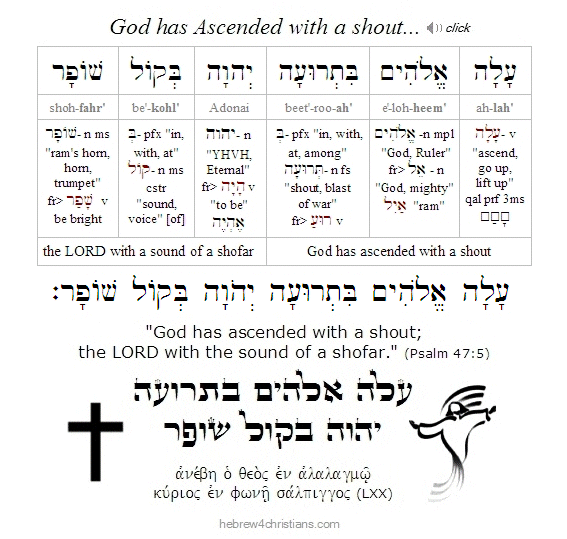 |
The Torah of Shavuot...
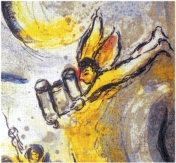
[ The following entry is related to the holiday of Shavuot ("Weeks," "Pentecost") which commemorates the giving of the Torah at Sinai... ]
06.10.24 (Sivan 4, 5784) The importance of the Torah, or "law" of God, cannot be overstated, friends, and the holiday of Shavuot recalls and celebrates its importance in our lives. Yeshua plainly said to his followers: "Do not think that I have come to abolish the Law or the Prophets; I have not come to abolish them but to fulfill them. I tell you the truth, until heaven and earth pass away not the smallest letter or even a stroke of a letter (קוצו שׁל יוד) will pass from the law until everything comes to pass. So anyone who breaks one of the least of these commands and teaches others to do so will be called least in the kingdom of heaven, but whoever obeys them and teaches others to do so will be called great in the kingdom of heaven" (Matt. 5:17-19). He further solemnly warned: "Not everyone who says to me, 'Lord, Lord,' will enter into the kingdom of heaven– only the one who does the will of my Father in heaven. On that day, many will say to me, 'Lord, Lord, didn't we prophesy in your name, and in your name cast out demons and do many powerful deeds?' Then I will declare to them, 'I never knew you. Go away from me, you workers of lawlessness' (Matt. 7:21-23).
To the ungodly, "freedom" means being lawless, that is, acting under their own authority apart from the will of God. This of course was the original temptation in Eden, when the nachash (serpent) told Eve that if she acted under her own authority, her eyes would be "opened" and she would be "like God," knowing both good and evil (Gen. 3:5). That is always the creed of the wicked: "Do as thou wilt..." True freedom, however, is not the supposed right to do whatever you want, but instead is the power to do what is right, living in harmony with moral reality, and being liberated from the slavery of impulses to do evil. The law of God, then, is the blessing of having boundaries, order, and moral sanity within our lives, and that is why the Holy Spirit inscribes the law "within" us - to help guide our steps, protect our way, and to empower us to live in obedience to the truth of God (Jer. 31:33). If you are led by the Spirit, you are no longer enslaved to the law of sin and death -- that is, the lower nature and its idolatrous impulses -- but you will bear the fruit of righteousness, goodness and truth (Gal. 5:18; Eph. 5:9). Let no one deceive you with vain words. You cannot serve two masters... If you know that the Messiah is righteous, you know that every one that does righteousness is born of God (1 John 2:29).
God did not send the Savior to suffer and die on the cross so that people would disregard his moral will and go right on sinning. No, by his sacrifice Yeshua delivers us from the power of sin and death and thereby empowers us to do his will: "For we are his workmanship, created in Messiah for good works that God prepared beforehand" (Eph. 2:10). Followers of Messiah are to be "filled with the knowledge of his will in all spiritual wisdom and understanding, to live our lives in a manner worthy of the Lord, fully pleasing to him, bearing fruit in every good work and increasing in the knowledge of God" (1 Cor. 1:9-10). Therefore the message of Shavuot is that we should walk worthy of God, who has called us unto his kingdom and glory (1 Thess. 2:2). Chag Shavuot Sameach.
Hebrew Lesson
Psalm 119:97 reading with commentary (click):
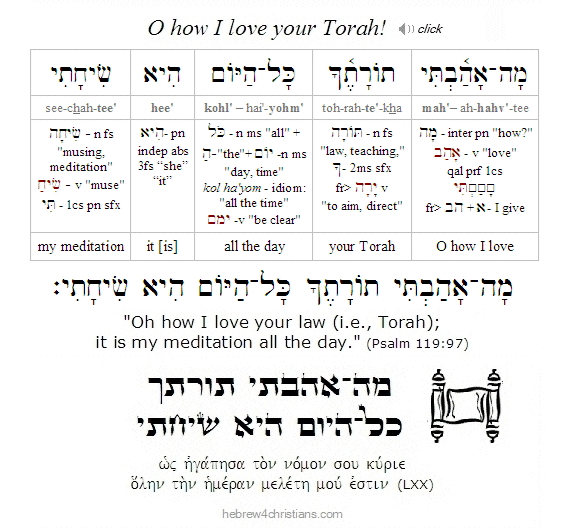 |
June 11th - June 13th is
The Holiday of Shavuot...
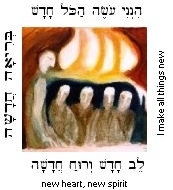
[ Calendar Note: The climactic holiday of Shavuot ("Weeks," or "Pentecost") begins Tuesday, June 11th at sundown and will continue through the next day (i.e., Wednesday, June 12th). In the diaspora, and extra day is added (called Yom Tov Sheni). ]
06.10.24 (Sivan 4, 5784) This Tuesday, June 11th, marks the end of the 49 days of counting the omer and the beginning of the great "Jubilee" of Shavuot (i.e., "Weeks" or "Pentecost"). Note the Torah instructed us (Lev. 23:15-16) to count from the day following Passover (i.e., Nisan 16) for exactly seven weeks, until Sivan 5 (i.e., from April 23rd to June 10th this year). On the 50th day (i.e., Sivan 6), a special celebration was to be observed. This annual "countdown" recalls both the time from the Passover until the revelation at Sinai, and the advent of the Holy Spirit among Yeshua's disciples in Jerusalem (Acts 2:1-4).
 |
According to the sages, the festival of Shavuot marks the culmination of the experience of redemption, sometimes called Atzeret Pesach (עֲצֶרֶת פֶּסַח), or the "conclusion" of Passover. Since the Exodus from Egypt was intended to lead to the revelation given at Sinai, the goal of Passover was the giving of the Torah to the Jewish people.
In other words, the LORD took the Jews out of Egypt so that they would be His own treasured people, holy and separated from the pagan cultures around them, living in the light of great revelation. Indeed, all of the holidays of the biblical calendar are connected with this event, including the fall festivals of Rosh Hashanah, Yom Kippur and Sukkot.
During this time, it is customary for young adults to recommit themselves to Talmud Torah (the study of Torah) and to renew their decision to live as faithful Jews. In addition to formal "confirmation ceremonies" observed at synagogues, some other Shavuot customs include decorating the home and synagogue with greenery, eating dairy foods and sweets (as samples of the "milk and honey" of the promised land), and staying up the entire night of Shavuot to read selections from the Torah and from the Talmud (this custom is called tikkun leil shavu'ot: תִּקּוּן לֵיל שָׁבוּעוֹת, "Rectification for Shavuot Night"). For the Messianic Jew, Shavuot is the time of celebrating the birth of kallat Mashiach - the Bride of the Messiah (or the new covenant assembly), since the Ruach HaKodesh (Holy Spirit) was poured out to the believers in Yeshua during this festival (Acts 2:1-4).
 |
At the synagogue, it is customary to start the Shavuot evening service later than usual, to ensure that the 50th day has arrived (see "counting the omer"). As mentioned above, many people stay at the synagogue throughout the entire night listening to poems and favorite portions of Scripture, or reading from a special book (tikkun leil Shavuot) that includes key verses of each Torah portion, passages of each tractate of the Mishnah and from the Zohar. This custom is observed to "repair" the night of Shavuot from the error of sleeping so soundly before the Torah was revealed at Sinai that God had to awaken the Jews with piercing shofar blasts, thunder, and lightning the following morning.
Jewish tradition teaches be'chol dor vador - that in every generation each person should consider him or herself as having personally received the Torah at Sinai. The climax of the Shavuot morning service is the recitation of the famous Akdamut poem followed by the reading of the Ten Commandments, when all the congregation stands to "relive" the experience at Sinai. A second Torah scroll is then taken out of the ark and the portion is read (Num. 28:26-31) that describes the sacrificial offerings made at the Temple during Shavuot, and the Haftarah (Ezek. 1:1-28; 3:12) concerns the amazing revelation of God in the form of the Throne/Chariot.
The Scroll of Ruth (מגילת רות) - a beautiful story about God's redemptive love - is traditionally read on the second day of Shavuot. As the Goel (kinsman-redeemer), Boaz was a wealthy man of the tribe of Judah (Bethlehem) who married a Gentile bride. Boaz's name means "in Him is strength," a picture of the Yeshua the Messiah, his greater Descendant, who also redeemed for himself a bride from among the nations. Among traditional Jews, the Book of Ruth is is read since the events recounted took place during the time of the spring harvest (linking it to the agricultural aspect of Shavuot), and Ruth is a picture of willing acceptance of a Jewish lifestyle (linking it to the events of Sinai).
The holiday of Shavuot is one of the shelosh regalim (three major "pilgrimage festivals") commanded in the Torah (Exod. 23:14-17; Deut. 16:16) and therefore it reveals profound spiritual truth for followers of Yeshua (Luke 24:44; 2 Tim. 3:16). God did not want us to miss the significance of this holiday, since it expresses the freedom and truth of the New Covenant of Zion. From my heart to you: Shavuot Sameach - "Happy Shavuot!" May this be a time of renewal and great joy in your lives....
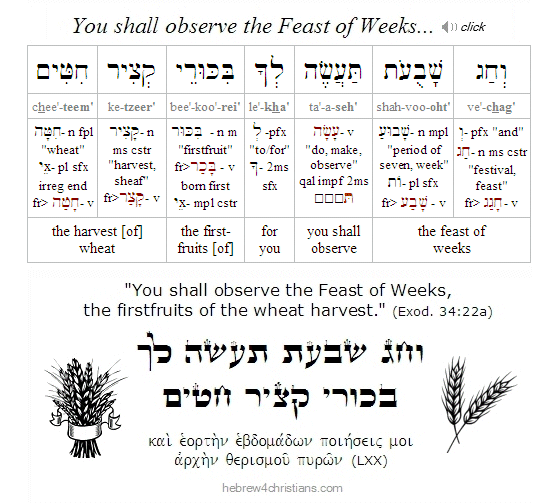 |
This week's Torah:
Parashat Naso (פָּרָשַׁת נָשׂא)
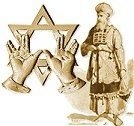
06.09.24 (Sivan 3, 5784) Chag Shavuot Sameach, friends... Among other things, our Torah portion for this week, parashat Naso ("lift up!"), includes the cornerstone blessing that Aaron and his sons (i.e., the priests) were instructed to declare over the people of Israel: "May the LORD bless you and keep you; may the LORD shine his face upon you and be gracious to you; may the LORD lift up his face upon you and give you his peace" (Num. 6:24-26).
Notice that the Hebrew text of the blessing (see below) begins with three words, is comprised of three parts, invokes the divine Name three times, and is therefore appropriately called "the three-in-one blessing" (שלוש בברכה אחת). Notice also that the words are spoken in the grammatical singular rather than plural because they are meant to have personal application, not to be a general benediction over a crowd of people. The phrase, "May the LORD lift up his face upon you..." (ישא יהוה פניו אליך) pictures the beaming face of a parent lifting up his beloved child in joy...
The repetitive construction of God "lifting up His face" (יהוה פניו אליך) indicates that he gazes upon you in love and in blessing. Undoubtedly Yeshua recited this very blessing over his disciples when he ascended back to heaven on Mem B'Omer, though He would have spoken it in the grammatical first person: "I will bless you and keep you (אני אברך אותך ואשמור לך); I will shine upon you and will be full of grace toward you; I will lift up my face toward you and give you my shalom" (see Luke 24:50-51).
יברכך יהוה וישמרך
יאר יהוה פניו אליך ויחנך
ישא יהוה פניו אליך וישם לך שׁלום
ye·vah·re'·khe·kha' · Adonai · ve·yeesh'·me·re'·kha
yah·eir · Adonai · pah·nav · e·ley'·kha · vee·khoon·ne'·kah
yees·sa · Adonai · pah·nav · e·ley'·kha · ve·yah·seim · le·kha · shah·lohm

"May the LORD bless you and keep you;
May the LORD shine his face upon you and be gracious to you;
May the LORD lift up his face upon you and give you his peace."
(Num. 6:24-26)
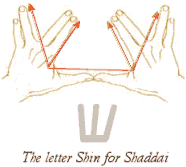
Nesiat Kapayim (Raising of the hands)
Note: The verbs in this blessing are all "jussive," which means they express a wish, desire, or a command, though understood in context (i.e., as part of the blessing recited by the kohanim during ceremonial occasions), the verbs should be regarded as declarative or oracular. To learn more about this blessing, click here.
Parashat Naso Links:
Come just as you are...

[ "Do not try to do anything now; perhaps later you will do much. Do not seek for anything; do not perform anything; do not intend anything. Simply accept the fact that you are accepted. If that happens you experience grace." - Paul Tillich ]
06.07.24 (Iyyar 30, 5784) Some people seem to think that we first must repent and then we will encounter the Lord, but it's actually the other way around: we first encounter the Savior and then we learn the meaning of repentance. Thus Paul's eyes were opened after he was first blinded by the light (Acts 9:3-6). Likewise, it is only after we have met the Lord that we begin to understand our own blindness of heart, but as learn to see more clearly, we encounter more and more of his love (Rom. 5:20). As Yeshua said, "My yoke is pleasant (χρηστὸς) and my burden is light (Matt. 11:30). Teshuvah, then, is a progressive and ongoing process of awakening, as we learn to love God and to accept ourselves, despite our struggle with sin. As St. Anselm once prayed: "O Lord, grant us grace to desire thee with all our hearts, that so desiring, we may seek and find thee, and so finding thee, may love thee, and loving thee may hate those things from which you have redeemed us." Amen.
We encounter the Lord "just as we are," by means of his gracious intervention in our lives, and so we continue to live by faith in God's grace (indeed, what we call "sanctification" is often just "catching up" with the miracle of his revelation to us). And we always come to God "just as we are," since we are never more than what we are in the truth: χάριτι δὲ θεοῦ εἰμι ὅ εἰμι- "by the grace of God I am what I am," as Paul said. "For all things come from You, and from your hand we give back to you" (1 Chron. 29:14). Therefore the Spirit says, "Come unto me just as you are, or you may never come at all...."
Hebrew Lesson
1 Chron. 29:14b Hebrew reading (click):
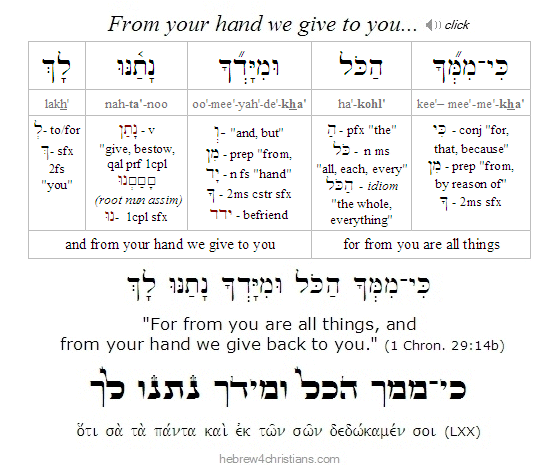 |
A prayer to the One calling you to come: "I come to you just as I am - needy, sick within, weary, and broken... I come seeking your love; I come because you invited me to come: I open my heart, such as it is, to you; please join me here, in this place of my need, in this place of pain, and wrap me your comfort. I can only love you as I know your love, Lord Yeshua, so please help me to know your love in the truth. Amen."
The Fruit of Spirit...
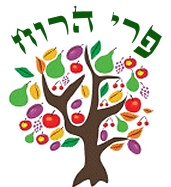
[ The holiday of Shavuot ("Pentecost") begins Tues. June 11th, at sundown... ]
06.06.24 (Iyyar 29, 5784) Traditional Jewish chinuch (education) identifies various middot ha-lev (qualities of heart) that attend to a genuinely Jewish life. These include Talmud Torah (studying Scripture), ahavat Adonai (loving God), gemilut chasidim (doing works of compassion), bikkur cholim (visiting the sick), and so on. The follower of Yeshua likewise is intended to evidence middot hav-lev, though the Source for such comes directly from the power of the Ruach Ha-Kodesh (Holy Spirit) working within the heart of faith. The peirot (fruits) listed in Galatians 5:22-23 represent nine visible attributes of a true follower of Yeshua, namely: love (אהבה), joy (שׂמחה), peace (שׁלום), patience (סבלנות), generosity (נדיבות לב), kindness (חסד), loyalty (נֶאֱמָנוּת), humility (ענוה), and self-control (שְׁלִיטָה עַצְמִית).
Note that these fruits are decidedly not realized through self-effort or attempts at human "reformation," but rather are a supernatural outgrowth of the grace of God in the life of one who puts their trust in Yeshua as Savior. They are fruits "of the Spirit" (פּרי הרוח), not the result of human effort (see John 15:1-8, Mark 4:26-29). Our lives are sanctified in the manner in which they were initially justified: entirely by faith in the love and grace and power of God.
The question we must searchingly ask ourselves is whether our lives give evidence to the power and agency of the Holy Spirit within us. Strictly speaking, these nine attributes are qualities that only the LORD God Himself possesses, since He alone is perfectly loving, perfectly joyful, and so on. But since we are created be'tzelem Elohim (in the image of God) and were given the Holy Spirit to help us walk as did our Teacher (Luke 6:40), spiritual fruit should be evident in our own lives (John 14:12; 15:1-8; 26-7). But again, obtaining such fruit is invariably a matter of faith – trusting that God will help us live our lives in truthful union with Him. This is the "work of God" (John 6:28-29).
Let's remember to pray for one another and ask the LORD to make each of us fruitful le'shem shamayim - for the sake of the Name of our beloved One Yeshua.... Amen.
Hebrew Lesson
Proverbs 8:19 reading (click):
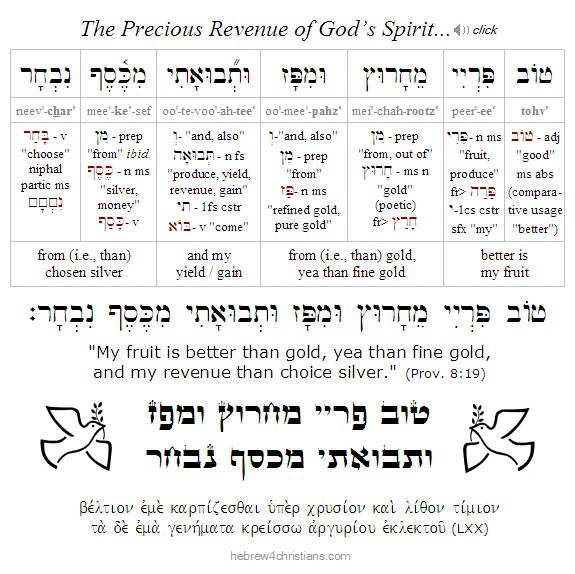 |
City of the Great King...
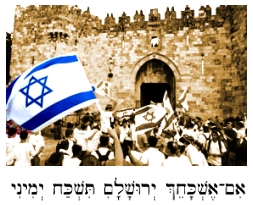
[ "Jerusalem is a port city on the shore of eternity." -Yehuda Amichai (1924-200), Israeli poet ]
06.06.24 (Iyyar 29, 5784) Dear followers of Yeshua the King, how can we forget Zion, "the city of the living God, the heavenly Jerusalem" (Heb. 12:22)? Is she not called "our mother" (Gal. 4:26)? Are we not her citizens, indeed, her exiles in this age? Indeed, Yeshua himself referred to Jerusalem the "City of the great King" (Psalm 48:2; Matt 5:35); for it is the place (המקום) where He was crucified, buried, resurrected, and ascended to heaven; and is it moreover the place where He will return to earth (Zech. 14:1-9; Acts 1:9-12).
"If I forget you, O Jerusalem, let my right hand forget its skill! Let my tongue stick to the roof of my mouth, if I do not remember you, if I do not set Jerusalem above my highest joy!" (Psalm 137:5-6). We are instructed to "pray for the peace of Jerusalem" (Psalm 126:6), but we are further told to "badger" the LORD until he makes Zion "the praise of the earth" (Isa. 62:7).
Hebrew Lesson:
Psalm 137:5 Hebrew reading:
Peace for Jerusalem...
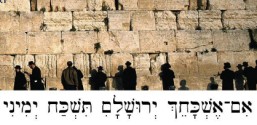
[ "If you want one simple word to symbolize all of Jewish history, that word would be 'Jerusalem.'" - Teddy Kollek (the mayor of Jerusalem from 1965 to 1993) ]
06.05.24 (Iyyar 28, 5784) Shalom chaverim! Today marks "Jerusalem Unification Day" (i.e., Yom Yerushalayim: יום ירושלים), a modern holiday that commemorates the re-unification of old city of Jerusalem on June 7th, 1967 (Iyar 28, 5727), after the stunning victory of Israel during the infamous "Six Day War" (מִלְחֶמֶת שֵׁשֶׁת הַיָּמִים). In 1968 the Chief Rabbinate of Israel declared Iyyar 28 to be a minor holiday to thank God for answering the 2,000-year-old prayer of "Next Year in Jerusalem" (בשנה הבאה בירושלים). Later, on March 23, 1998, the Israeli Knesset passed the Jerusalem Day Law, making it an annual national holiday.
Jerusalem is central to the Jewish heart. Indeed, the Hebrew word "Zion" (ציון) is mentioned over 160 times in the Scriptures. That's more than the words faith, hope, love, and countless other key words... And since Zion is a poetic form of the word Jerusalem (ירושלים), the number of occurrences swells to nearly 1,000! Since it's the most frequently occurring place name in all the Scriptures, it's no overstatement to say that God Himself is a Zionist.... "Out of Zion, the perfection of beauty, God shines forth" (Psalm 50:2). "The LORD loves the gates of Zion more than all the dwellings of Jacob. Glorious things are said of you, O City of God" (Psalm 87:2-3). Indeed, Yeshua our Savior called Jerusalem the "City of the great King" (Psalm 48:2; Matt 5:35): It is the place (המקום) where He was crucified, buried, resurrected, and ascended to heaven; and is it furthermore the place where He will return to earth (Zech. 14:1-9).
In Psalm 122:6 it is written, "Pray for the peace of Jerusalem," a phrase that reveals prophetic truth about our Savior and Messiah. The word sha'alu (שאלו) means "you ask" (as in ask a sheilah, a question), shalom (שׁלוֹם) is the name of Yeshua, the Prince of Peace (i.e., Sar Shalom: שר־שלום), and Jerusalem means "the teaching of peace" (Jeru- comes from the same root as the word Torah [ירה], which means "teaching"). The phrase sha'alu shelom Yerushalayim can therefore be construed, "ask about the Prince of Peace and His Teaching." Amen. Yeshua the Messiah is indeed the rightful King of Jerusalem (Matt. 5:35) who is coming soon to establish Zion and to reign over all the earth.
שַׁאֲלוּ שְׁלוֹם יְרוּשָׁלָםִ
יִשְׁלָיוּ אהֲבָיִךְ
sha·a·loo · she·lohm · ye·roo·shah·lah'·yeem
yeesh·lah'·yoo · oh·ha·vah'·yeekh

"Pray for the peace of Jerusalem;
May those who love her be at peace" (Psalm 122:6).
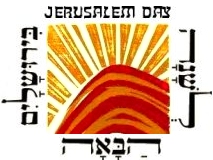
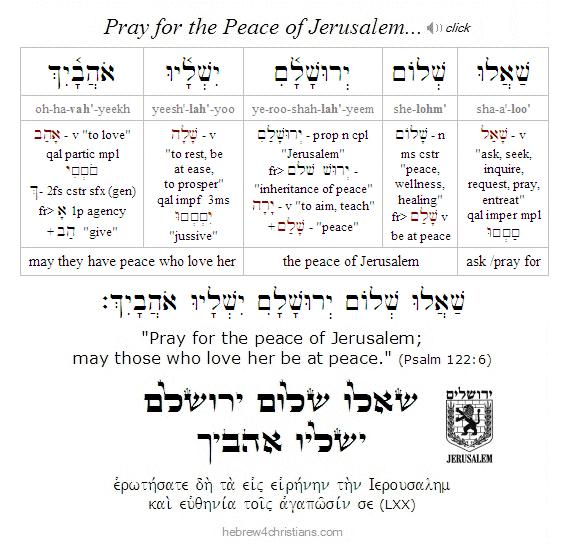
Blessings of the Desert...

06.04.24 (Iyyar 27, 5784) Our Torah portion this week (i.e., parashat Bamidbar) begins: "The LORD spoke to Moses in the desert of Sinai, in the tent of meeting (ohel mo'ed), on the first day of the second month, in the second year after they had come out of the land of Egypt" (Num. 1:1). Note again that the LORD spoke "in the desert" (ba-midbar) of Sinai, and that the Hebrew word for "desert" (i.e., midbar: מדבר) shares the same root as "word" (i.e., davar: דבר), which suggests that we hear the Word of God in a place of emptiness, brokenness and ongoing need.
But note further that the LORD spoke in the "tent of meeting" (אהל מועד), which may be read as the tent of "mo'ed" (מוֹעֵד), or "holiday." This suggests that we celebrate our need for God's healing and turn to him in a state of gratitude, even despite our sinful condition (Psalm 119:71). We take courage and draw near, renewed in trust. That is also why the verse says it was "the first day of the second month" (חדש השני בשנה) -- the Hebrew word "month" (chodesh) can be read as "new" (chadash), suggesting it was a time of renewal, a time to celebrate a new beginning (Acts 2:1-4).
When David prayed in his need: "Create in me a clean heart, O God, and renew a right spirit within me" (Psalm 51:10), the Hebrew may be read: "Create in me a pure heart, O God, and renew within me ruach nachon (רוח נכון) - a spirit of "Yes" (כן). As Paul said of Messiah our Healer: "All the promises of God find their 'Yes' in him" (2 Cor. 1:20).
Hebrew Lesson
Psalm 51:10 Hebrew reading:
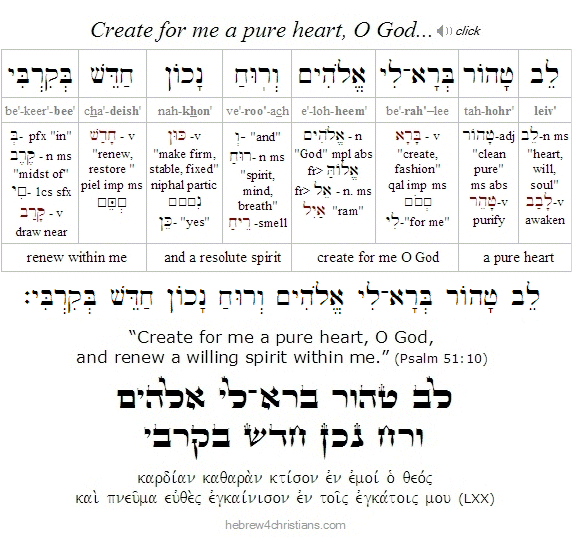 |
The Shepherd's Word...
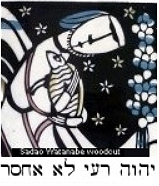
06.04.24 (Iyyar 27, 5784) The sages named the fourth book of the Torah "Bamidbar," meaning "in the desert," because the word occurs in its opening verse, and also because it aptly describes the Israelites' forty years of wanderings in the desert of Sinai after the great Exodus. Because God commanded a census of people to be taken several times in the book, however, the midrash calls it "Sefer Ha'pikudim" (ספר הפקדים), or the "Book of Countings," from which the English translation "the Book of Numbers" is derived. Interestingly, the Hebrew word for desert (i.e., midbar: מִדְבַּר), originally meant "from where the cattle are driven," that is, an area of pasturage that was uninhabited and fit for animal grazing. The Hebrew root "davar" (דבר) means "word" but also means "shepherd," evoking the call and direction of one who would guide his flock.
The book begins: "The Lord spoke (דבר) to Moses in the desert of Sinai, in the Tent of Meeting" (Num. 1:1). Now recall that during their wandering in the desert God's presence was symbolized by the Mishkan, or "Tabernacle," a central tent-like structure that had a secret inner chamber called the Holy of Holies, and within that hidden chamber was a sacred chest called the Ark of the Covenant (ארון הברית) that held the tablets of the Ten Commandments (עשרת הדברים). Upon the cover of the Ark, called the kapporet, were two cherubim (angelic figures), and it was there that God's audible word was spoken (see Exod. 25:22).
In light of this, among other things we can understand the book of Bamidbar to recount God's shepherding words given to the people as they wandered through desert places in search of the fulfillment of God's promise for their lives. The excursion into the desert is part of the journey of faith. God leads us by way of the desert - through struggle and waste places - to discipline our hearts to look for the greater hope of Zion.
Hebrew Lesson
Psalm 23:1-3a reading (click):
Accounted by God...
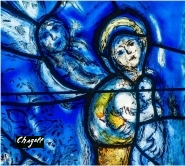
06.03.24 (Iyyar 26, 5784) Our Torah reading this week, parashat Bamidbar (פרשת במדבר), is always read just before the holiday of Shavuot (i.e., "Pentecost"), which is the time we celebrate "mattan Torah" (מתן תורה) -- the giving of the Torah of the LORD (first at Mount Sinai, and then later at Mount Zion). The reading begins: "The LORD spoke to Moses in the desert of Sinai... saying 'Lift up the head' (i.e., count) of the children of Israel (Num. 1:1-2).
Central to Sefer Bamidbar, or the Book of Numbers, is the counting of the person, identifying his "place" within the chosen vessel of Israel (Num. 1:52), and therefore the traditional sages link the idea of being counted by God with the giving of the revelation itself. In other words, as we come to know who we are as God's redeemed people, as we learn to reckon ourselves as his beloved, so we will receive Torah and be accounted among his people. Our heads will then be "lifted up," and we will receive the very first blessing of the Torah, namely: אנכי יהוה אלהיך - "I AM the LORD your (singular) God" (Exod. 20:2).
"The LORD spoke to Moses in the desert of Sinai... saying 'Lift up the head' (i.e., count) of the children of Israel (Num. 1:1-2). The Torah commentator Rashi insightfully noted that as we are counted, so we are lifted up and beheld by God. In other words your life matters to heaven, and you are counted worthy because of God's great redeeming love. The sages say that each of us is as a letter of Torah; each of us counts in God's book. Indeed our beloved Savior Yeshua said, "Even the hairs on your head are numbered" (Matt. 10:30).
May you lift up your head and be counted as one of God's own, friend....
Hebrew Lesson
Exodus 20:2 Hebrew reading:
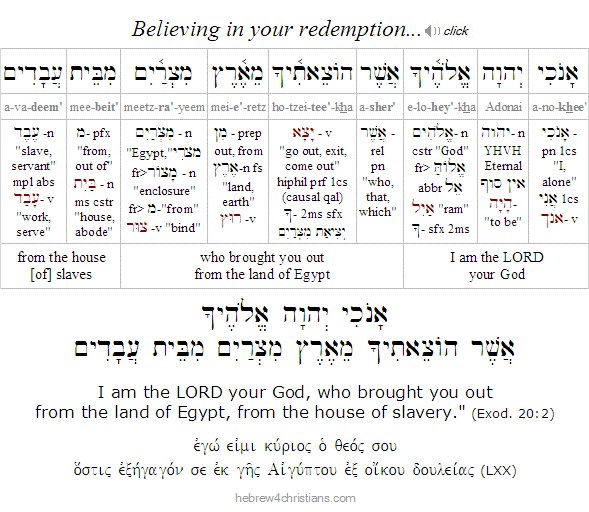 |
Hope despite ourselves...

06.03.24 (Iyyar 26, 5784) Life isn't easy, and even believers can get angry at God at times. For example, we may feel disappointed or resentful when bad things happen to us or to those whom we love, especially if we had prayed for God's intervention and help regarding the matter. Seemingly unanswered prayer can make us feel lonely and afraid about what is happening to us. We may begin to second-guess our faith or wonder if God really listens to us. We must be careful and ask God for solace and wisdom lest we turn numb inside..
Many of us are unhappy and feel empty throughout the passing of our days. Many waver in their faith, on the one hand affirming that they believe that God is faithful and good, while on the other hand wondering why God apparently left then when they needed him most. They reason that if God was not there for them in their most vulnerable moments, can he be trusted to be there for them in future times of trouble?
Some of us can talk a good talk about God and spirituality, but we fail to seriously practice the presence of God, we "forget" that the Lord is real, a "very present help in trouble," and therefore we "collapse back" into the murmur of godless thinking... Ironically enough, many of us are proud and yet hypocritical people. We tend to avoid certain obvious sins but secretly harbor hidden ones like envy, spite, fear, anger, selfishness, lust, gluttony, greed, and a general lack of charity. In short, we don't live up to our ideals or principles, and in our "fallenness" we discover -- if we are honest -- our great need for deliverance from ourselves. It is then that we discover that God has not abandoned us, but on the contrary, we have abandoned Him by turning to anger, hopelessness, despair, and bitterness. Honesty, however, is essential to healing, as Kierkegaard once said: "No person is saved except by grace; but there is one sin that makes grace impossible, and that is dishonesty; and there is one thing God must forever and unconditionally require, and that is honesty."
We must give our secret pain to God, even if we don't understand it, and even if it refuses to go away... Our hearts are often vexed; we are a mess of mixed motives; we are strong to be made weak, weak to be made strong. We bless and curse from the same mouth... And yet, despite all this, despite our inner contradictions, the dance between the "old man" and "new," the divided house of our lives - our present sorrows, our troubles, our fears – we must endure ourselves, we must press on, and we must never let go of hope in God's love. Never. Therefore we must not hide from God's presence, nor pretend to be something we are not. We are invited to come boldly before the throne of God's loving grace to receive help in our hour of need (Heb. 4:16).
"O Lord who alone makes us whole, 'heal me, O LORD, and I shall be healed, save me, and I shall be saved, for your are my praise' (Jer. 17:14). O LORD, forgive our sins and heal us of our wounds, or, at least help us to endure suffering with special grace to keep us from being distracted from the truth and glory of your love and Presence... Grant us strength to abide in your hope, until the very last day, and to keep watch for the ready hand of Your love... As we go from place to place, from this moment to the next, help us to behold the Sun of Righteousness that pervades our way. Amen.
Hebrew Lesson
Jeremiah 17:14 reading (click for audio):
Our heavenly Father "sees in secret," and that also means that he can and will save you from whatever is hidden within you that still resists his love and touch... We have to trust in God's power to heal us, even when it seems that healing is not forthcoming, even when we still find ourselves divided, troubled, and anxious. We have to believe that God's help is always present for us (Psalm 46:1).
God sees what He does within us, His secret "it-is-finished" work, the effect of His great salvation within our hearts, even if at this present hour this may be hidden from our eyes... There is appearance, and there is reality; and only God sees what is ultimately real. We have to trust in His promise to be transformed into the divine nature, even if today we find ourselves sinful, needy, and in disrepair... כּל־יְמֵי צְבָאִי אֲיַחֵל עַד־בּוֹא חֲלִיפָתִי - "All the days of my struggle I will keep hope until my change comes" (Job 14:14). So don't give up, friends. We are saved by hope (ἐλπίδι ἐσώθημεν, Rom. 8:24), a hope for you today. Believe to see!
Hebrew Lesson
Job 14:14 reading (click for audio):
Curses turned to Blessings...
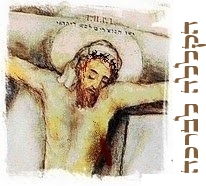
06.03.24 (Iyyar 26, 5784) God can (and does) turn curses into blessings (see Neh. 13:2). There are many instances given in Scripture. For example, Joseph was blessed despite the ill-will of his brothers: "You devised evil against me, but God devised it for good" (Gen. 50:20). Note that the same verb for "devised" (i.e., chashav: חשׁב) is used to describe both the evil intent of the brothers and the good intent of the Lord (Jer. 29:11). This teaches us that God overrules the malice of men to effect his own good purposes, and therefore we can rightfully affirm gam zu l'tovah (גם זו לטובה), "this too is for good" (Rom. 8:28). Underlying the surface appearance of life (chayei sha'ah) is a deeper reality (chayei olam) that is ultimately real, abiding, and designed for God's redemptive love to be fully expressed.
Resist the temptation, therefore, to judge by mere appearances. Forbid your troubles (or the troubles of this world) to darken the eye of your faith. Do not unjustly judge God's purposes or try to understand His ways (Psalm 145:3; Isa. 40:13; Isa. 40:28). As the story of Balaam shows, God makes even the wrath of man praise Him (see Psalm 76:10). "Then God opened Balaam's eyes, and he saw the Angel of the LORD (מלאך יהוה) standing in the way, with his drawn sword in his hand. And he bowed down..." (Num. 22:31). Indeed, the cross of Yeshua is the ultimate expression of how God undoes the evil within the heart of man (Col. 1:20-21). Every knee will bow to the LORD our God and Savior (Isa. 45:22-23; Phil. 2:10-11).
We find comfort that the schemes of the wicked are ultimately subject to the sovereign purposes of the LORD our God. "Ein od milvado" (אין עוד מלבדו) - there is no power that can be exercised apart from God's consent and overarching will... Indeed all authority on heaven and earth belongs to Yeshua, the "the Ruler of the Kings of the earth" (עֶלְיוֹן לְמַלְכֵי־אָרֶץ). As it is written, "All the nations you have made shall come and worship before you, O Lord, and shall glorify your name" (Psalm 86:9). Amen. Beauty for ashes; hashevenu, Adonai...
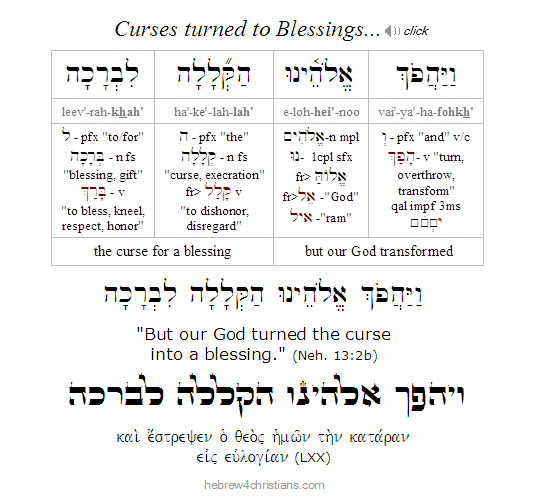 |
Parashat Bamidbar...
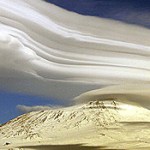
06.03.24 (Iyyar 26, 5784) Our Torah portion for this week, parashat Bamidbar, is the first reading from the Book of Numbers, and is always read before the great holiday of Shavuot (i.e., "Pentecost"). The portion begins exactly where the Book of Exodus left off, that is, with the glory of the LORD (כְּבוֹד יְהוָה) hovering over the Mishkan (Tabernacle) as the Israelites were camped before Mount Sinai (see Exod. 40:38, Num. 1:1). On the first day of the thirteenth month following the great Exodus from Egypt – exactly thirty days after the Mishkan (Tabernacle) was first consecrated – God commanded Moses to take a census of all Israelite males over 20 years of age who would bear arms. Moses and the heads of each tribe recorded the results, with 603,550 men in all. This number did not include the Levites, however, since they were designated to take care of the Tabernacle during the journeys.
The LORD then gave instructions about how the Israelite camp was to be arranged. The Tabernacle would occupy the central location, with three clans of the Levites surrounding it on the north, south, and west (Moses and Aaron's tents were placed before the entrance on the east). The twelve other tribes were divided into four groups of three. All of the tents of the Israelites were to face the Tabernacle on every side. This camp formation was to be strictly maintained while traveling throughout the desert.
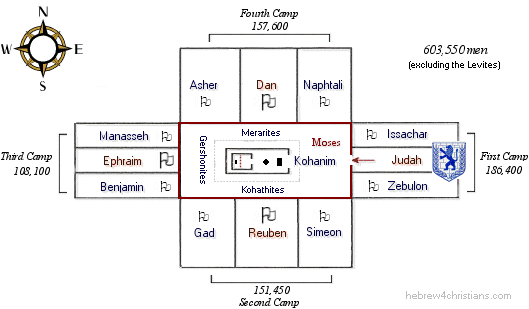 |
Each tribe had its own prince (i.e., nassi: נשׂיא), its own flag (i.e., degel: דגל) whose color corresponded with the color of its respective stone in Aaron's breastplate (Exod. 28:15-21). For example, Judah's stone was a sky-blue carbuncle and therefore the color of his flag was like the color of the sky with a "fiery lion" embroidered upon it (see Gen. 49:9).
The portion ends with a census of the three sons of Levi (בני לוי), namely Gershon (גרשׁון), Kohath (קהת), and Merari (מררי). The sons of Gershon (i.e., the Gershonites) were to maintain the inner tent of the Mishkan and were to be located on the west side of the courtyard; the sons of Kohath (i.e., the Kohathites) were to maintain the furnishings of the Mishkan such (as the Ark of the Covenant, the Menorah, etc.) and were to be located on the south side of the courtyard; and the sons of Merari (i.e., the Merarites) maintained the frames and pillars of the Mishkan and were located to the north of the courtyard. Finally, though the sons of Aaron were technically descendants of Kohath, they were set apart to serve as priests (i.e., kohanim: כהנים) and were located before gate into the Mishkan to the east.
Getting Ready for Shavuot...
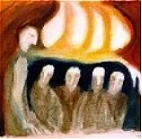
06.02.24 (Iyyar 25, 5784) Shalom chaverim! We have a busy couple of weeks ahead of us. First, we will start reading the fourth book of the Torah, namely Sefer Bamidbar (ספר במדבר), or the "Book of Numbers." Second, we honor Yom Yerushalayim ("Jerusalem Day)" that commemorates the prophetic reunification of Jerusalem and the establishment of Israeli control over the Old City in June 7, 1967 (i.e., Iyyar 28, falling on June 5th this year). Finally, the month of Sivan begins Thurs., June 6th at sundown, which heralds the conclusion of the 49 day countdown from the day following Passover (see Lev. 23:15-16). The first five days of the month of Sivan anticipate the day the Torah was given to Israel at Sinai, namely, the sixth of Sivan, which marks exactly seven weeks (i.e., 49 days) after the Exodus from Egypt.
In light of this, I hope to share some things related to both the Torah portion for this week, the significance of Jerusalem to us as followers of Yeshua, as well as the holiday of Shavuot (i.e., "Pentecost"), which occurs in less than two weeks (i.e., Tuesday, June 11th after sundown). May the LORD show us grace as we study his Torah and review its significance as written upon our hearts in the Messiah (Jer. 31:31, Heb. 10:16, Jer. 32:40). Amen.
Upcoming Holiday Dates:
- Yom Yerushalayim - Tues. June 4th at sundown (and the following day)
- Chodesh Sivan - Thurs. June 6th at sundown (and the following day)
- Shabbat Bamidbar - Fri. June 7th at sundown (and the following day)
- Shavuot ("Weeks, Pentecost") - Tues. June 11th at sundown - Thurs. June 13th
Hebrew Lesson:
Psalm 119:15 reading (click):
Parashat Bamidbar...

06.02.24 (Iyyar 25, 5784) Our Torah portion for this week, parashat Bamidbar, is the first reading from the Book of Numbers, and is always read before the great holiday of Shavuot (i.e., "Pentecost"). The portion begins exactly where the Book of Exodus left off, that is, with the glory of the LORD (כְּבוֹד יְהוָה) hovering over the Mishkan (Tabernacle) as the Israelites were camped before Mount Sinai (see Exod. 40:38, Num. 1:1). On the first day of the thirteenth month following the great Exodus from Egypt – exactly thirty days after the Mishkan (Tabernacle) was first consecrated – God commanded Moses to take a census of all Israelite males over 20 years of age who would bear arms. Moses and the heads of each tribe recorded the results, with 603,550 men in all. This number did not include the Levites, however, since they were designated to take care of the Tabernacle during the journeys.
The LORD then gave instructions about how the Israelite camp was to be arranged. The Tabernacle would occupy the central location, with three clans of the Levites surrounding it on the north, south, and west (Moses and Aaron's tents were placed before the entrance on the east). The twelve other tribes were divided into four groups of three. All of the tents of the Israelites were to face the Tabernacle on every side. This camp formation was to be strictly maintained while traveling throughout the desert.
 |
Each tribe had its own prince (i.e., nassi: נשׂיא), its own flag (i.e., degel: דגל) whose color corresponded with the color of its respective stone in Aaron's breastplate (Exod. 28:15-21). For example, Judah's stone was a sky-blue carbuncle and therefore the color of his flag was like the color of the sky with a "fiery lion" embroidered upon it (see Gen. 49:9).
The portion ends with a census of the three sons of Levi (בני לוי), namely Gershon (גרשׁון), Kohath (קהת), and Merari (מררי). The sons of Gershon (i.e., the Gershonites) were to maintain the inner tent of the Mishkan and were to be located on the west side of the courtyard; the sons of Kohath (i.e., the Kohathites) were to maintain the furnishings of the Mishkan such (as the Ark of the Covenant, the Menorah, etc.) and were to be located on the south side of the courtyard; and the sons of Merari (i.e., the Merarites) maintained the frames and pillars of the Mishkan and were located to the north of the courtyard. Finally, though the sons of Aaron were technically descendants of Kohath, they were set apart to serve as priests (i.e., kohanim: כהנים) and were located before gate into the Mishkan to the east.
|












































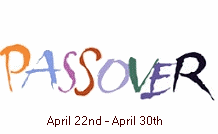

![Spring Holiday Timeline (H4C]](../../../../About_HFC/Site_News/Archive-2024/roshchodeshim-line.gif)
